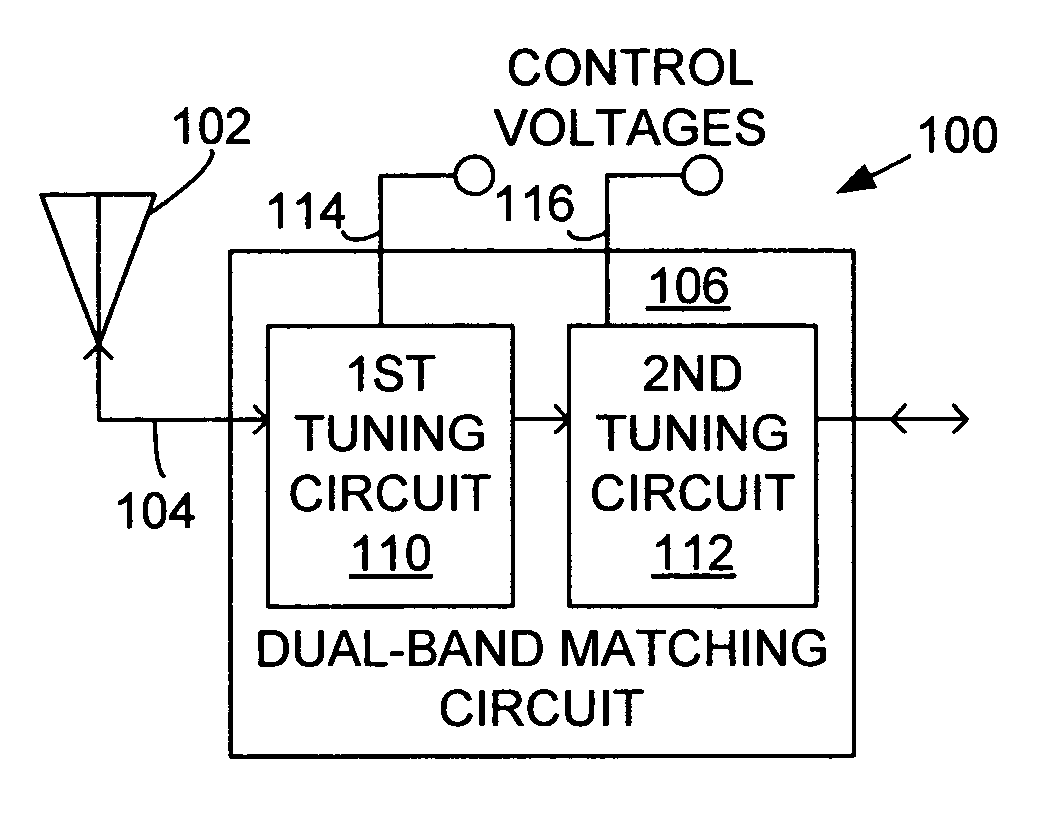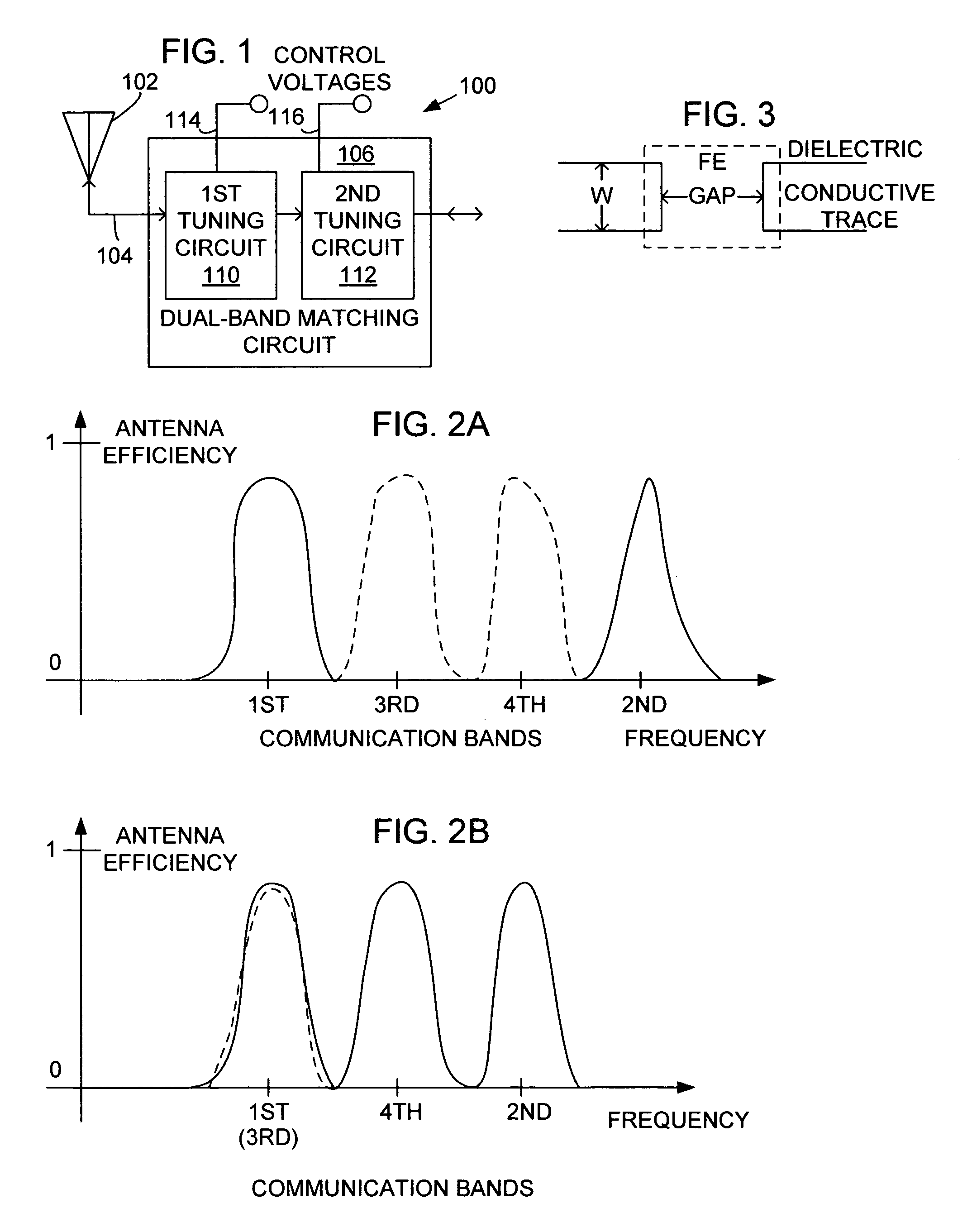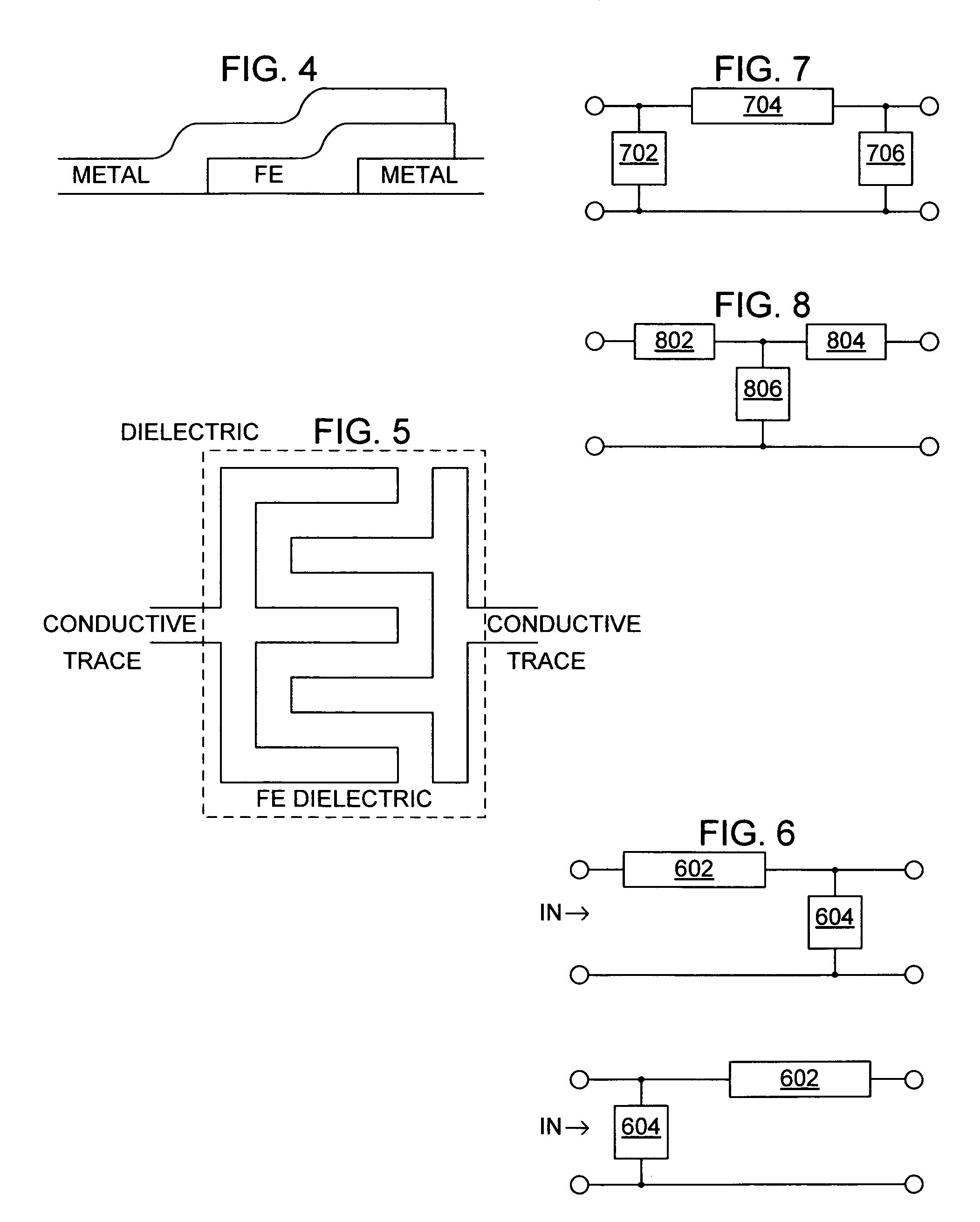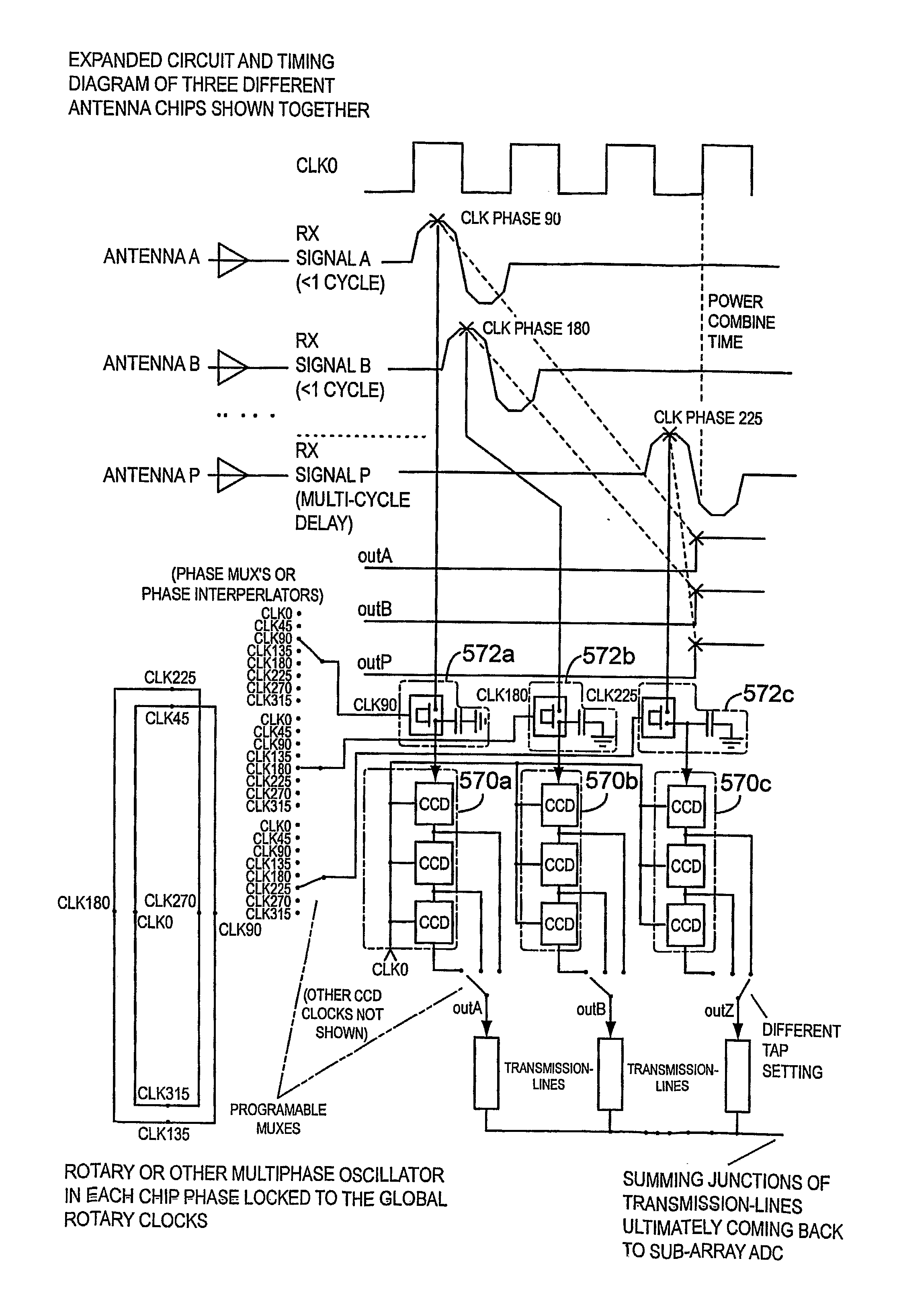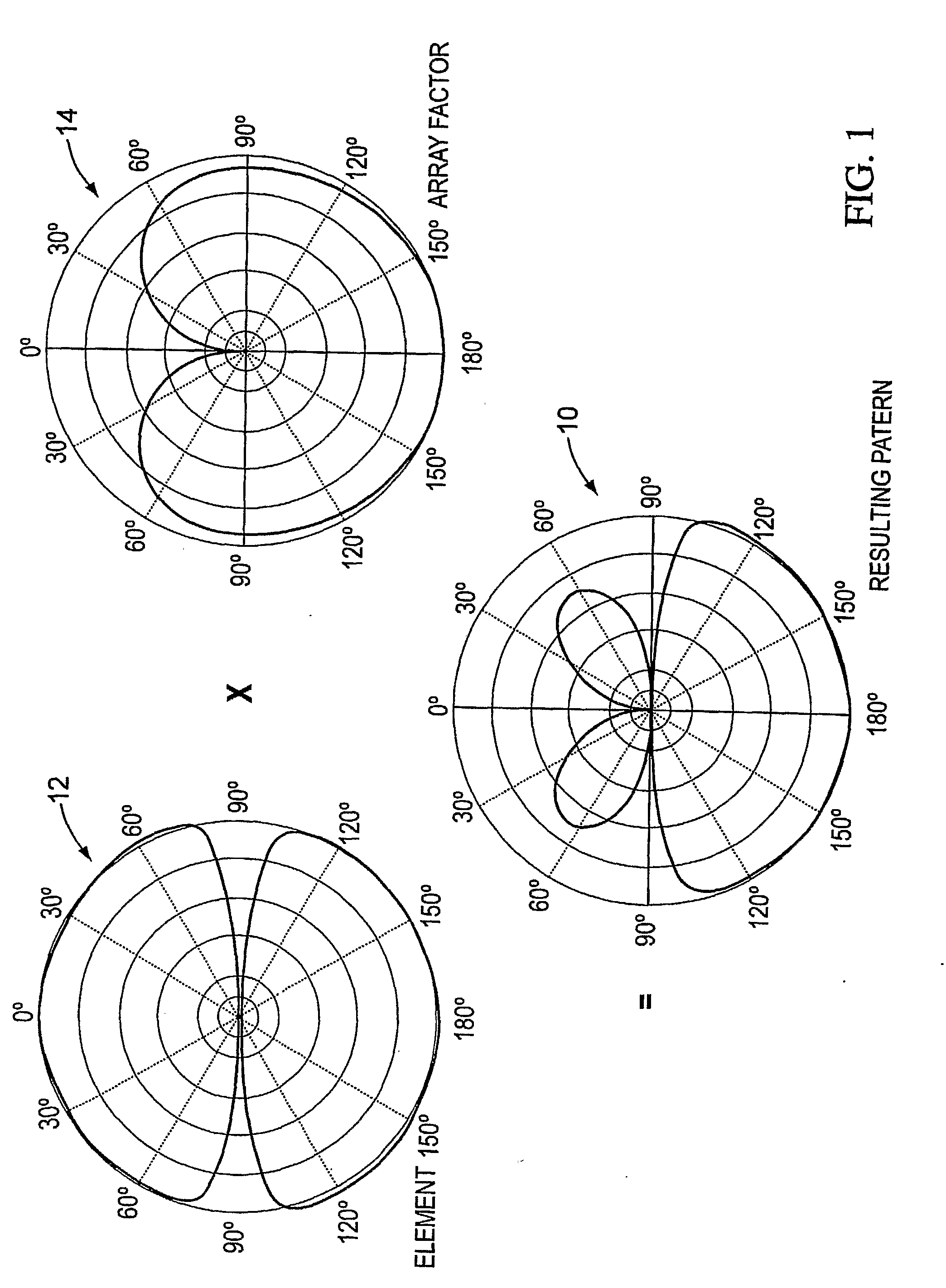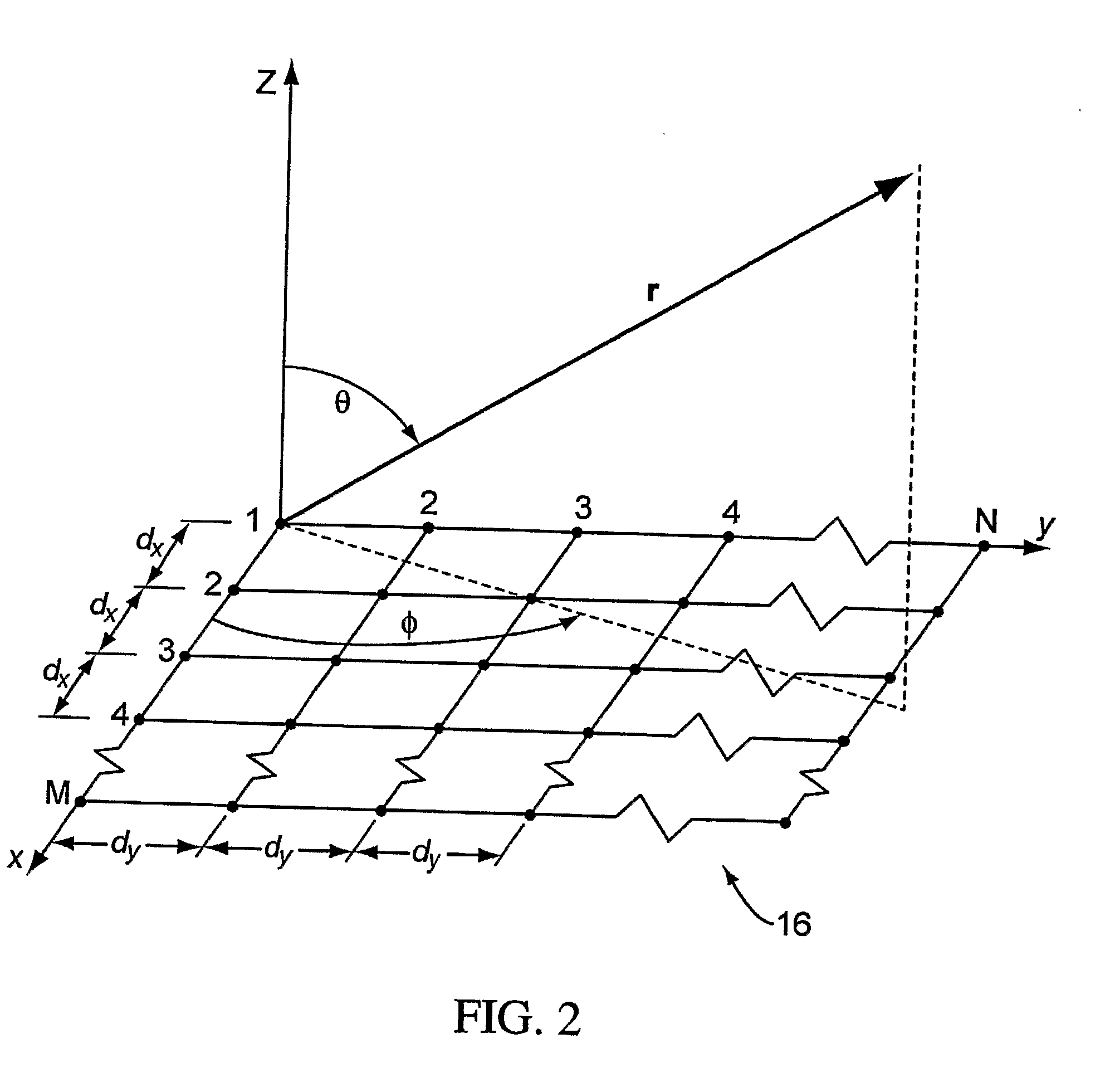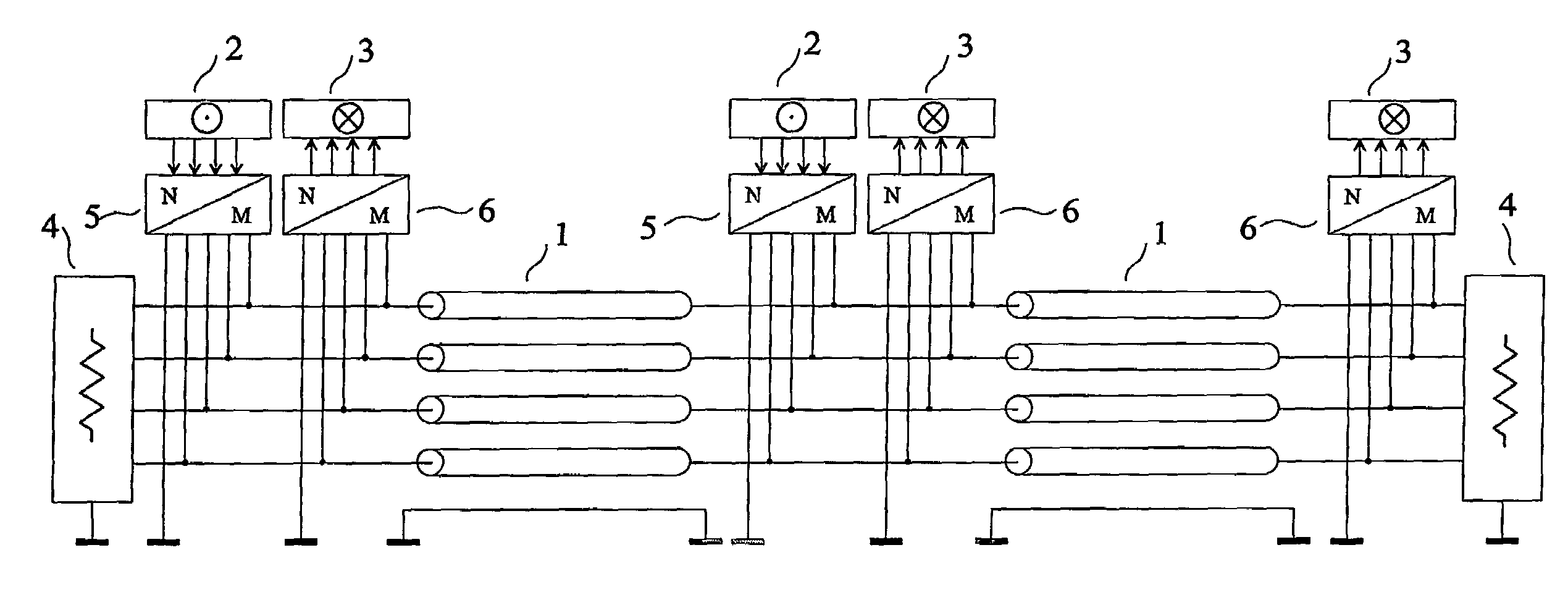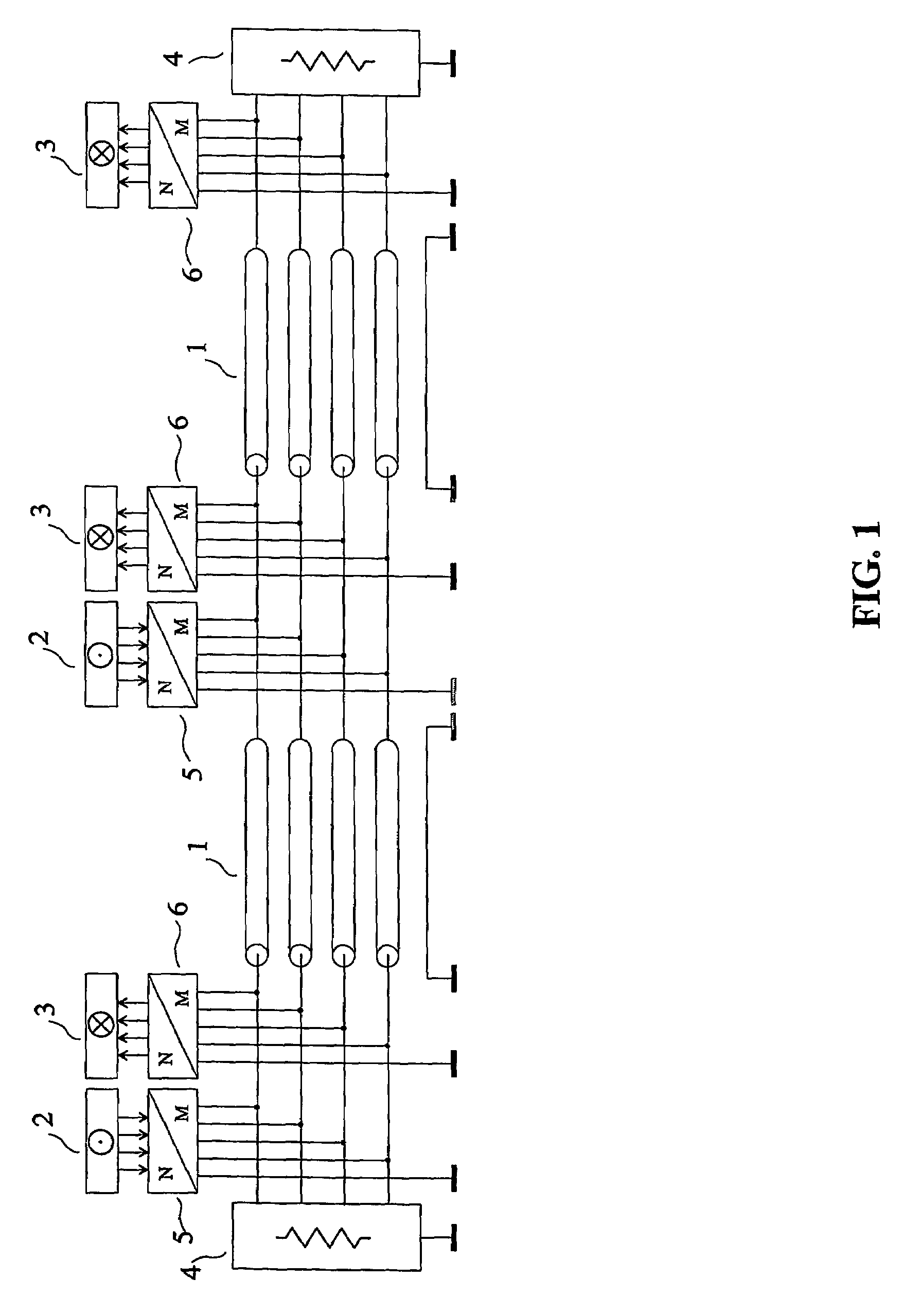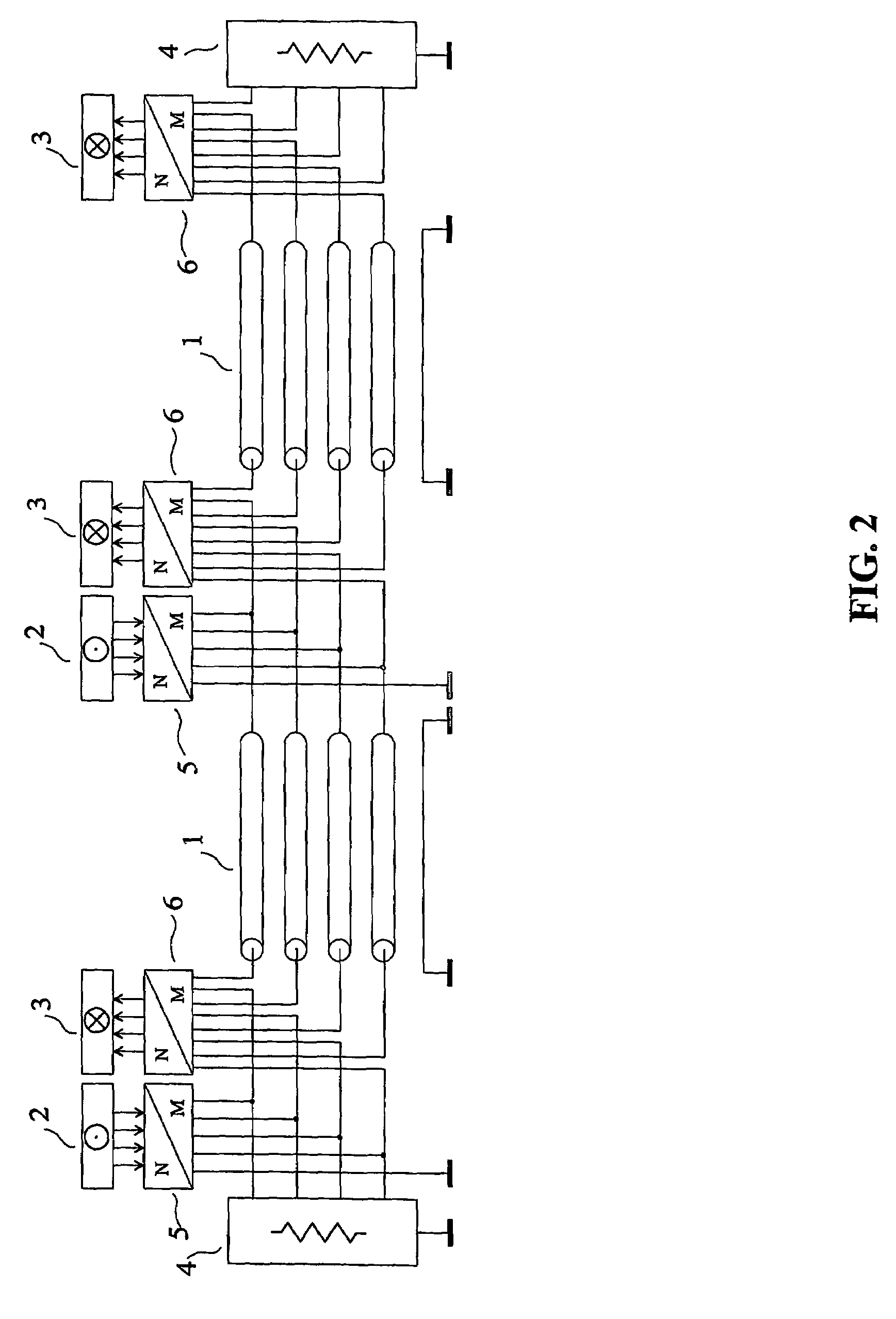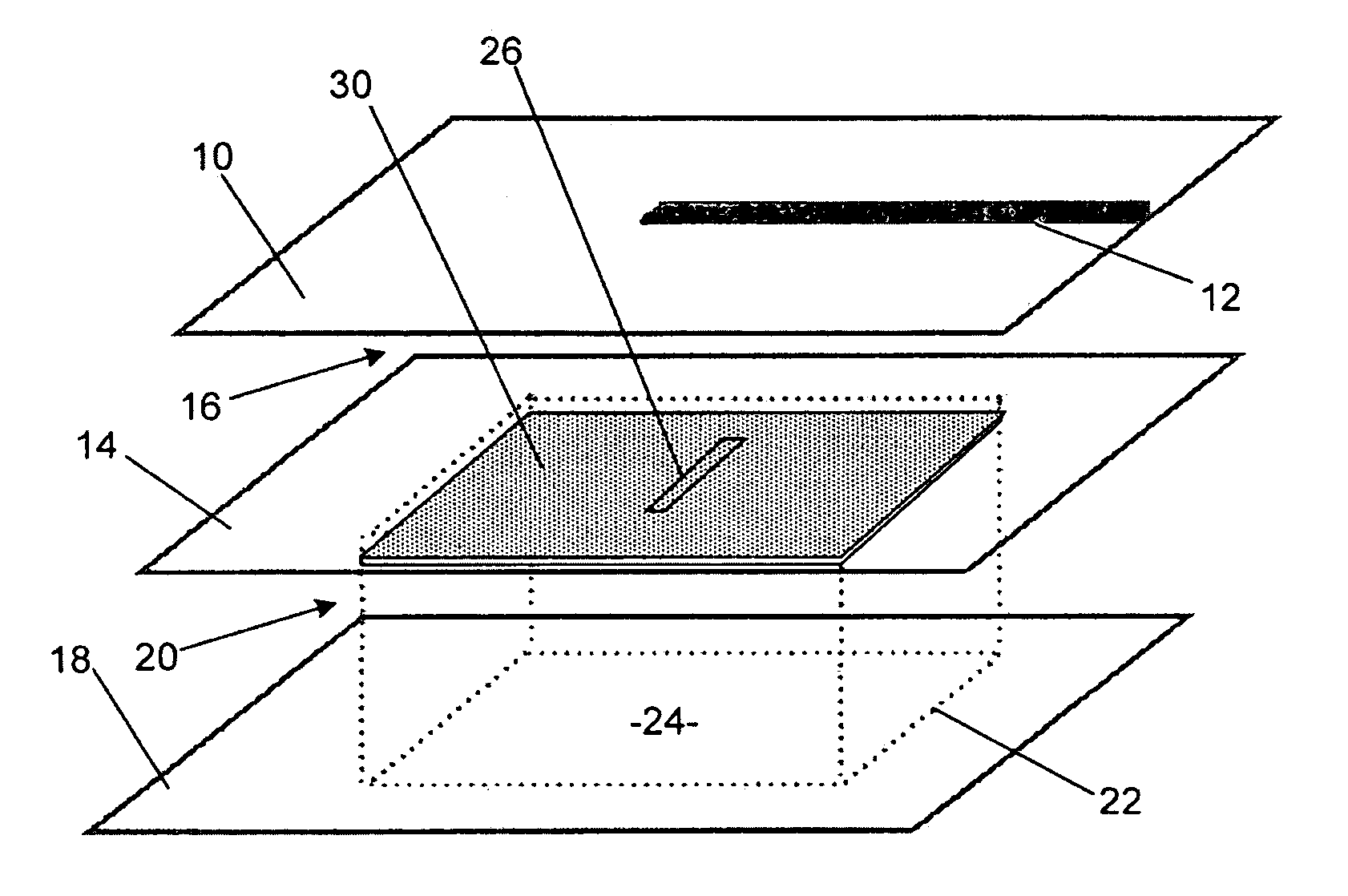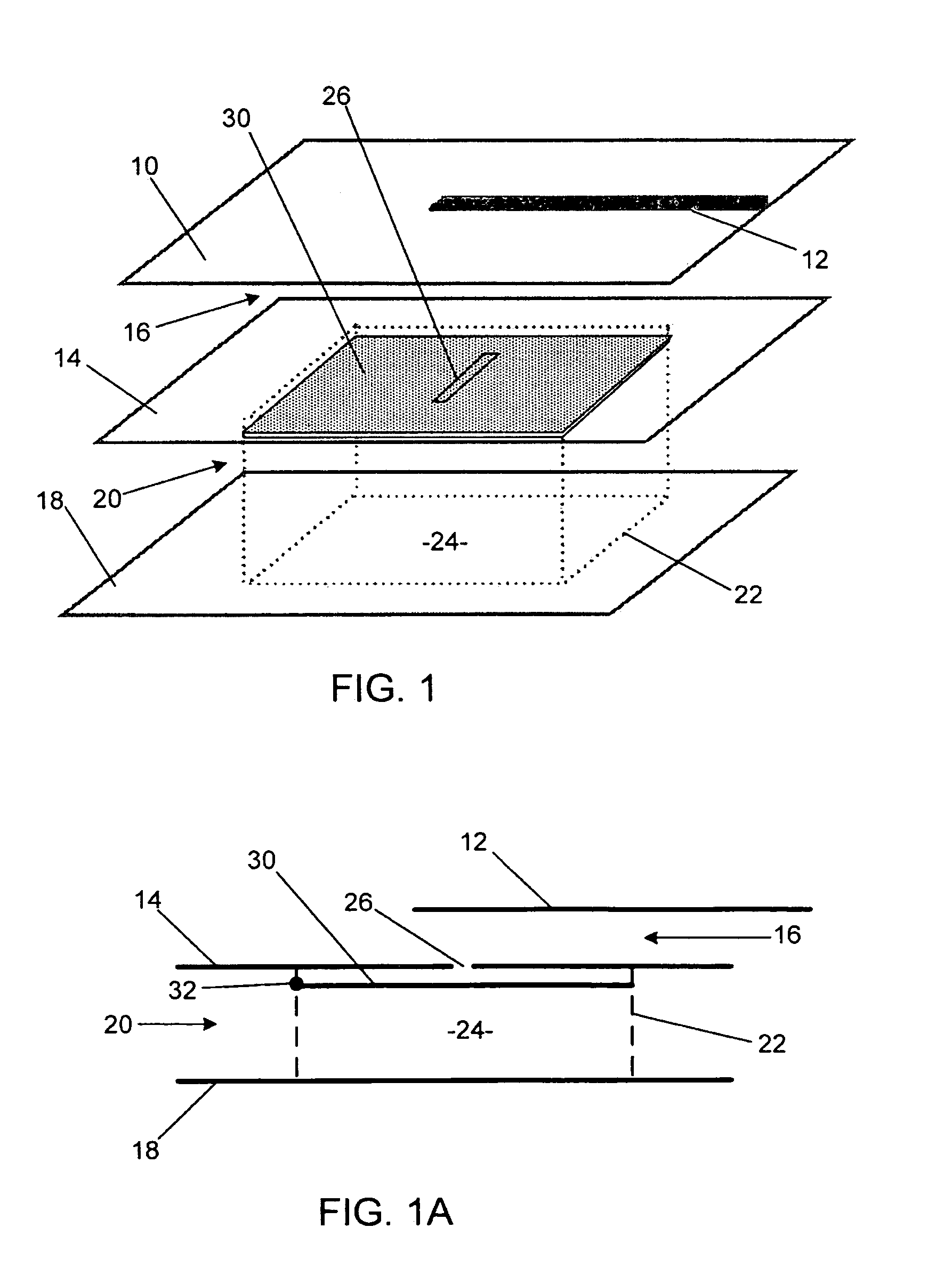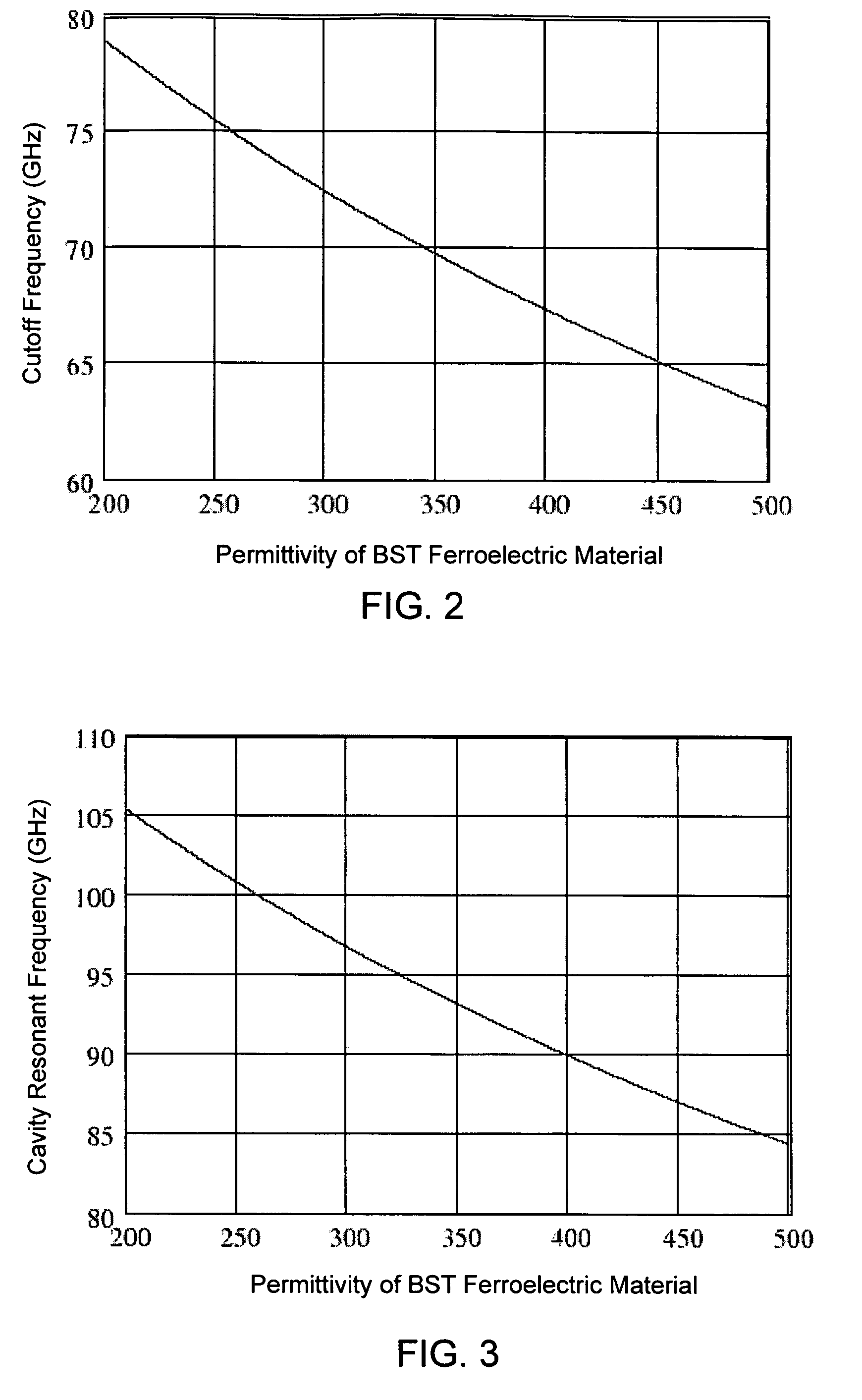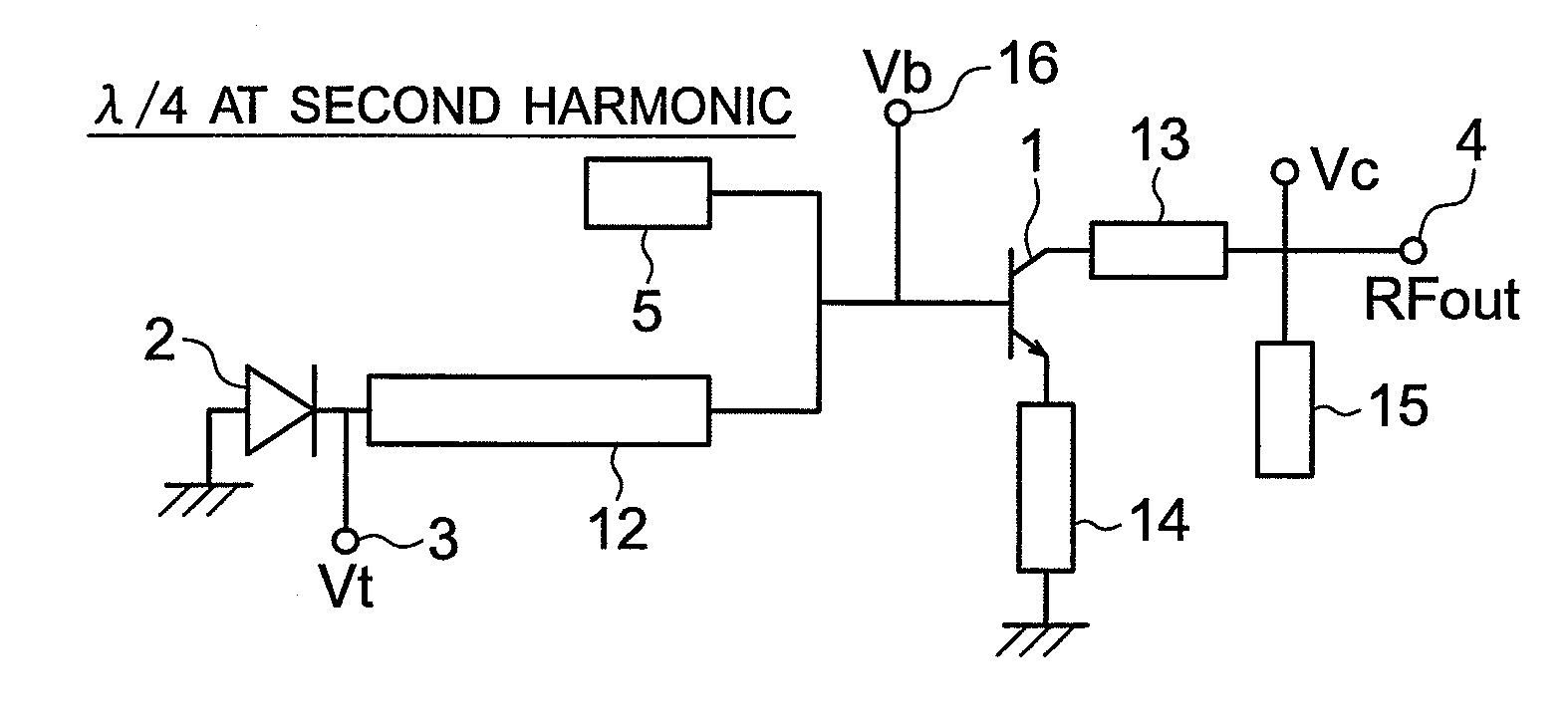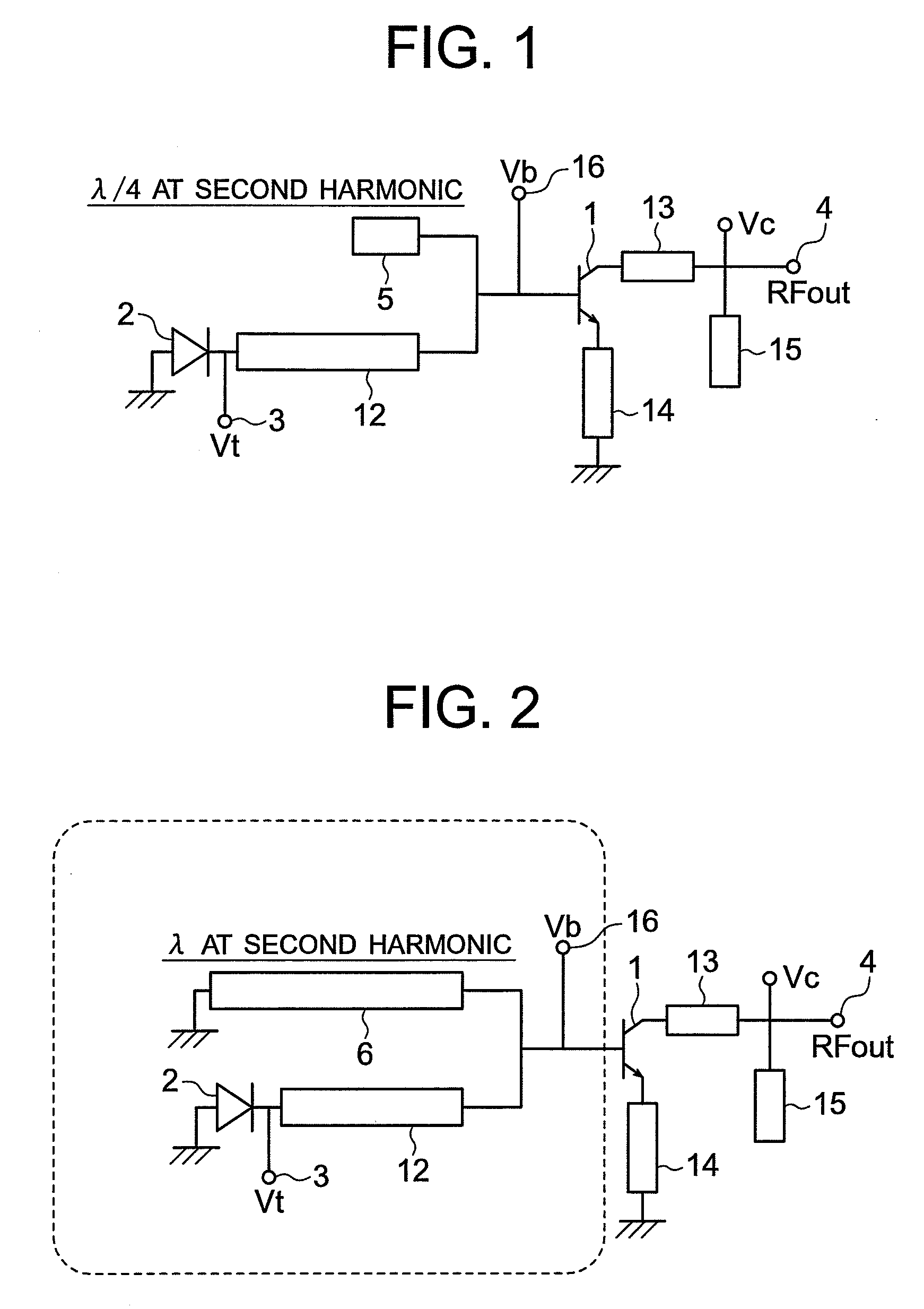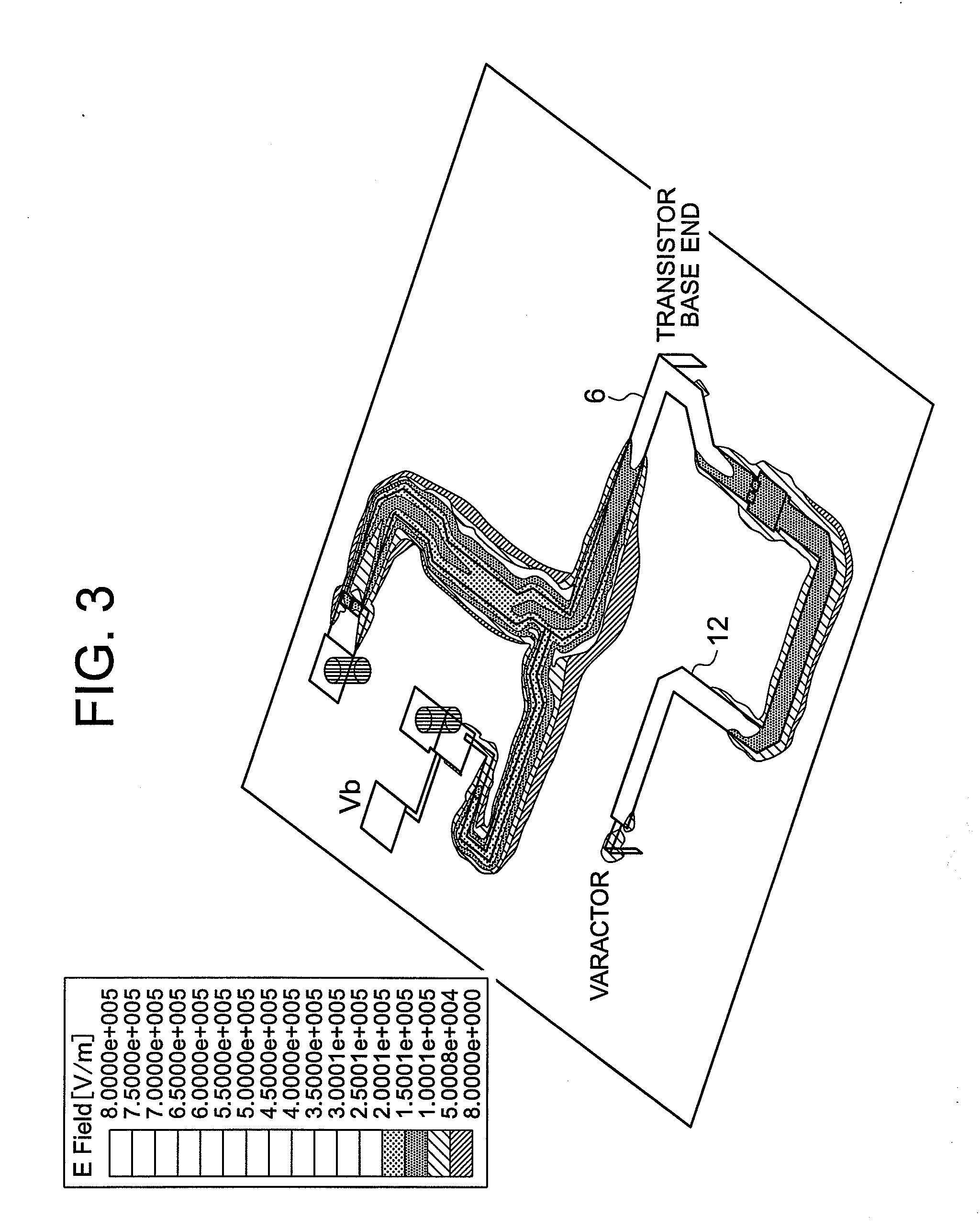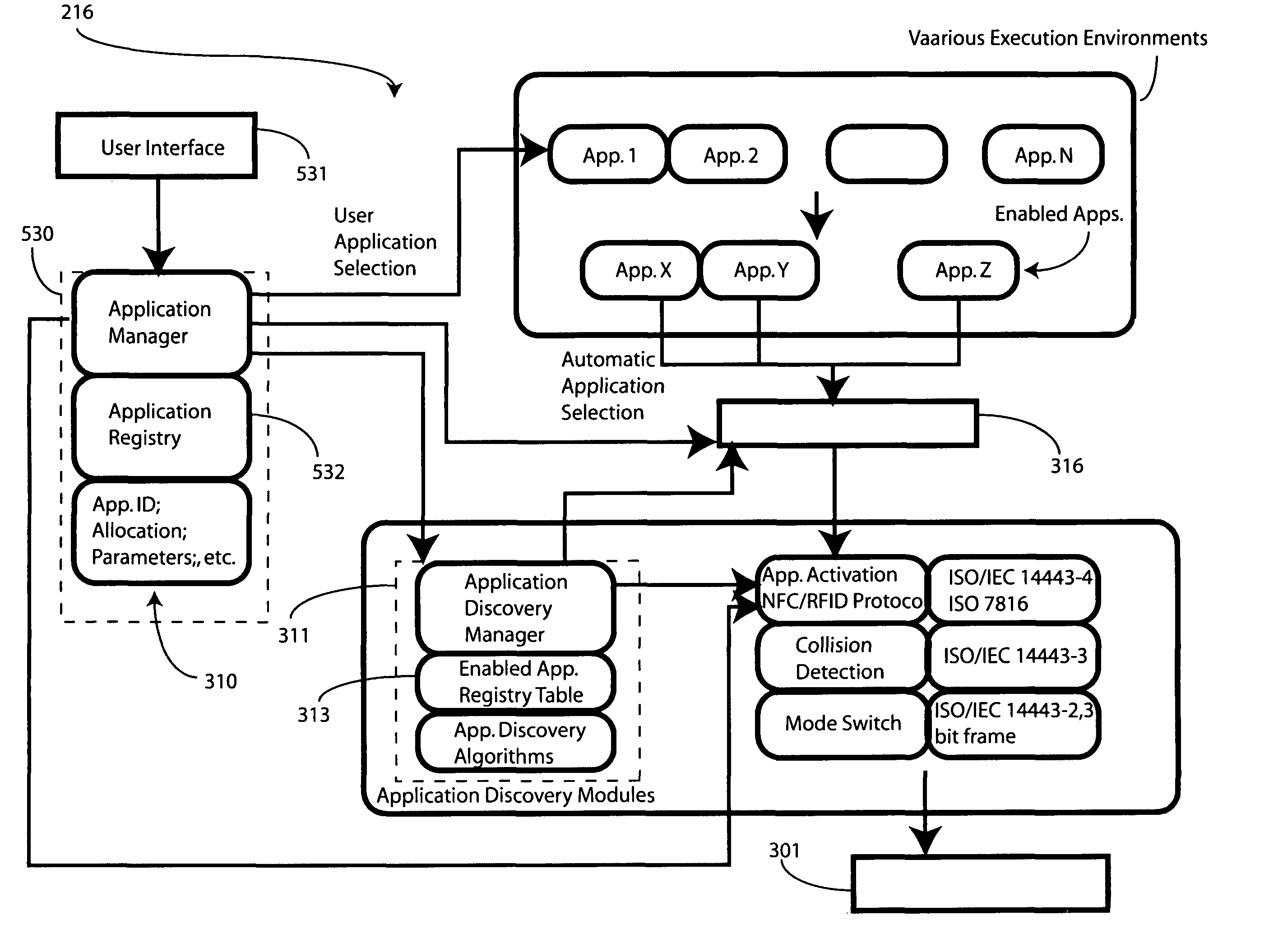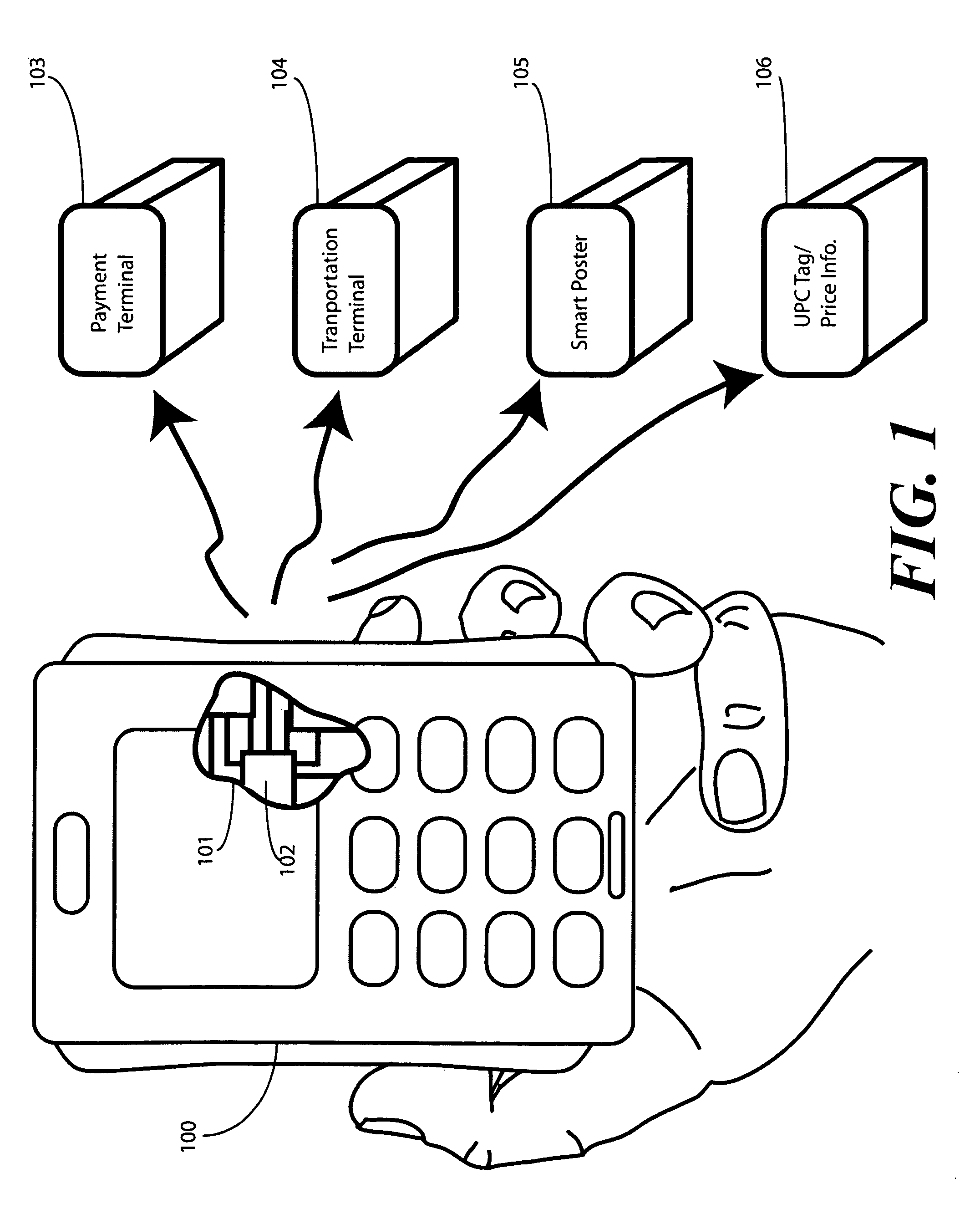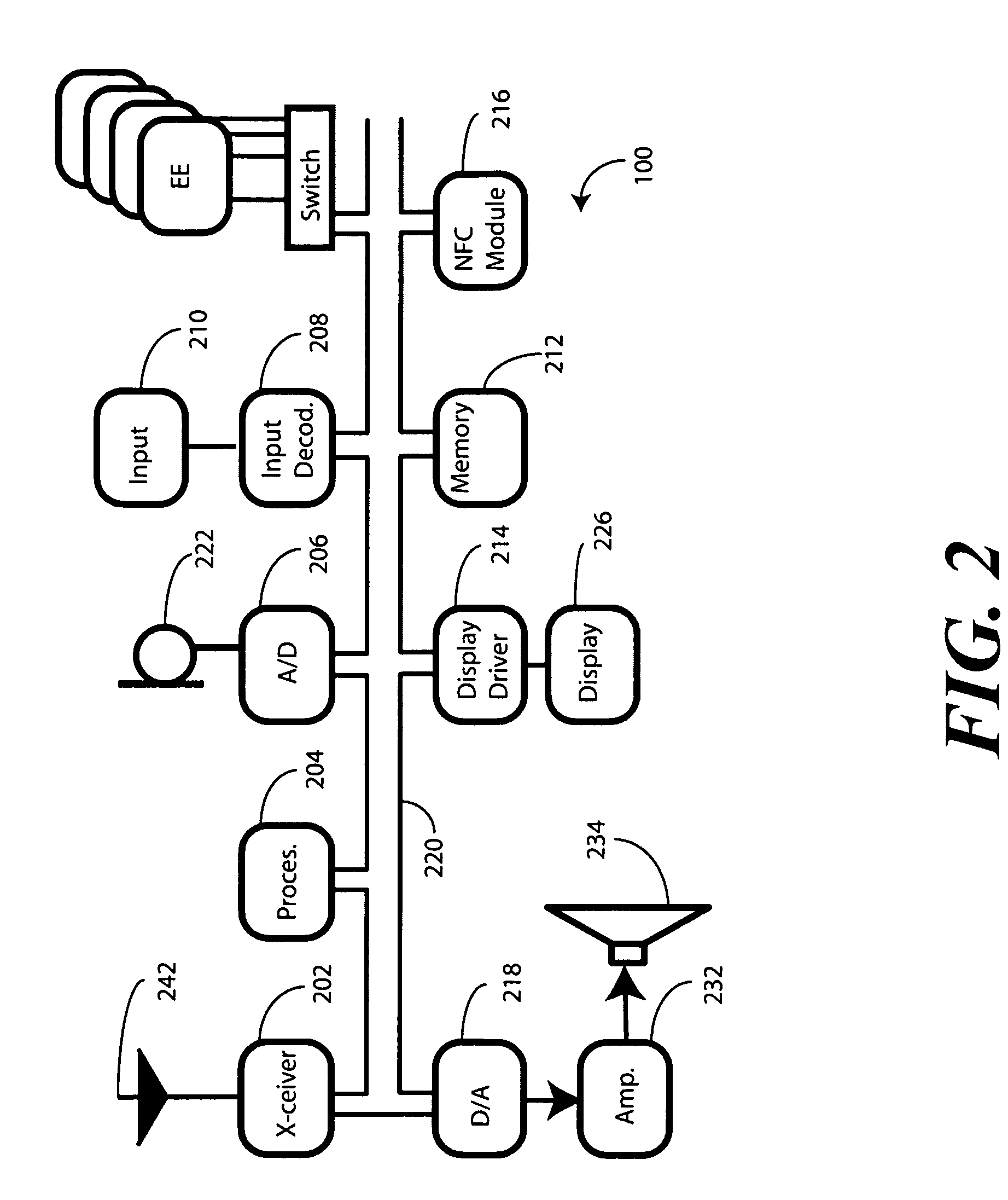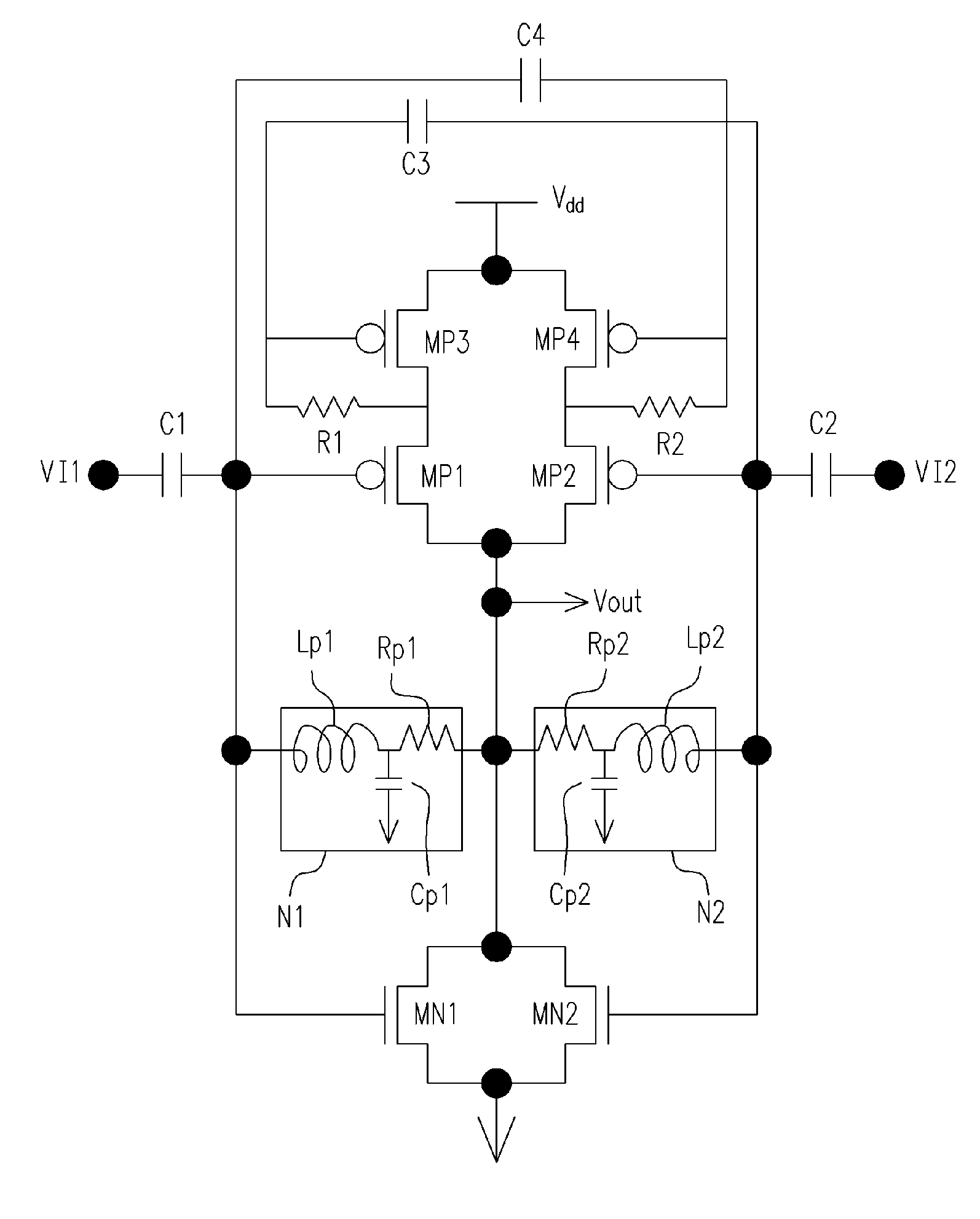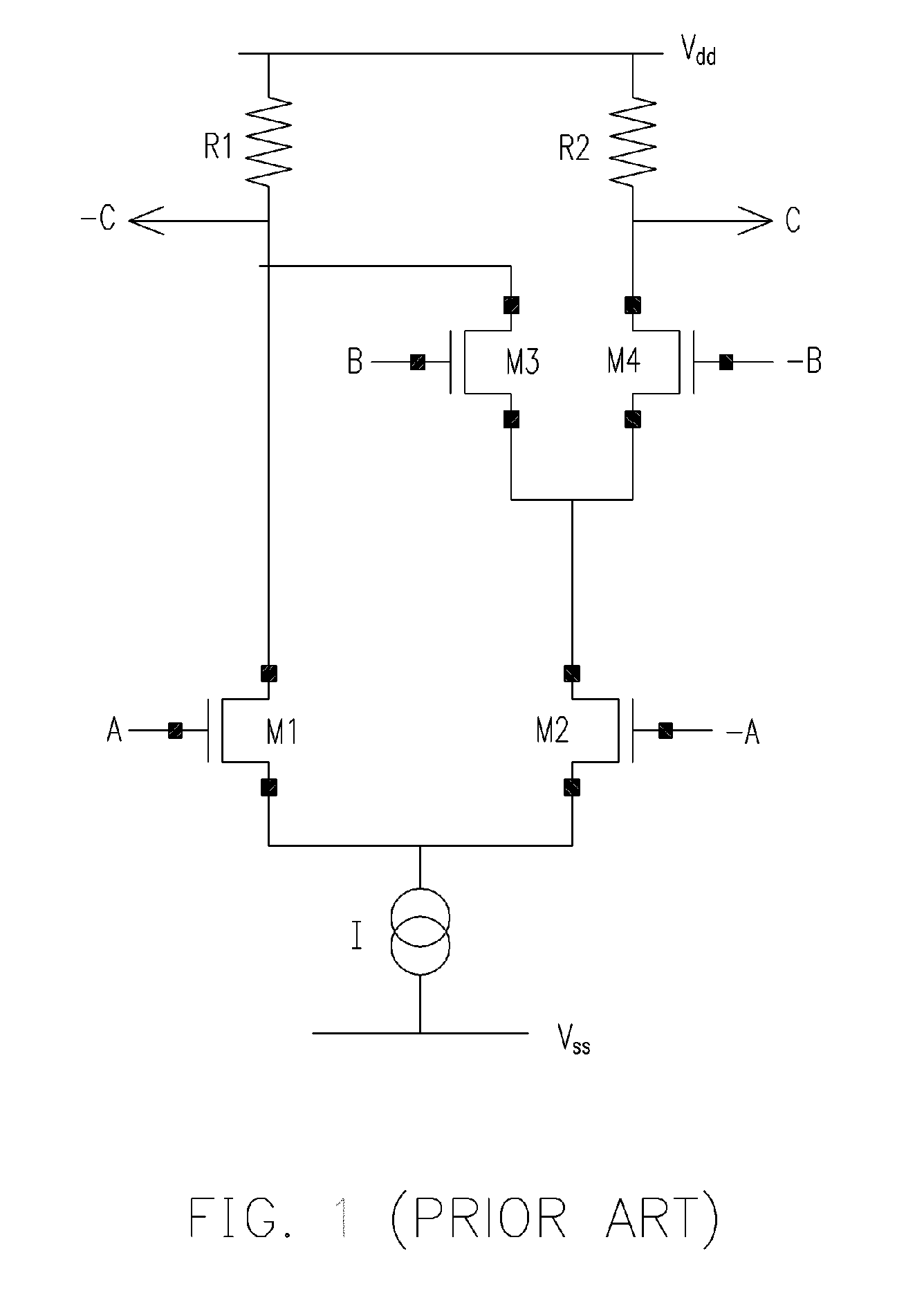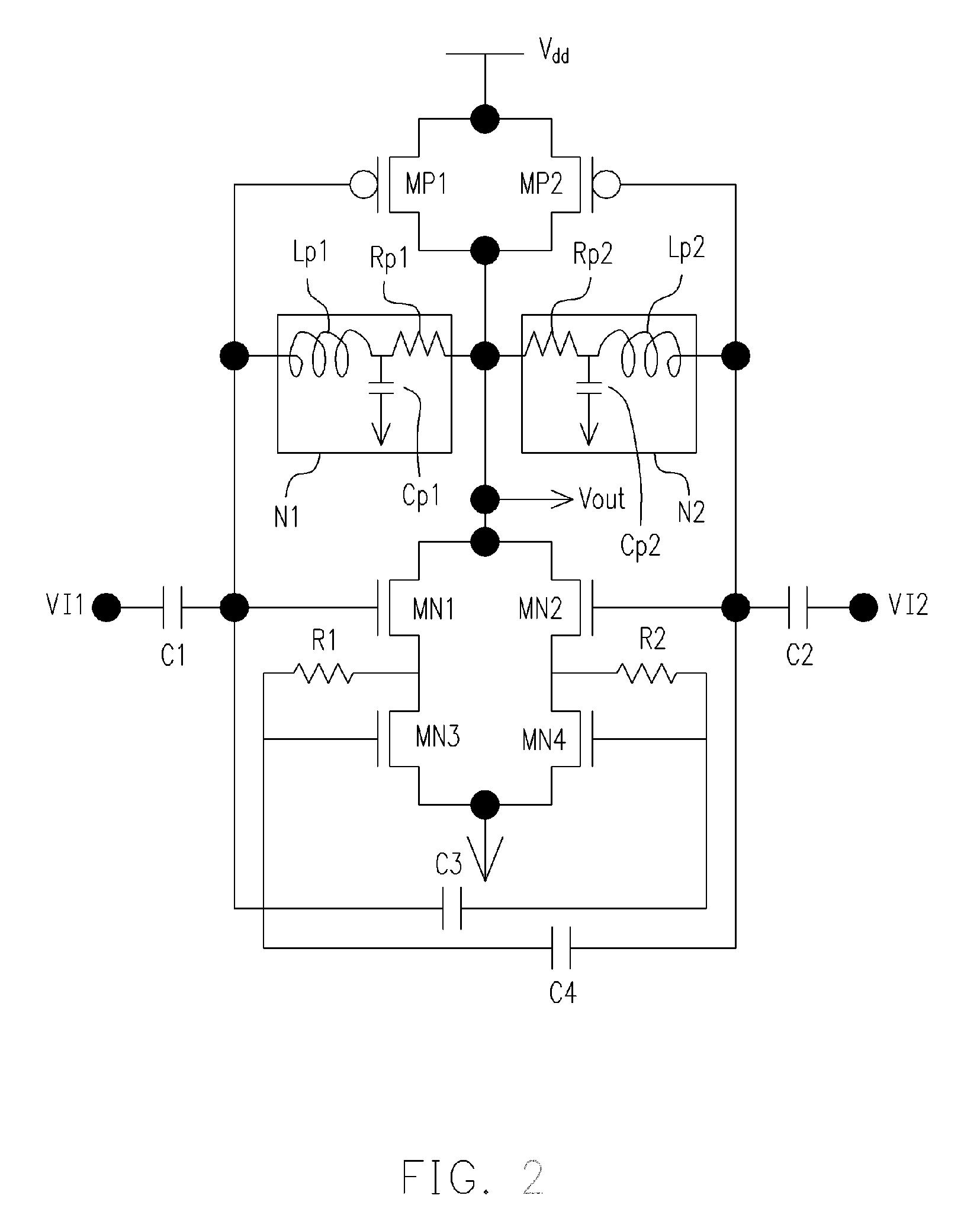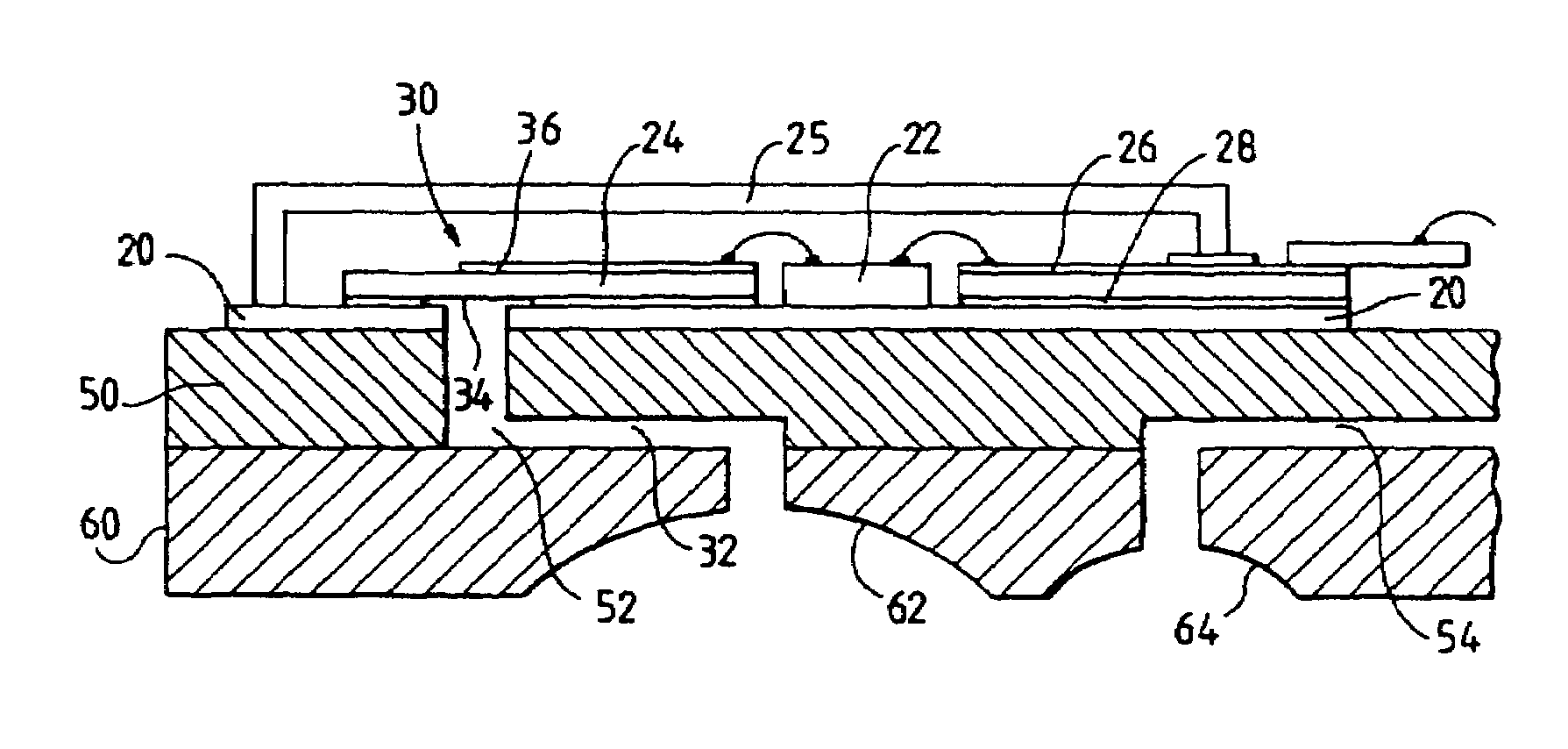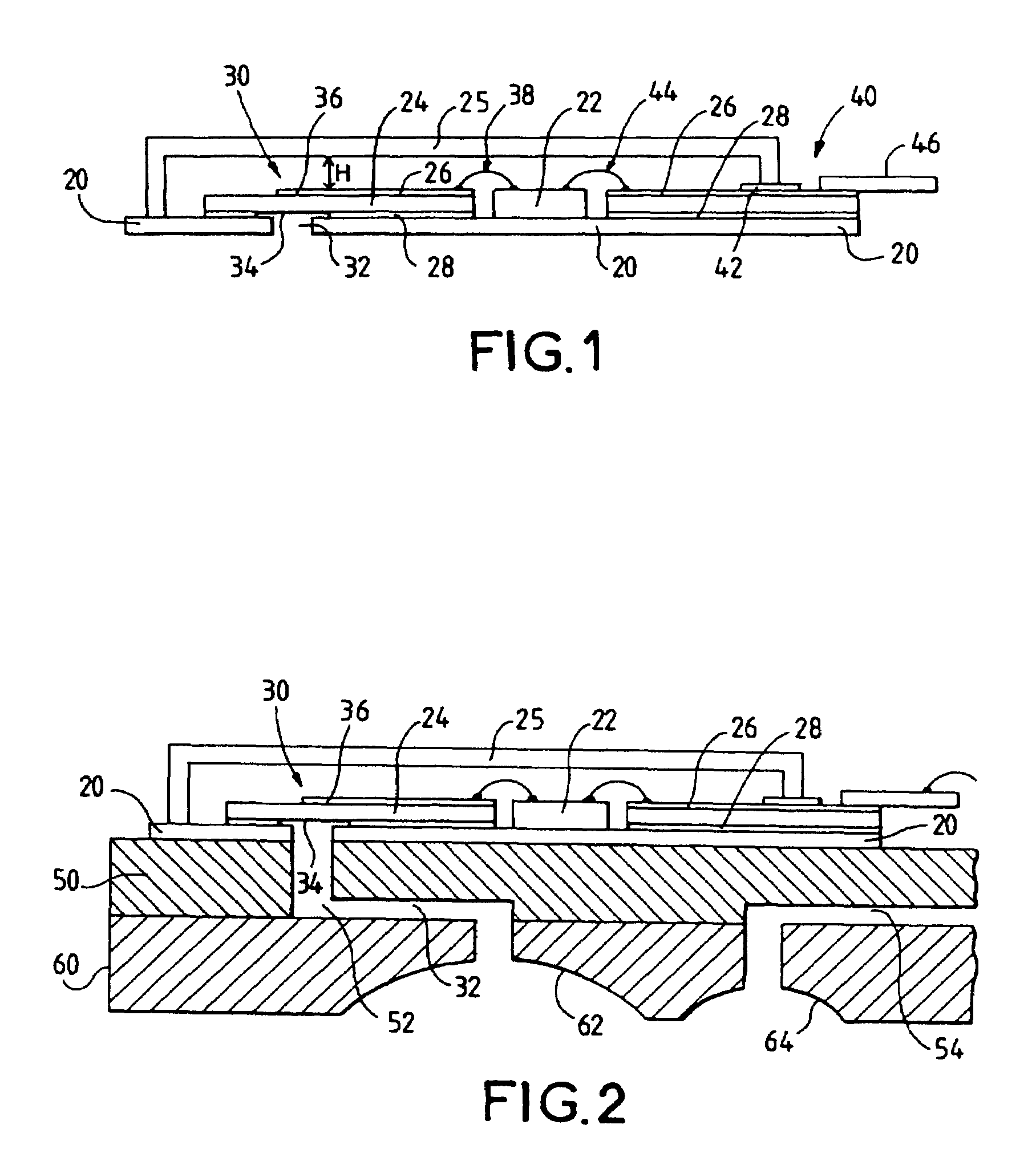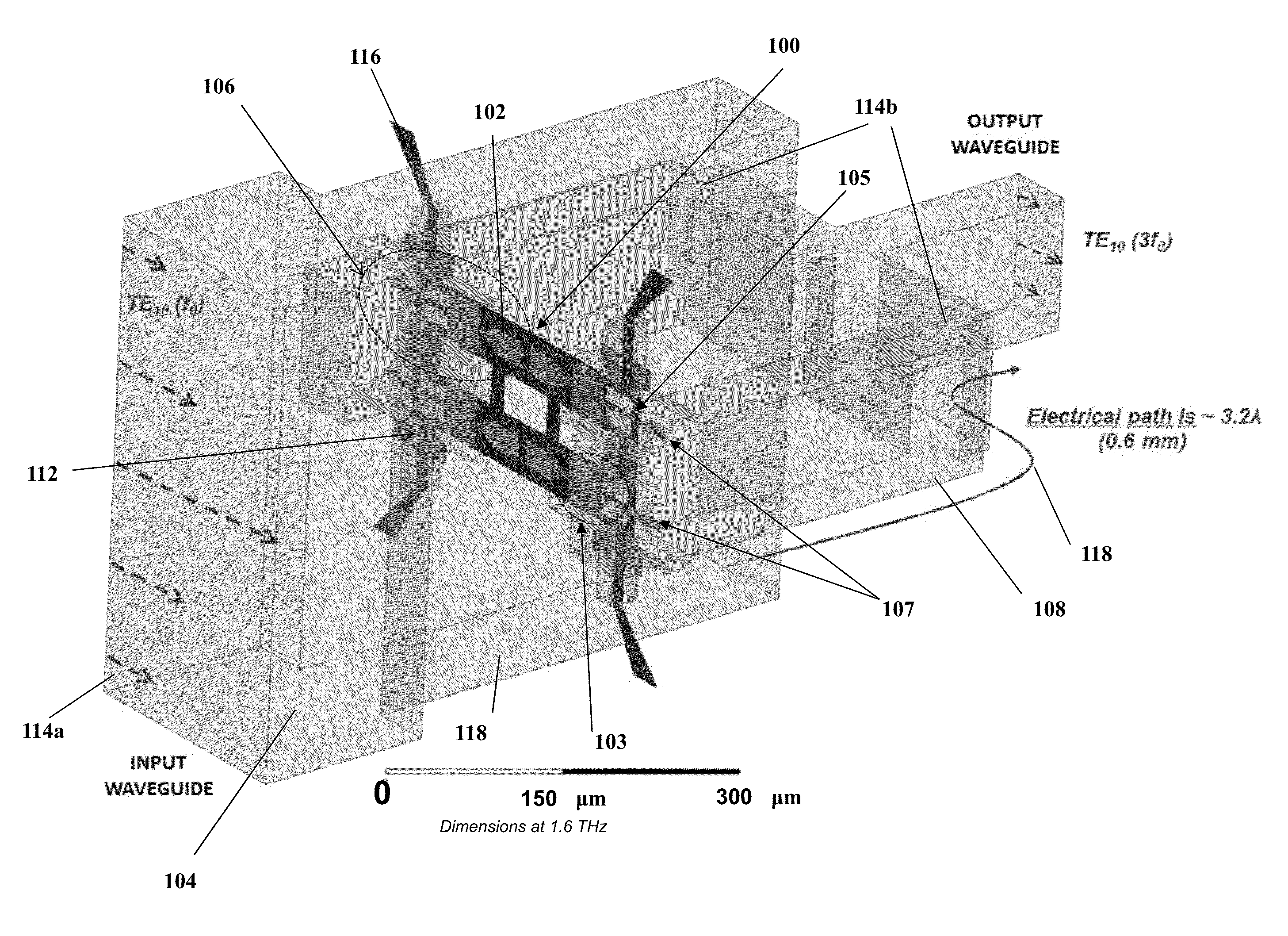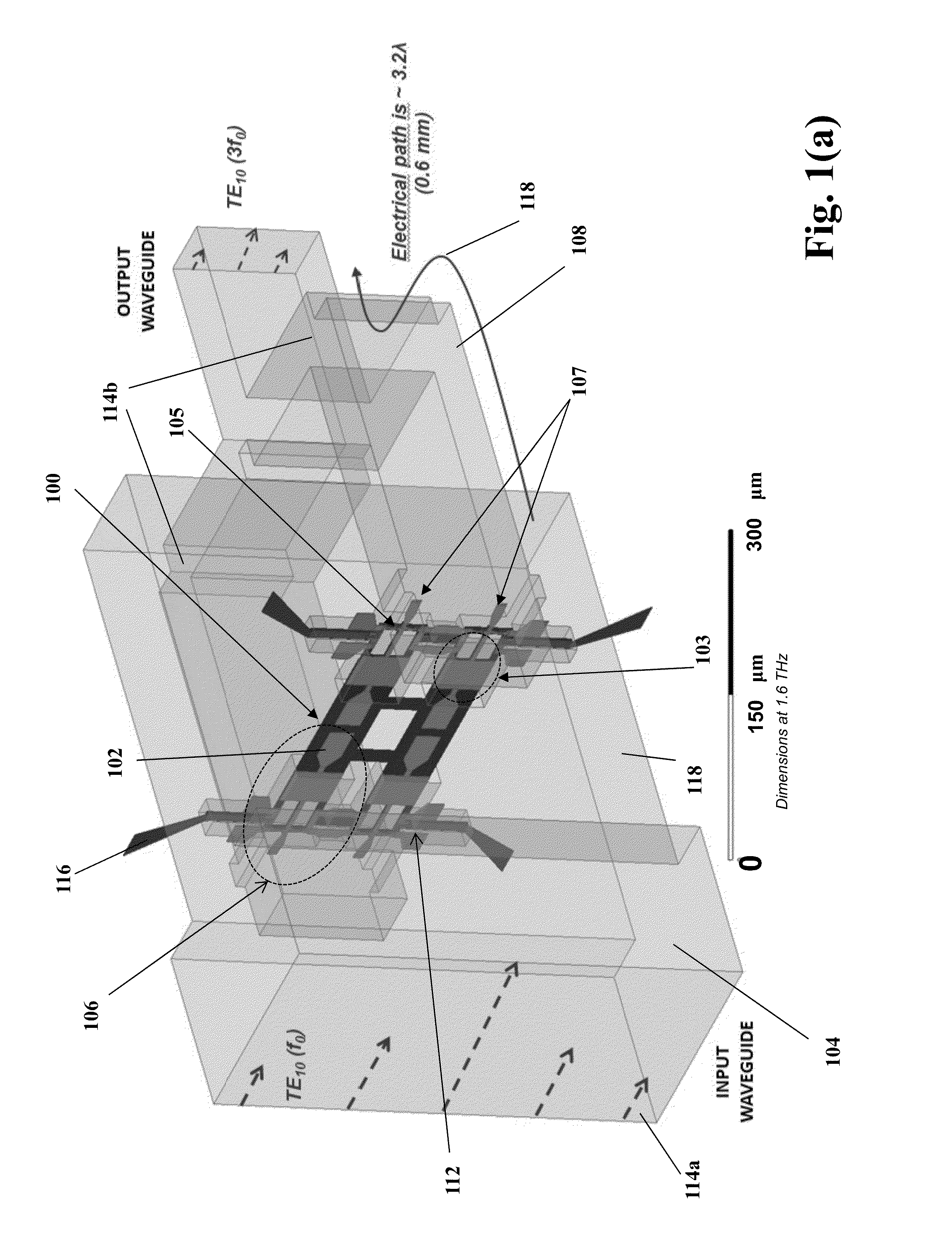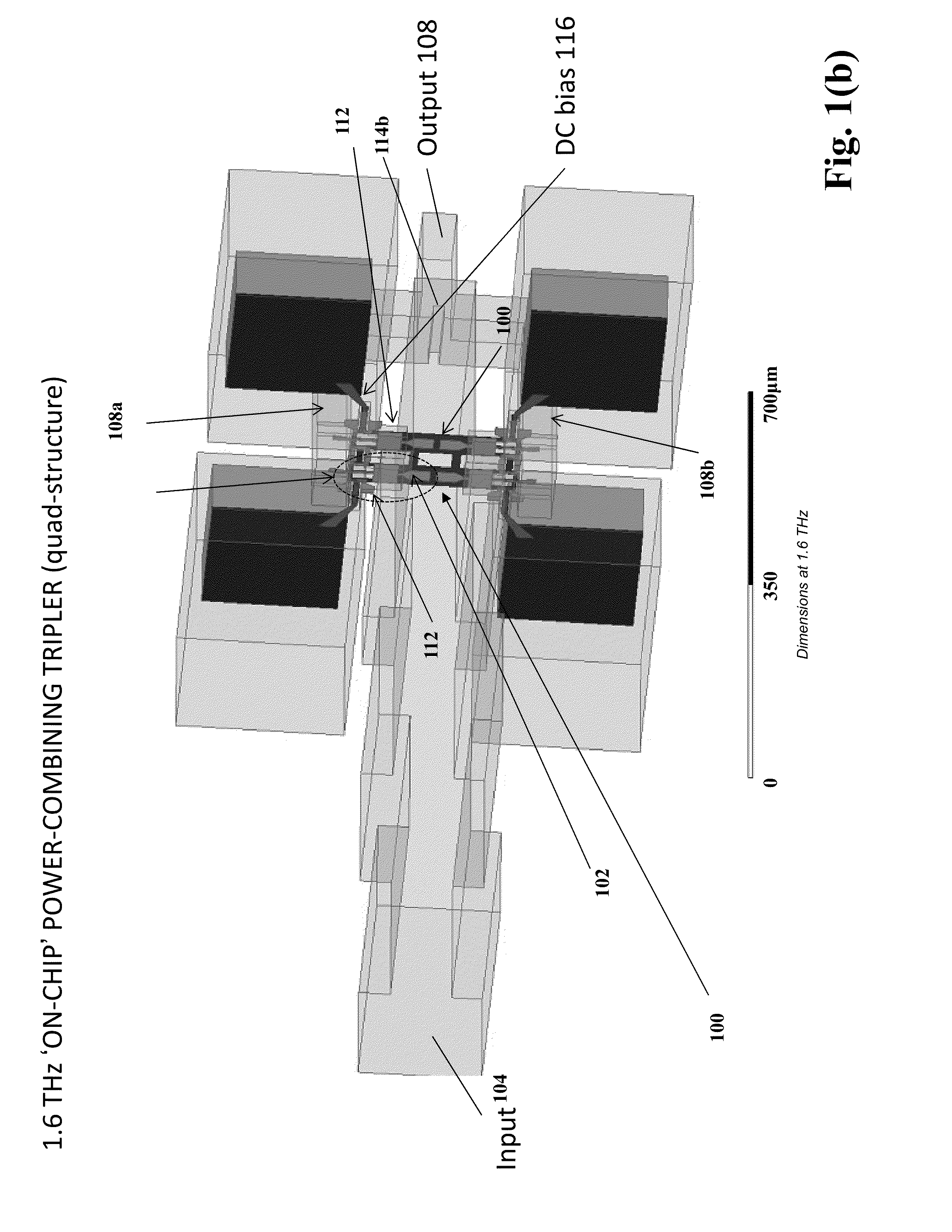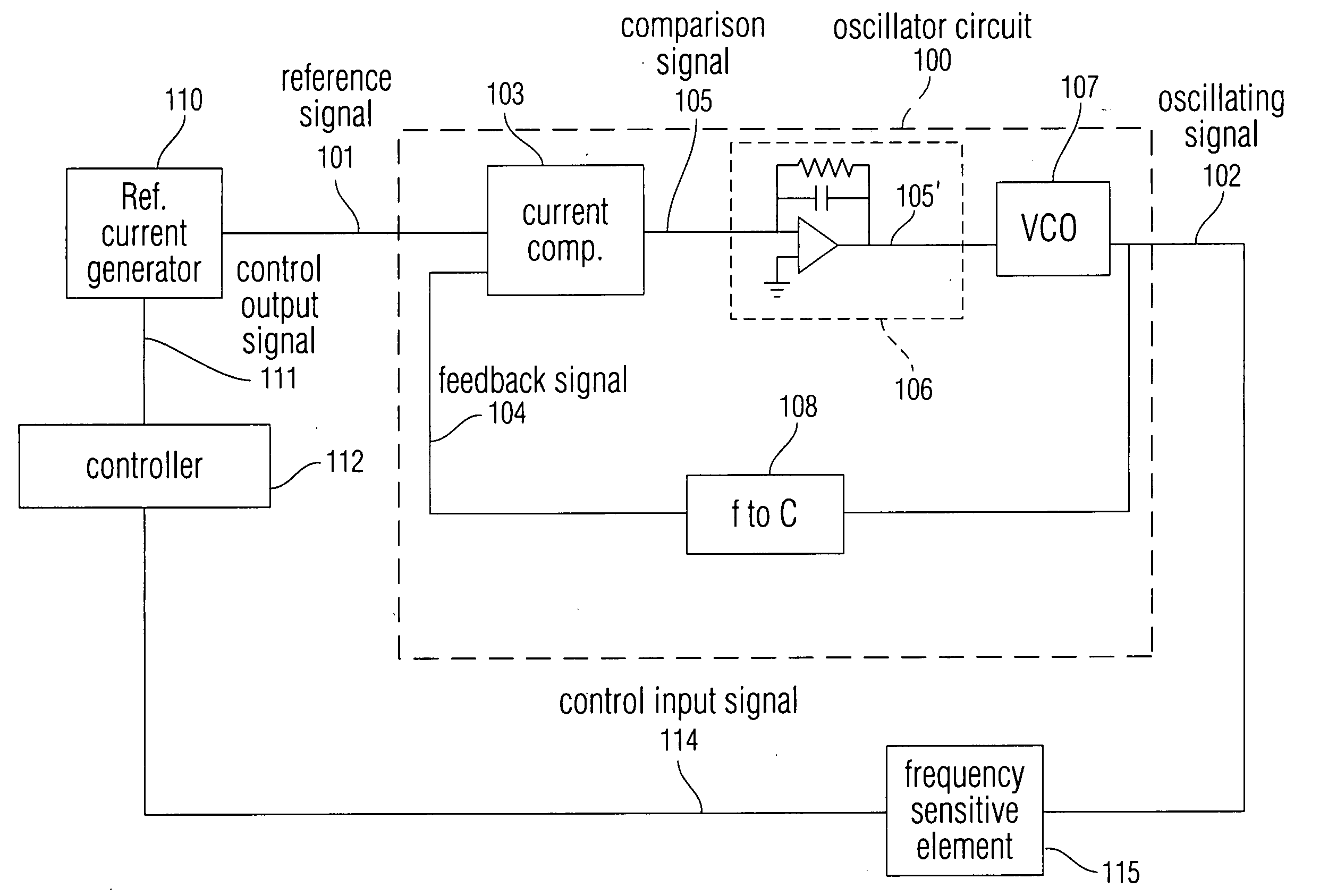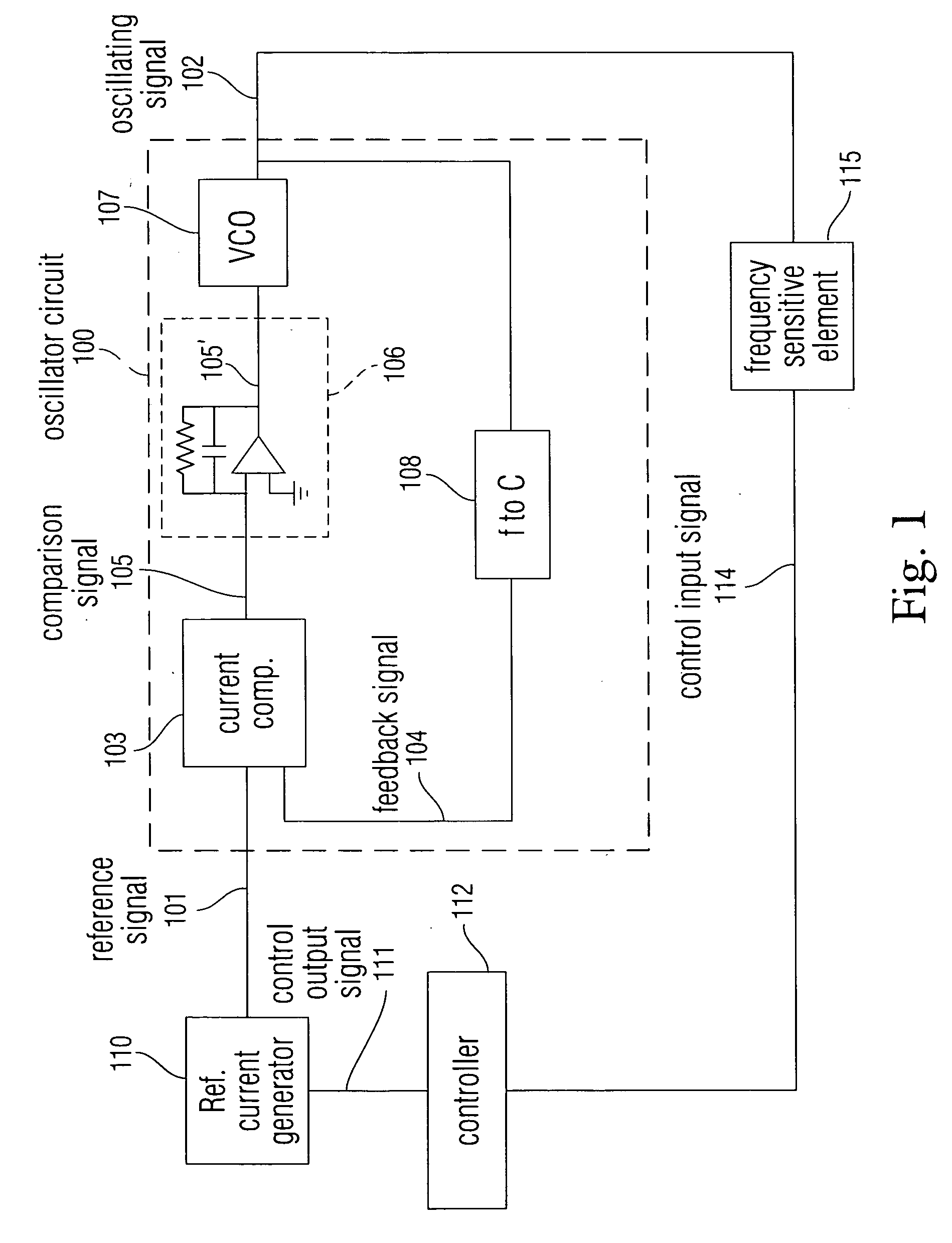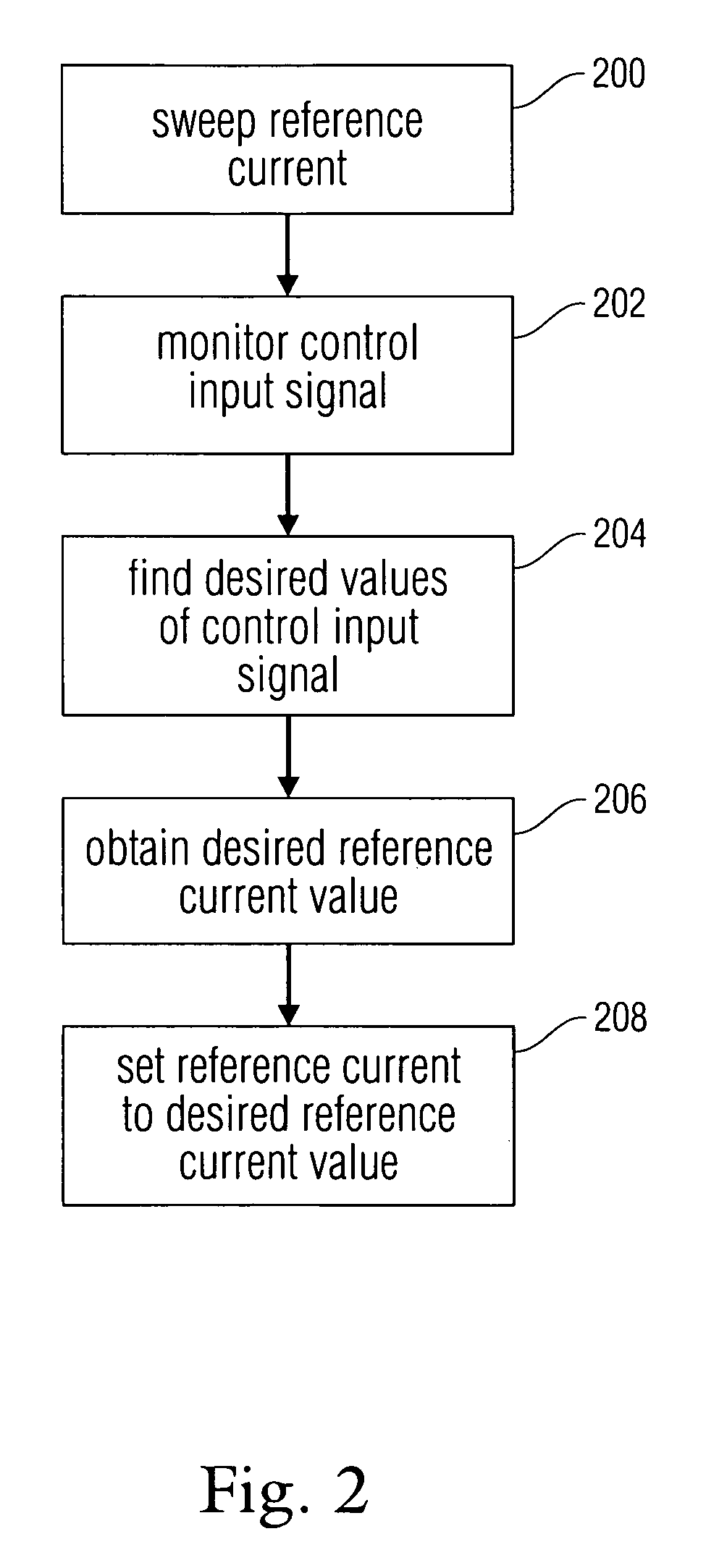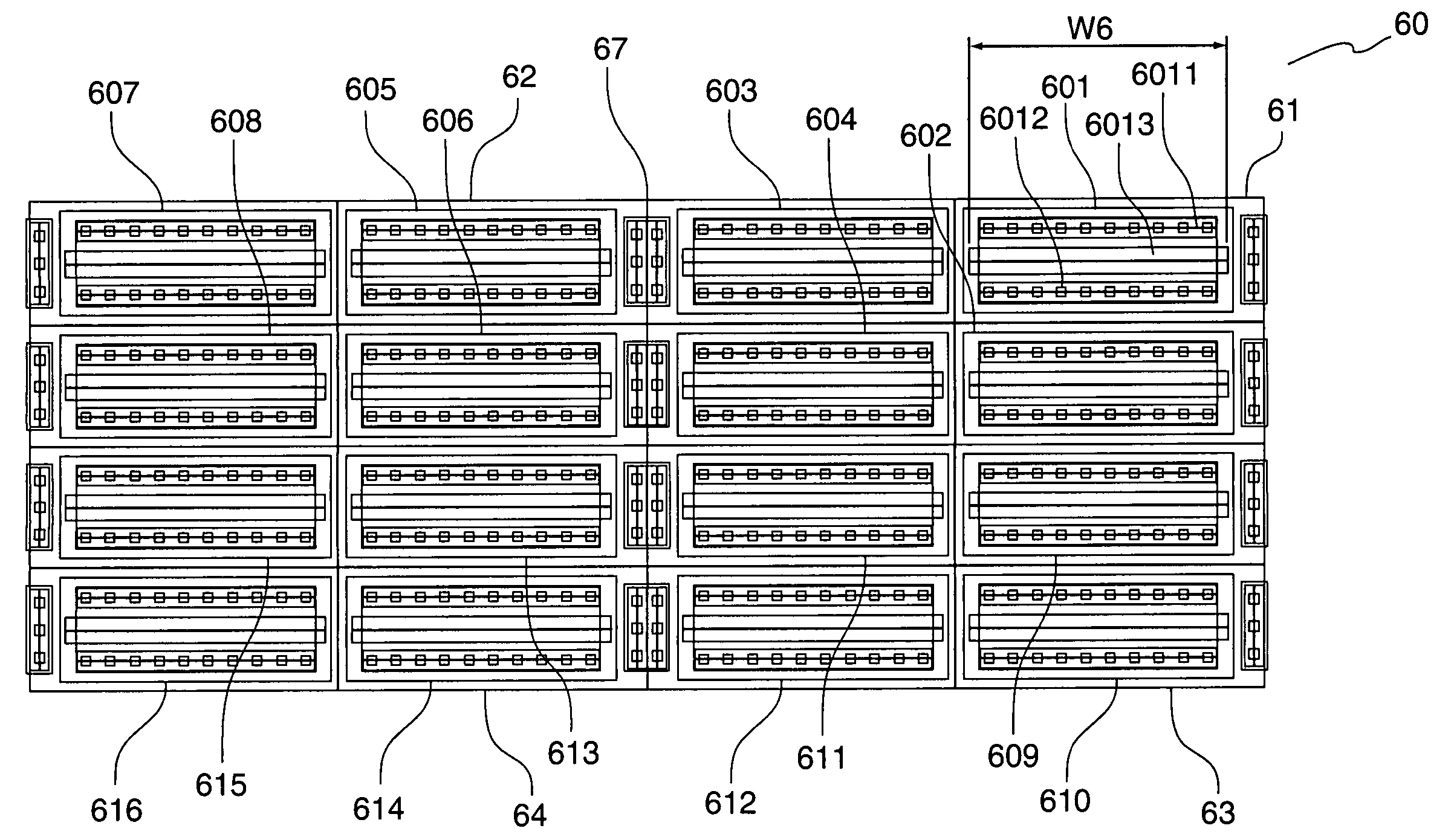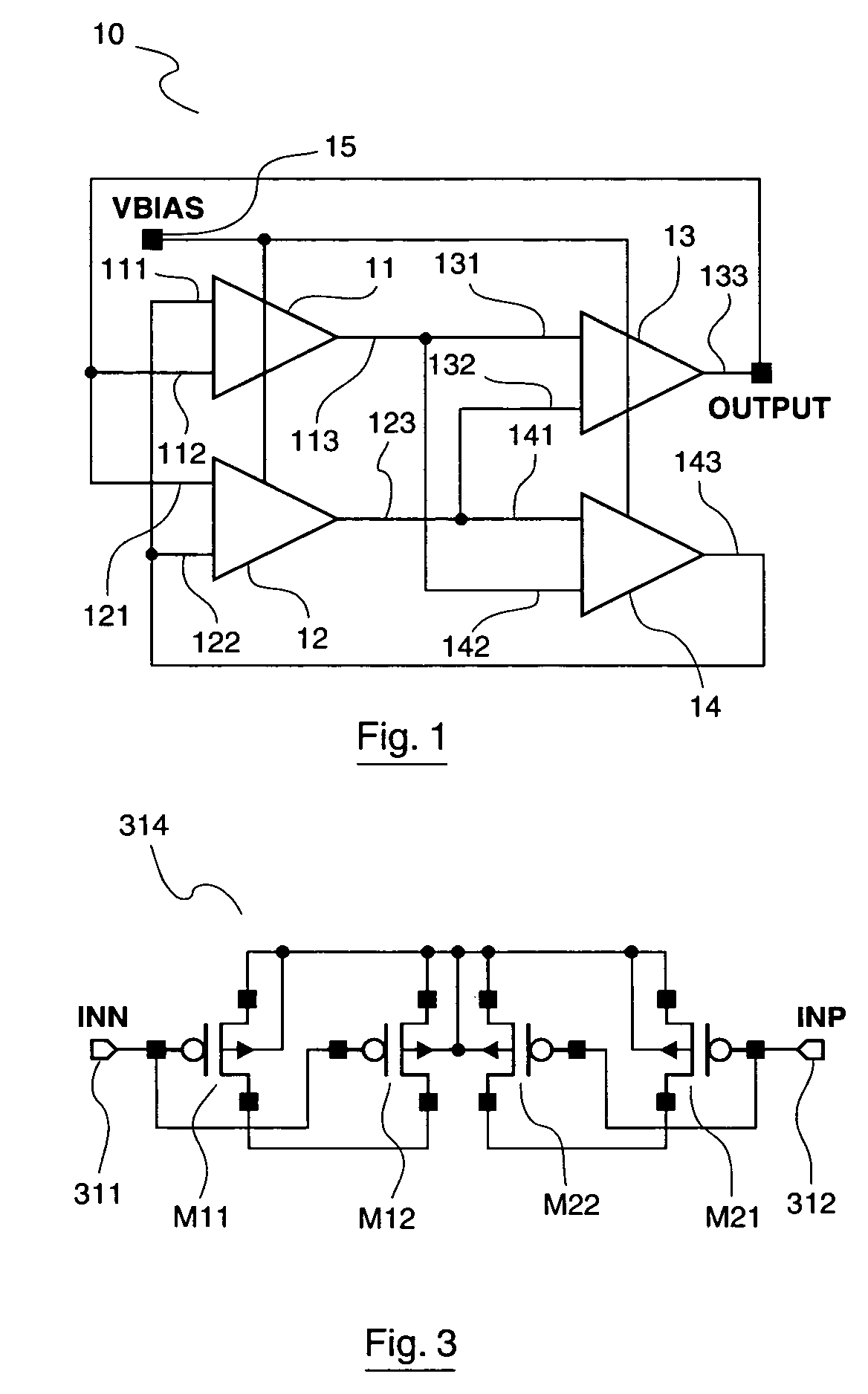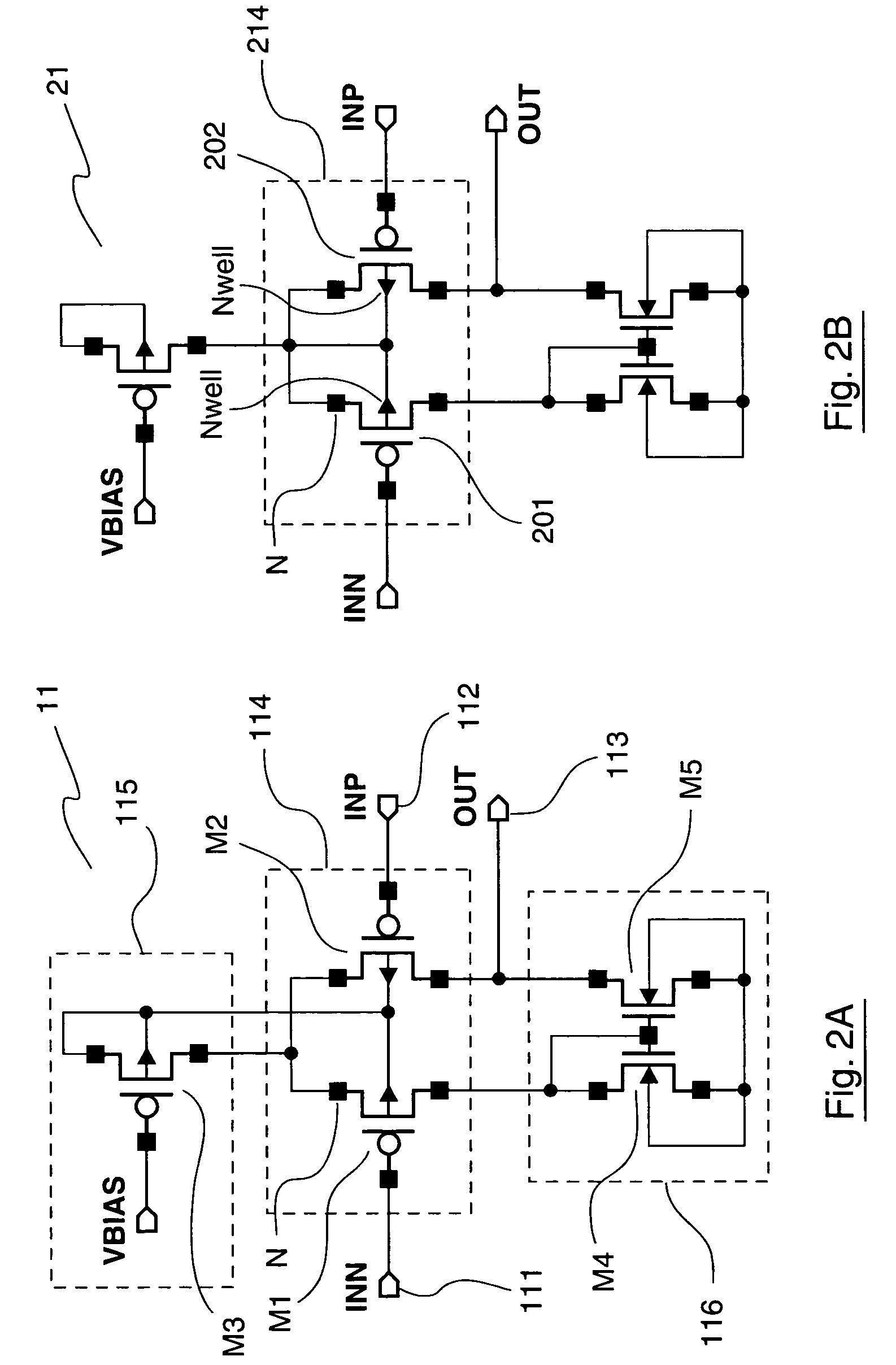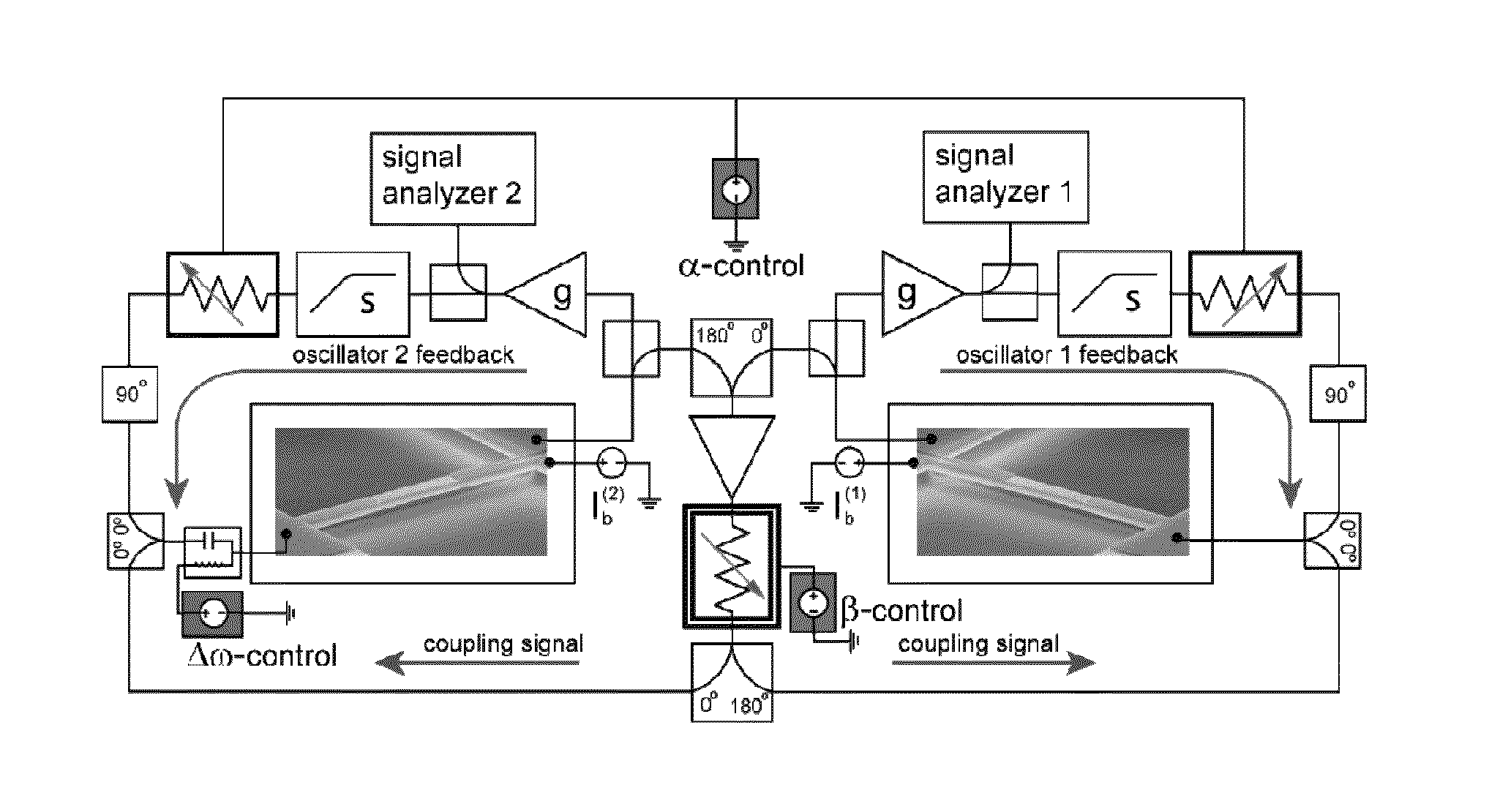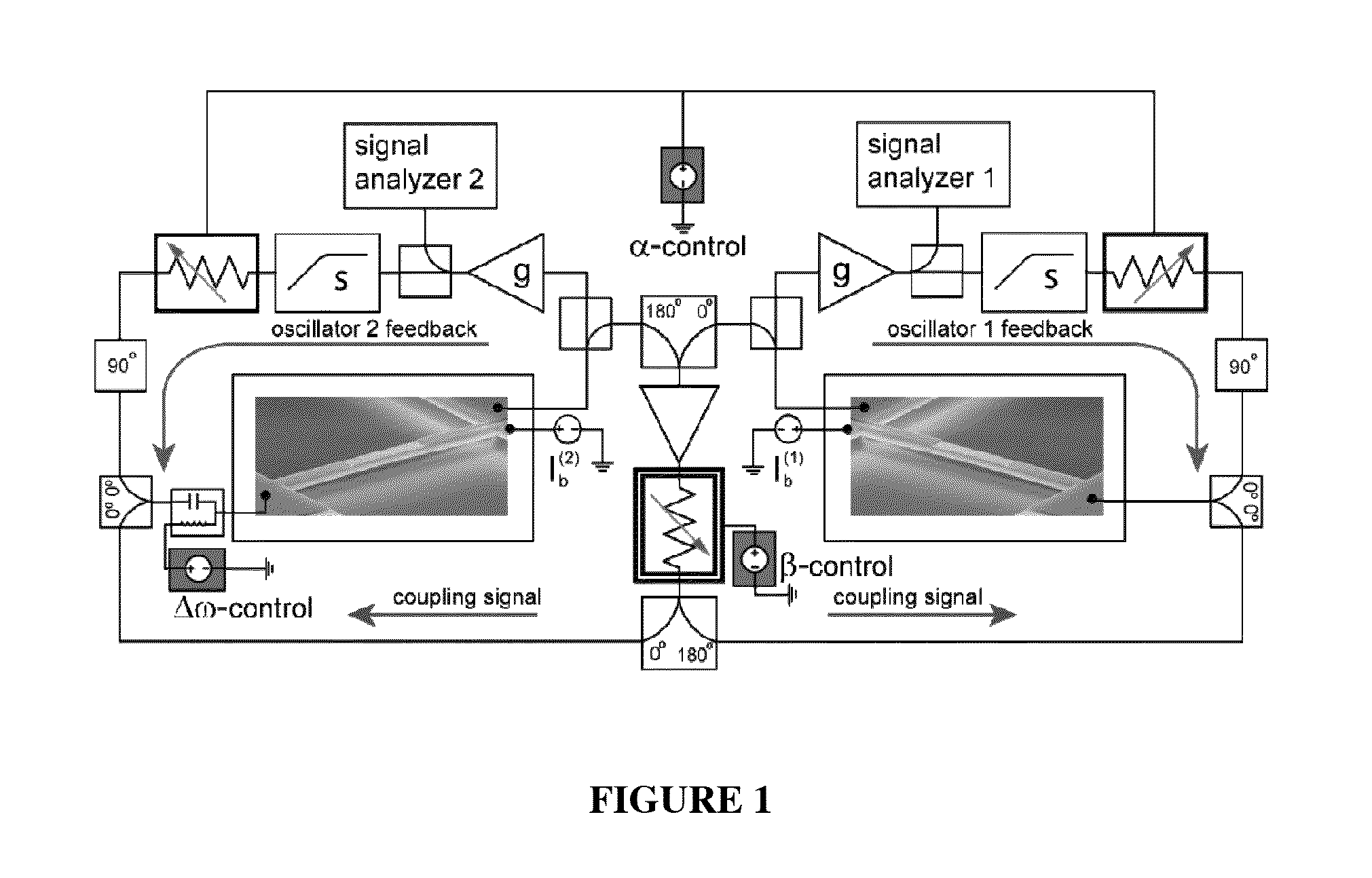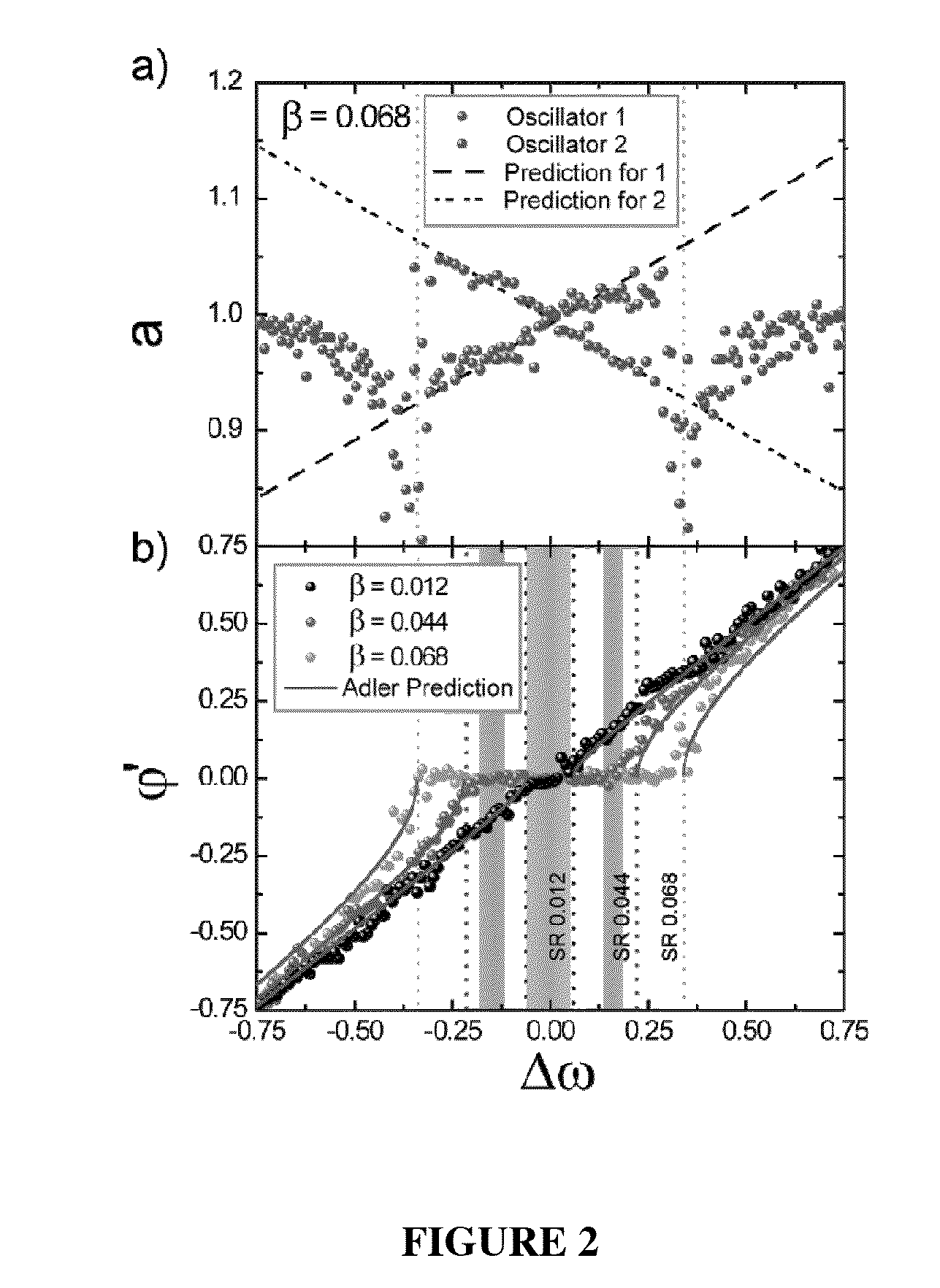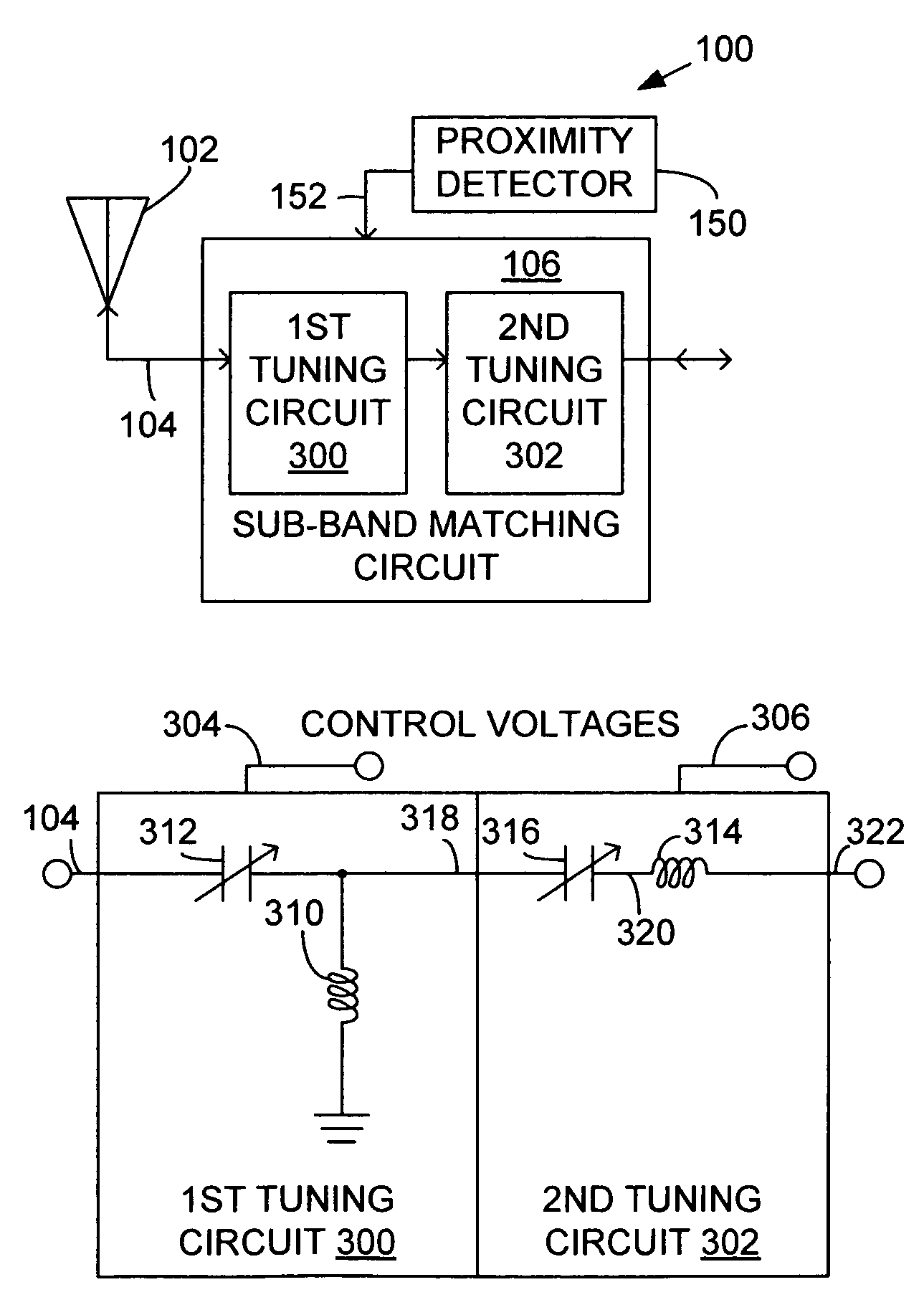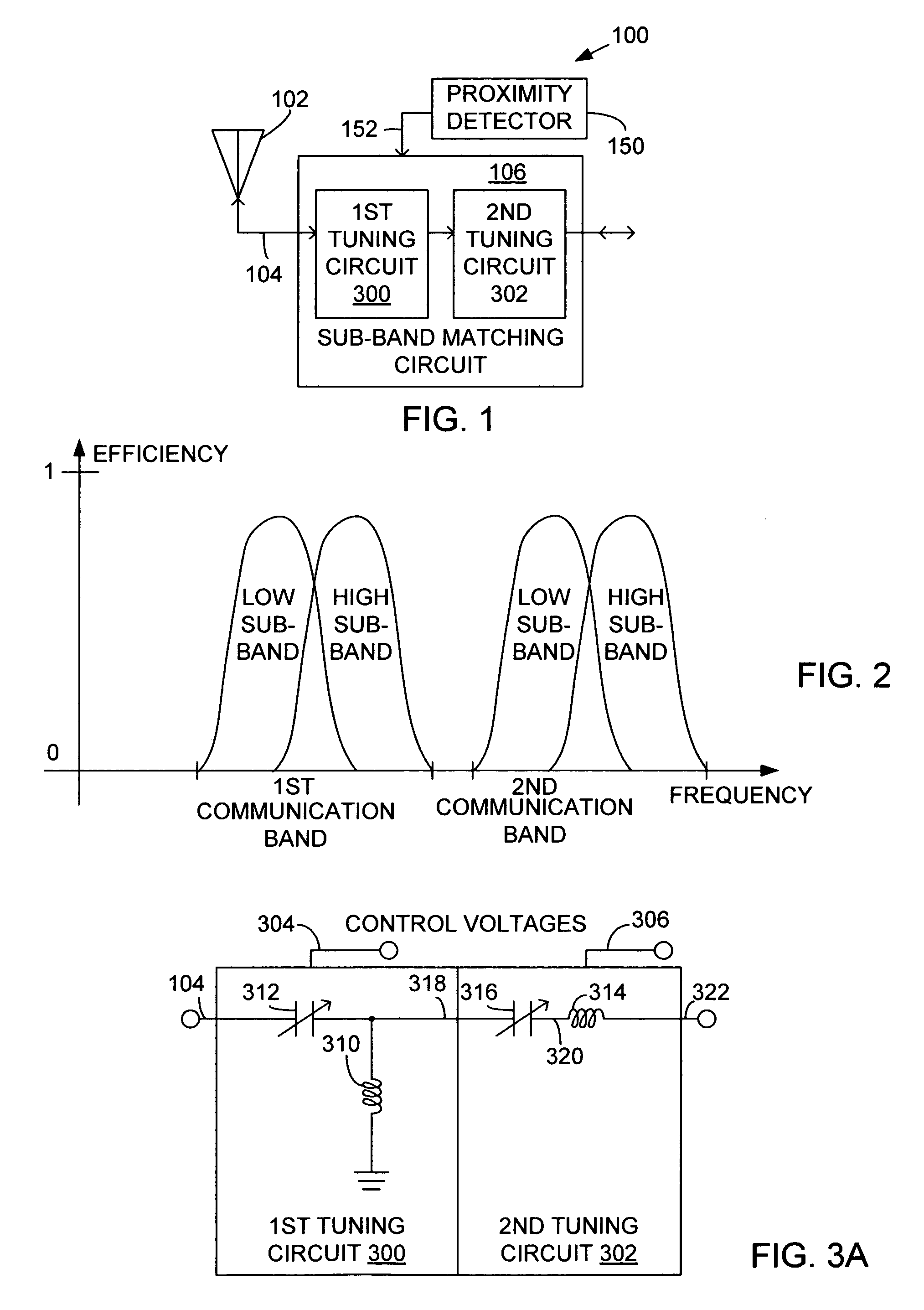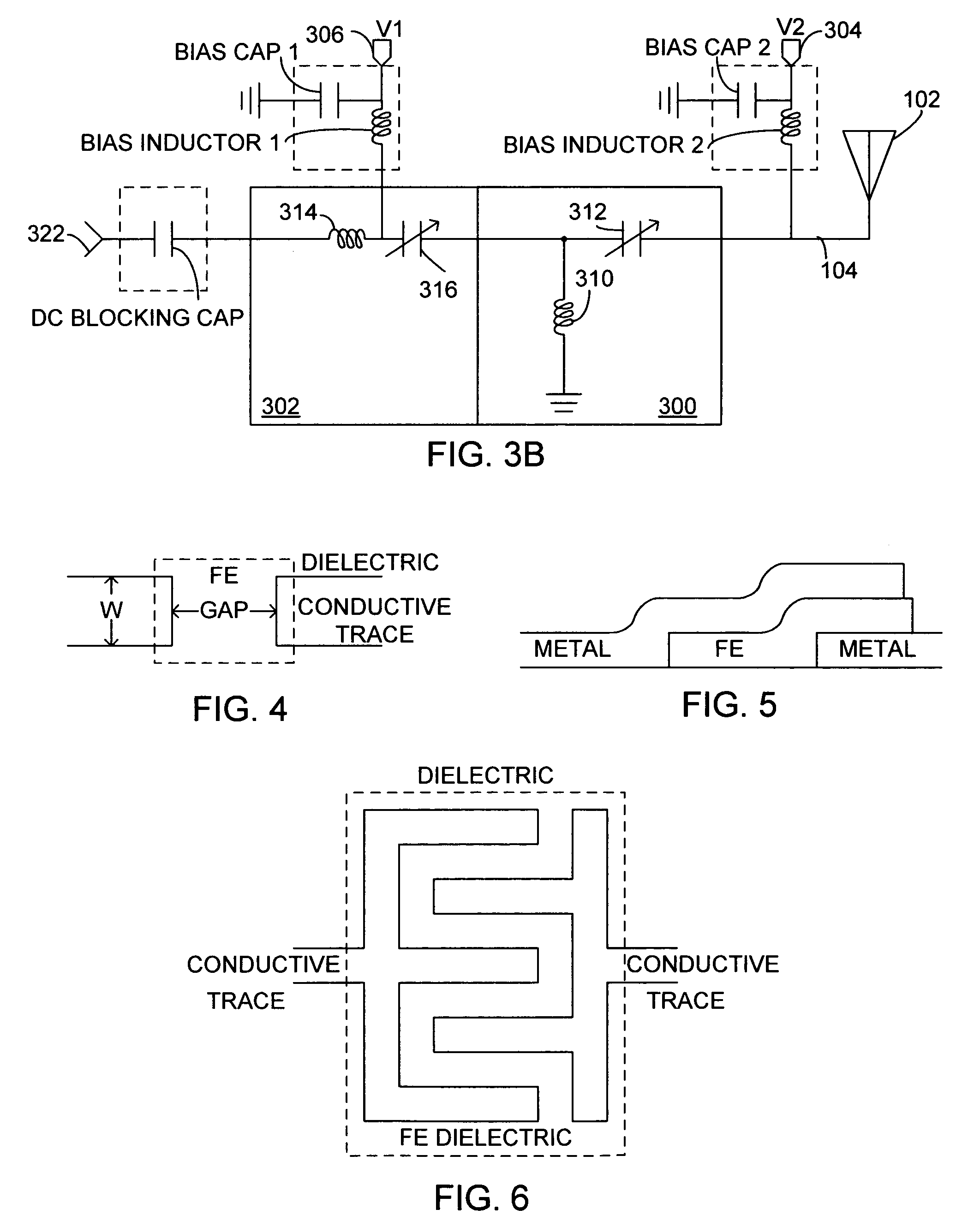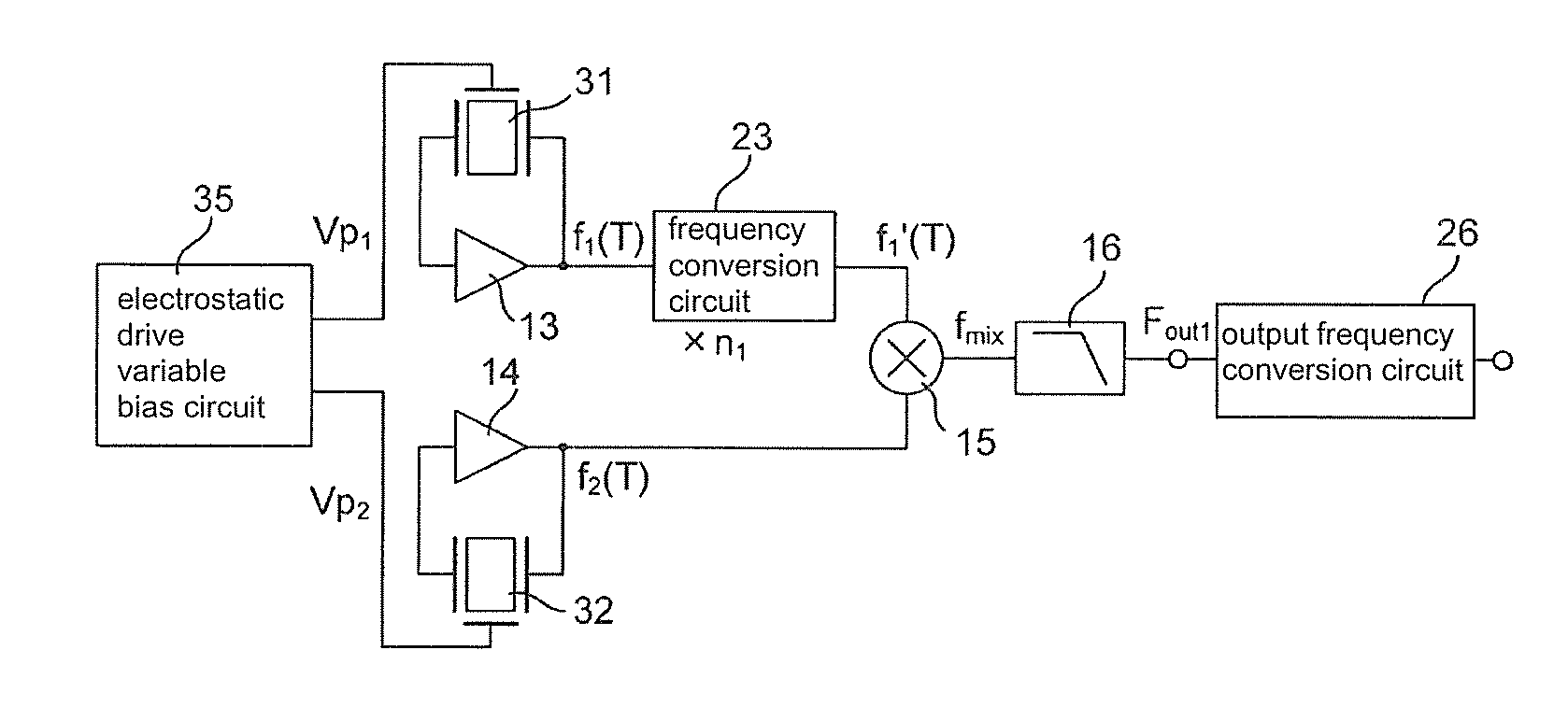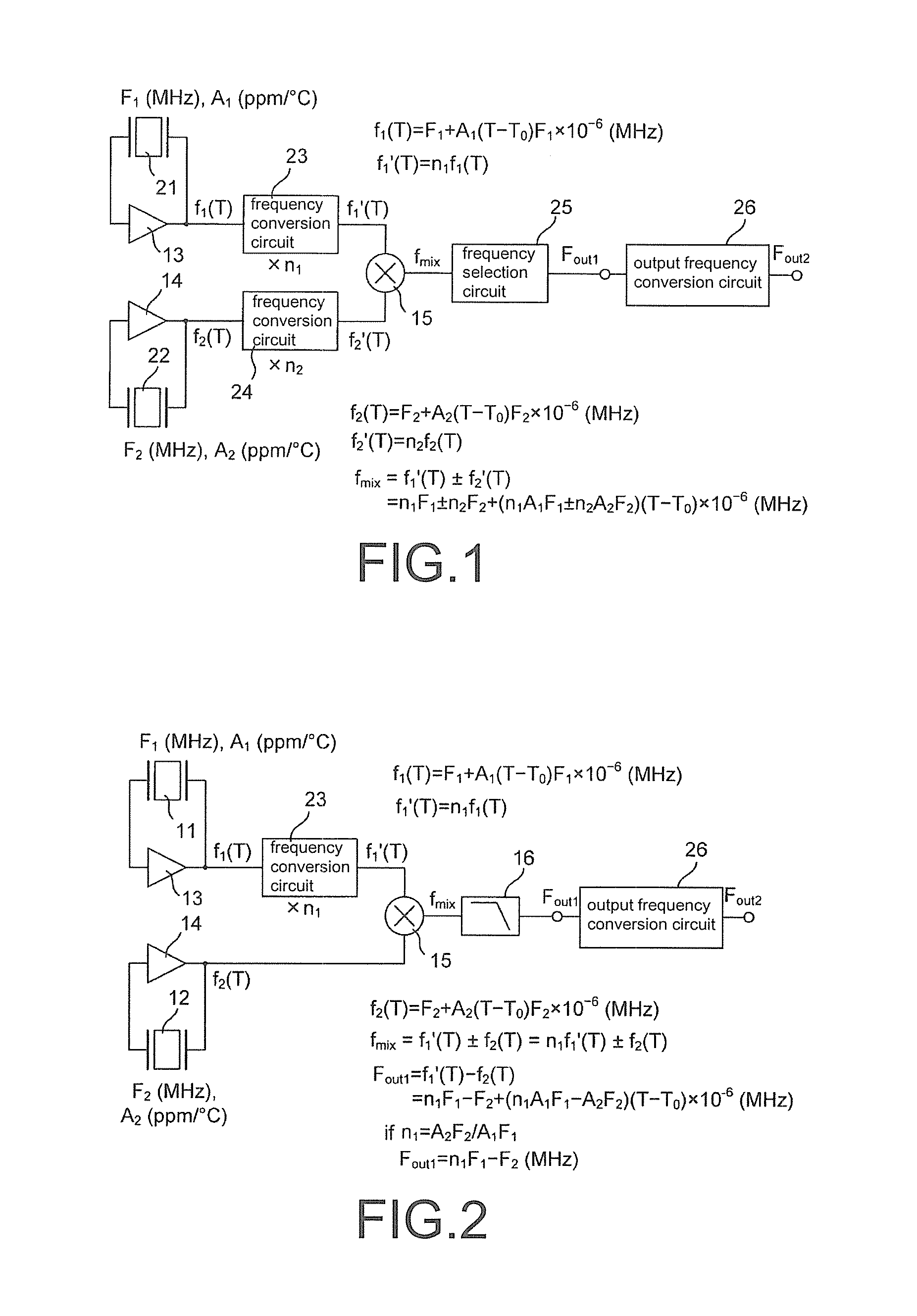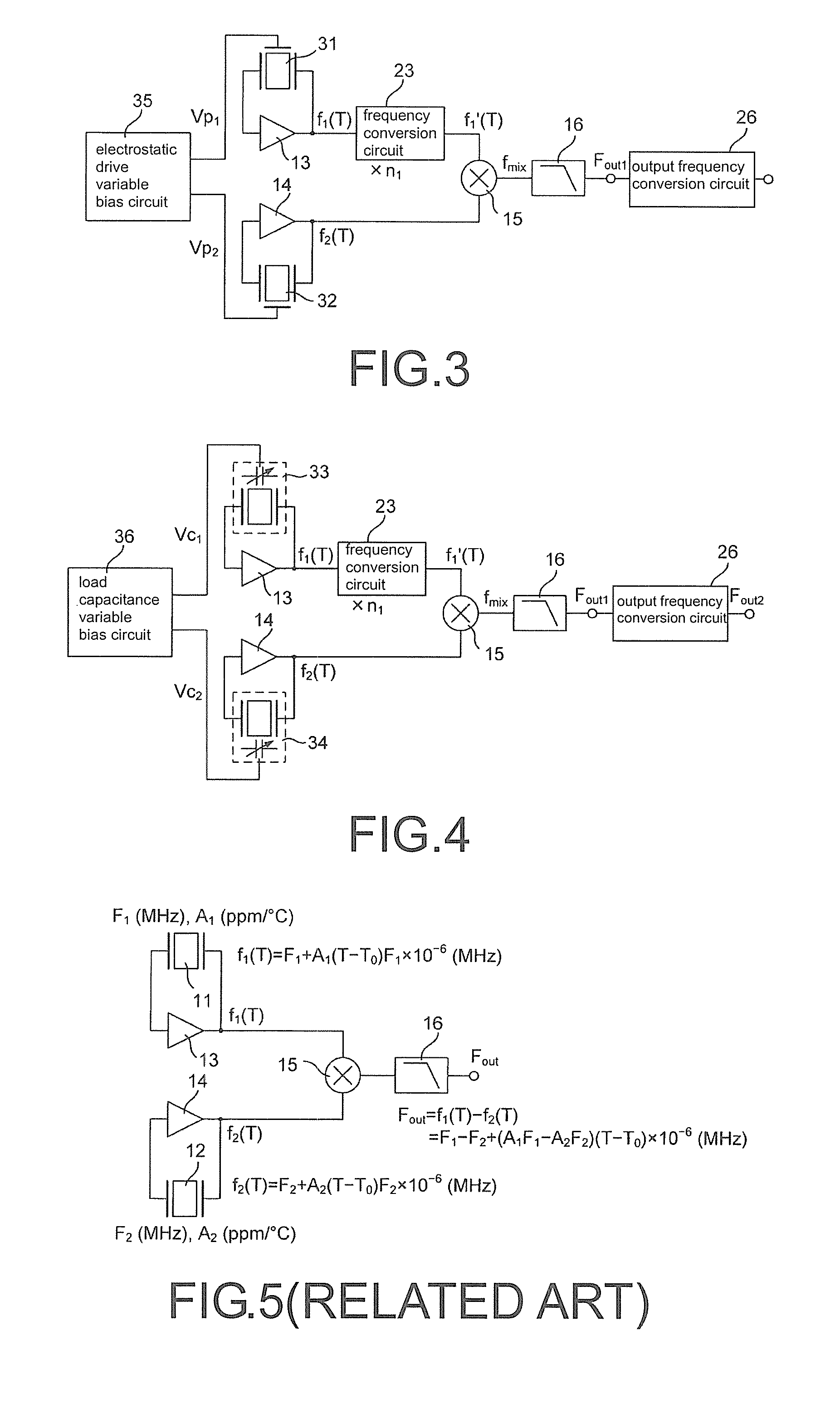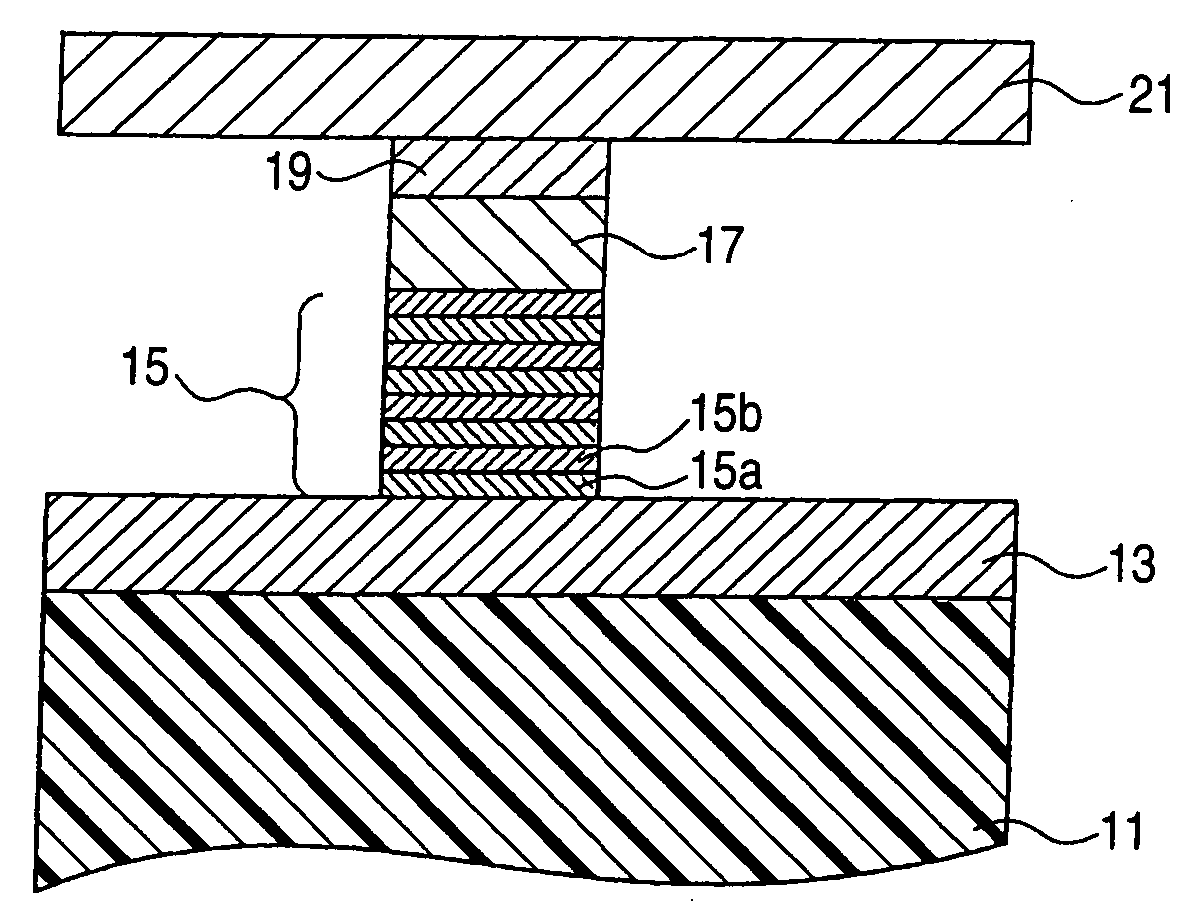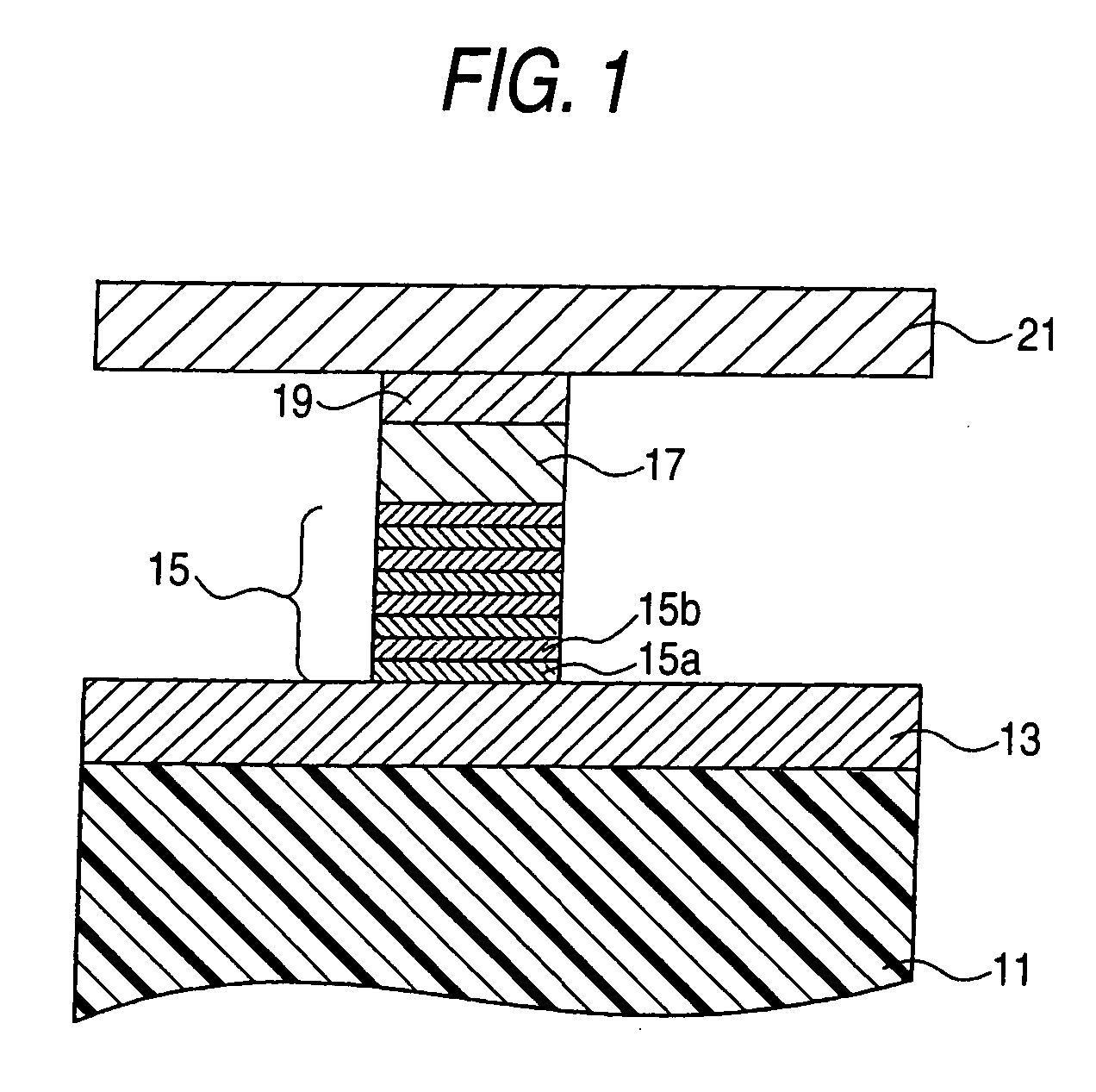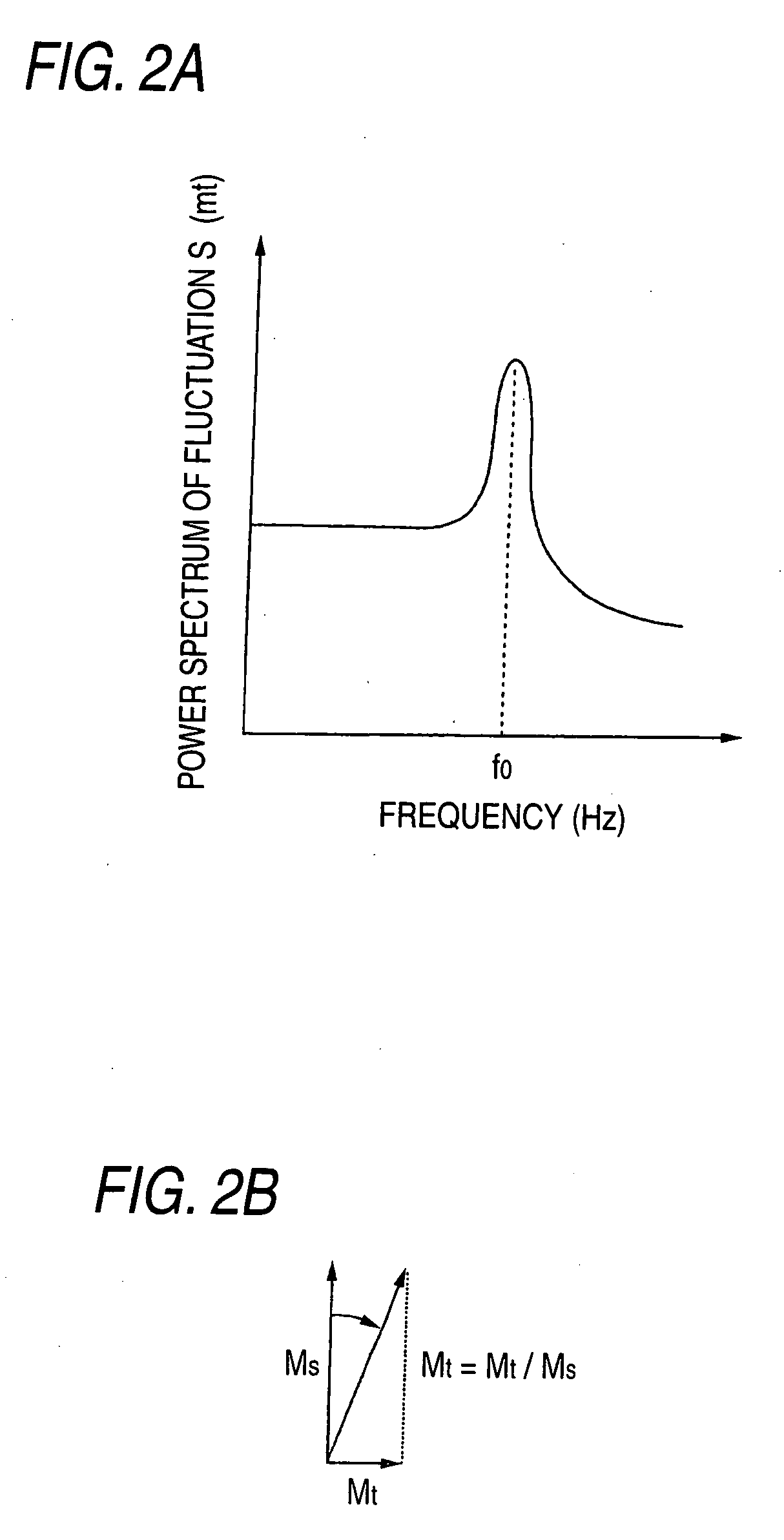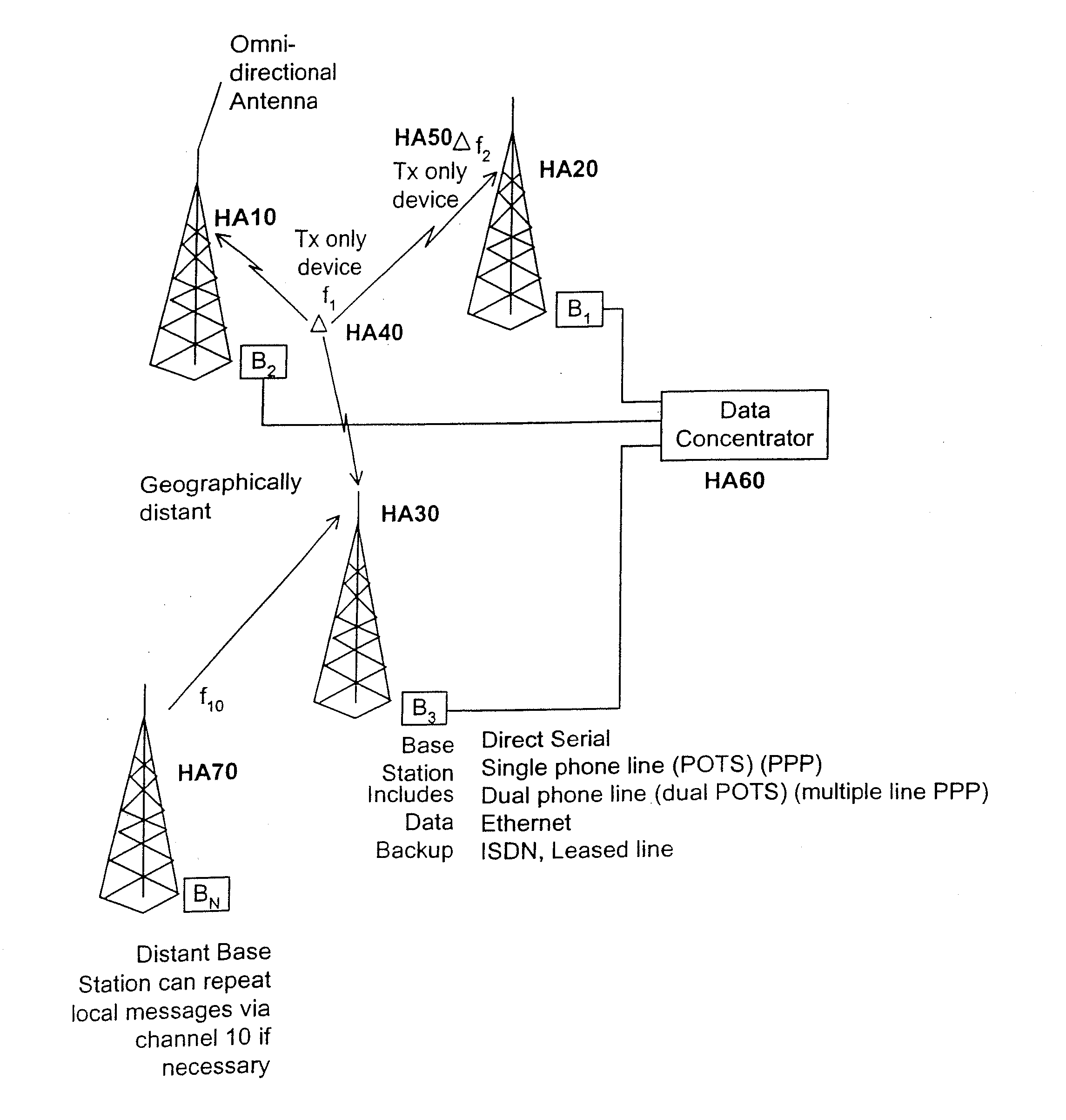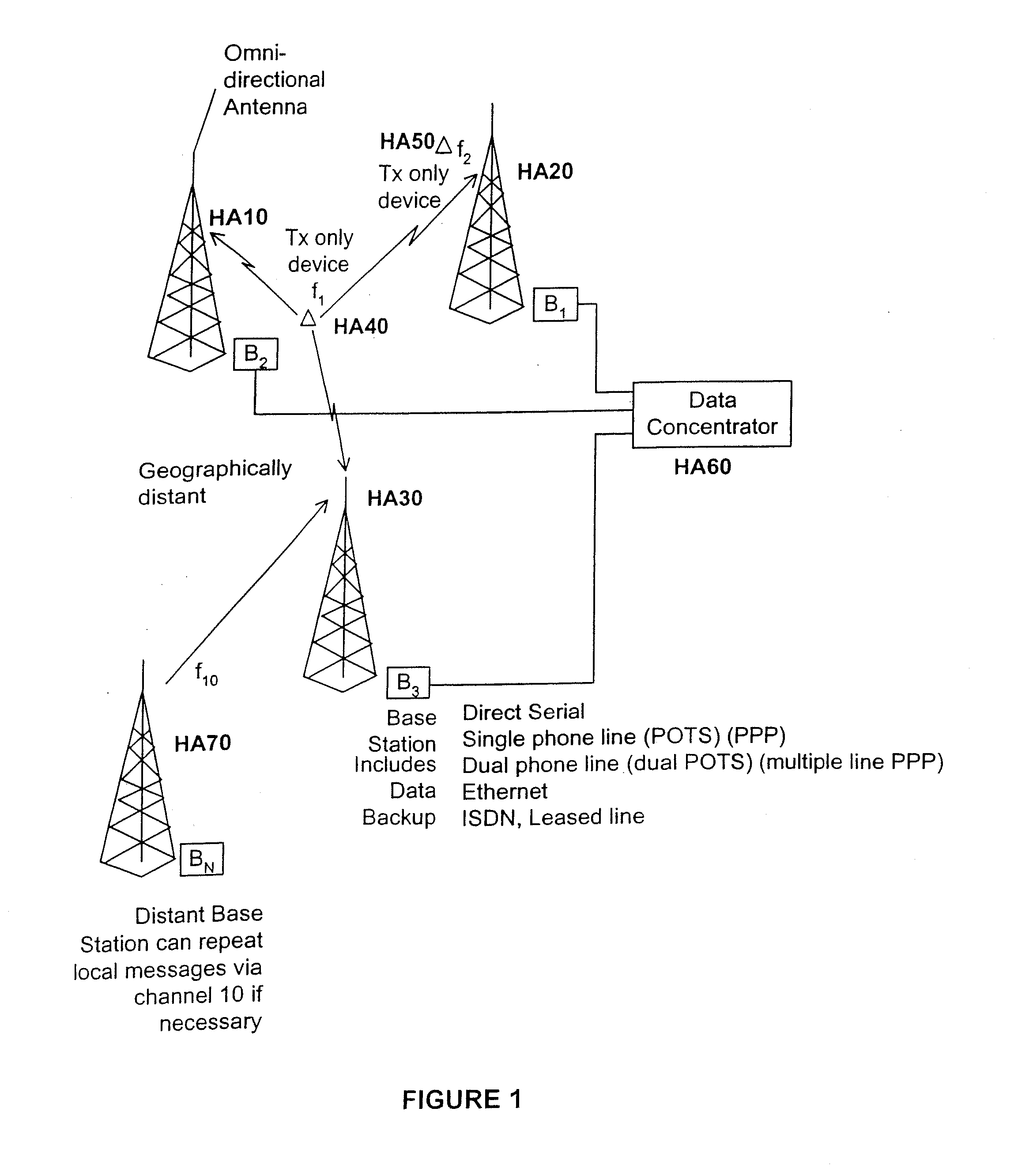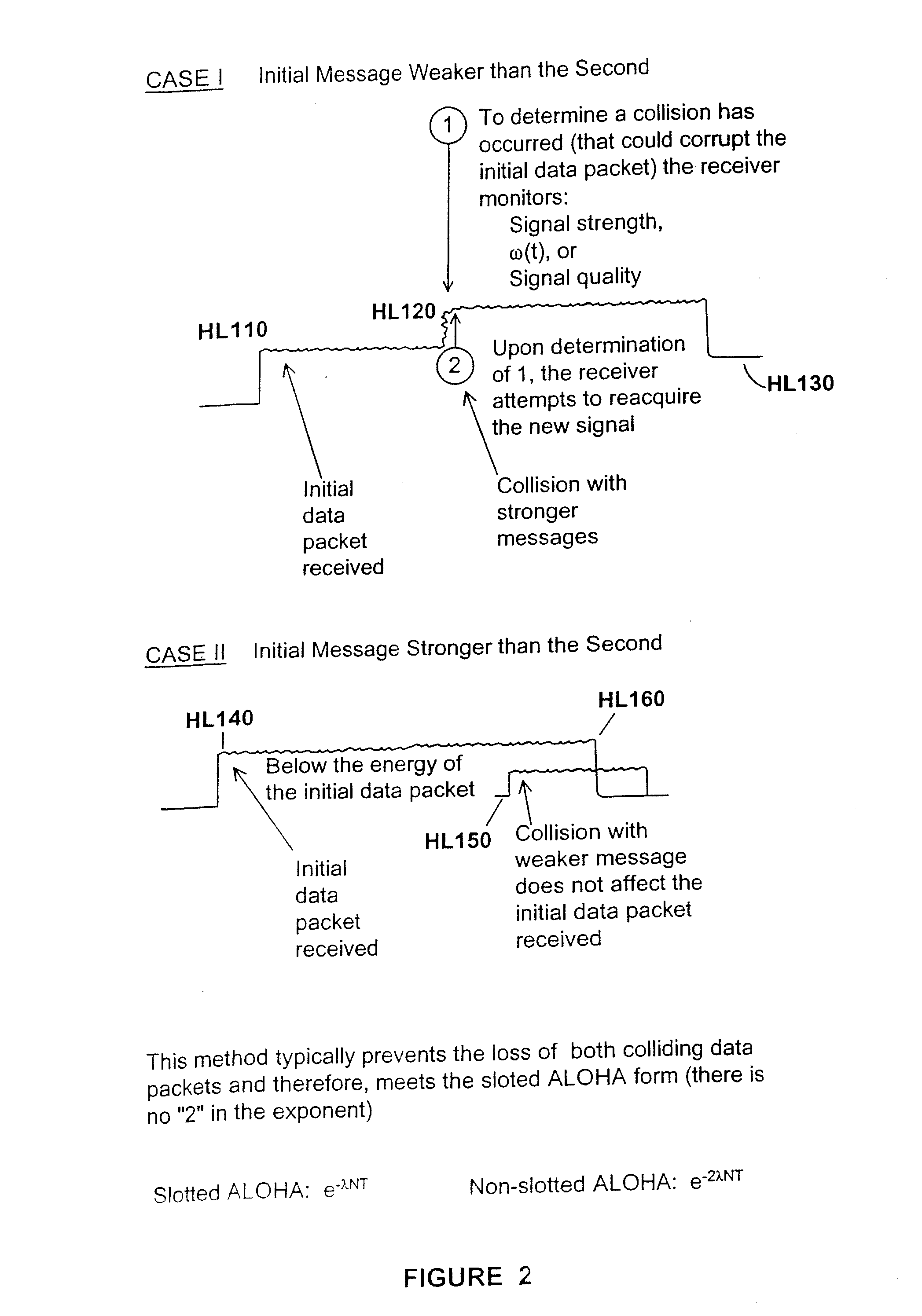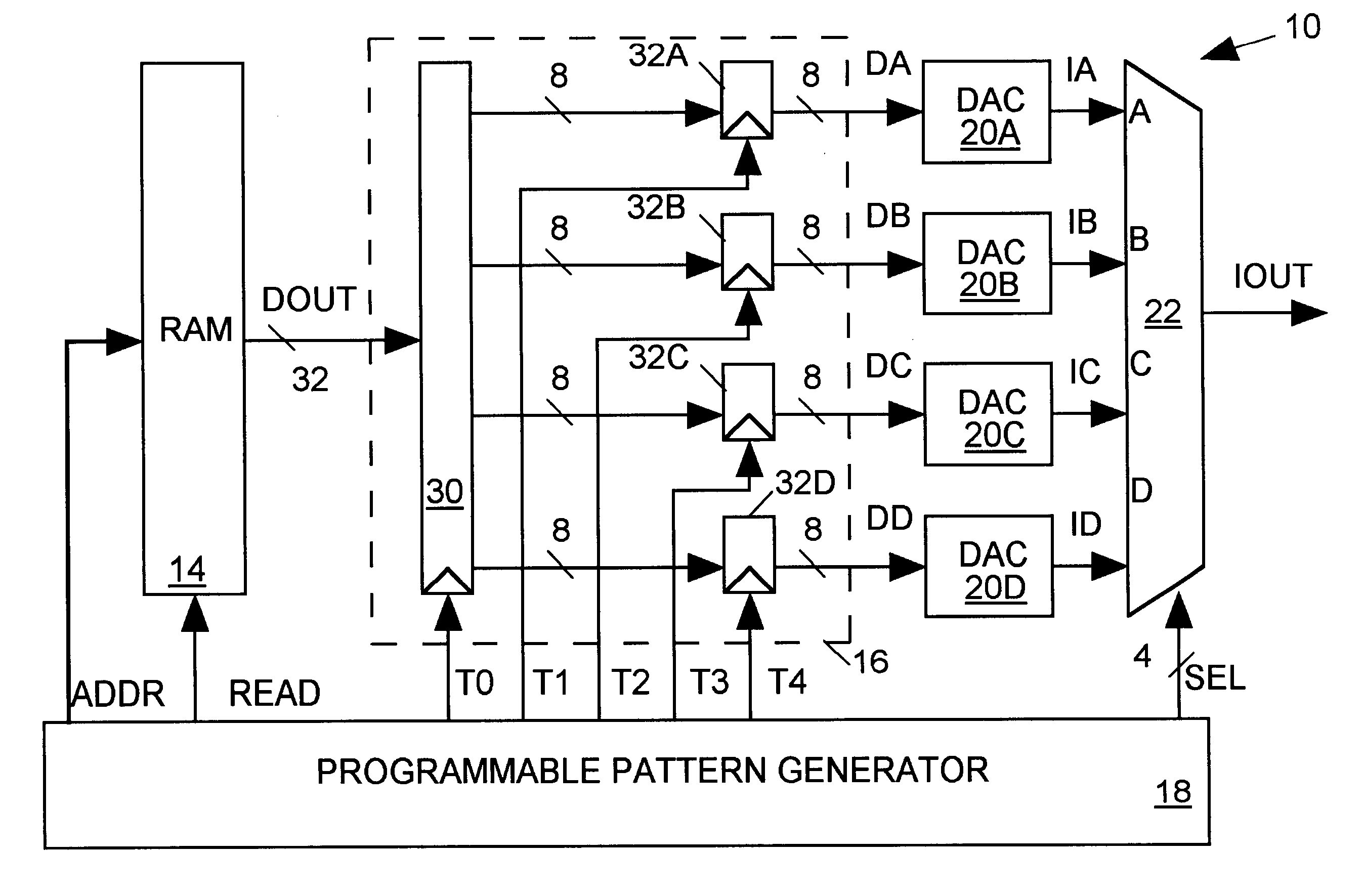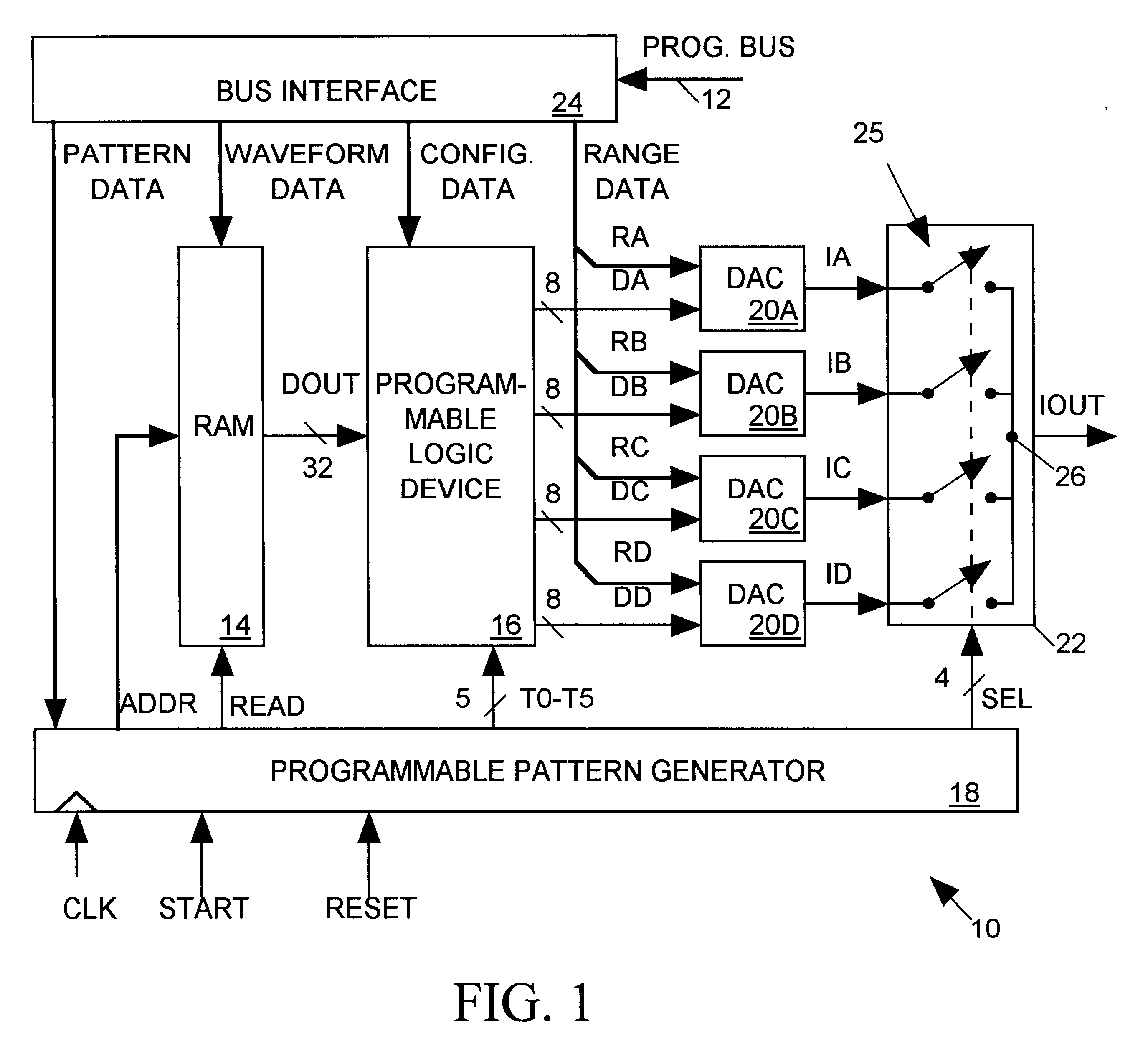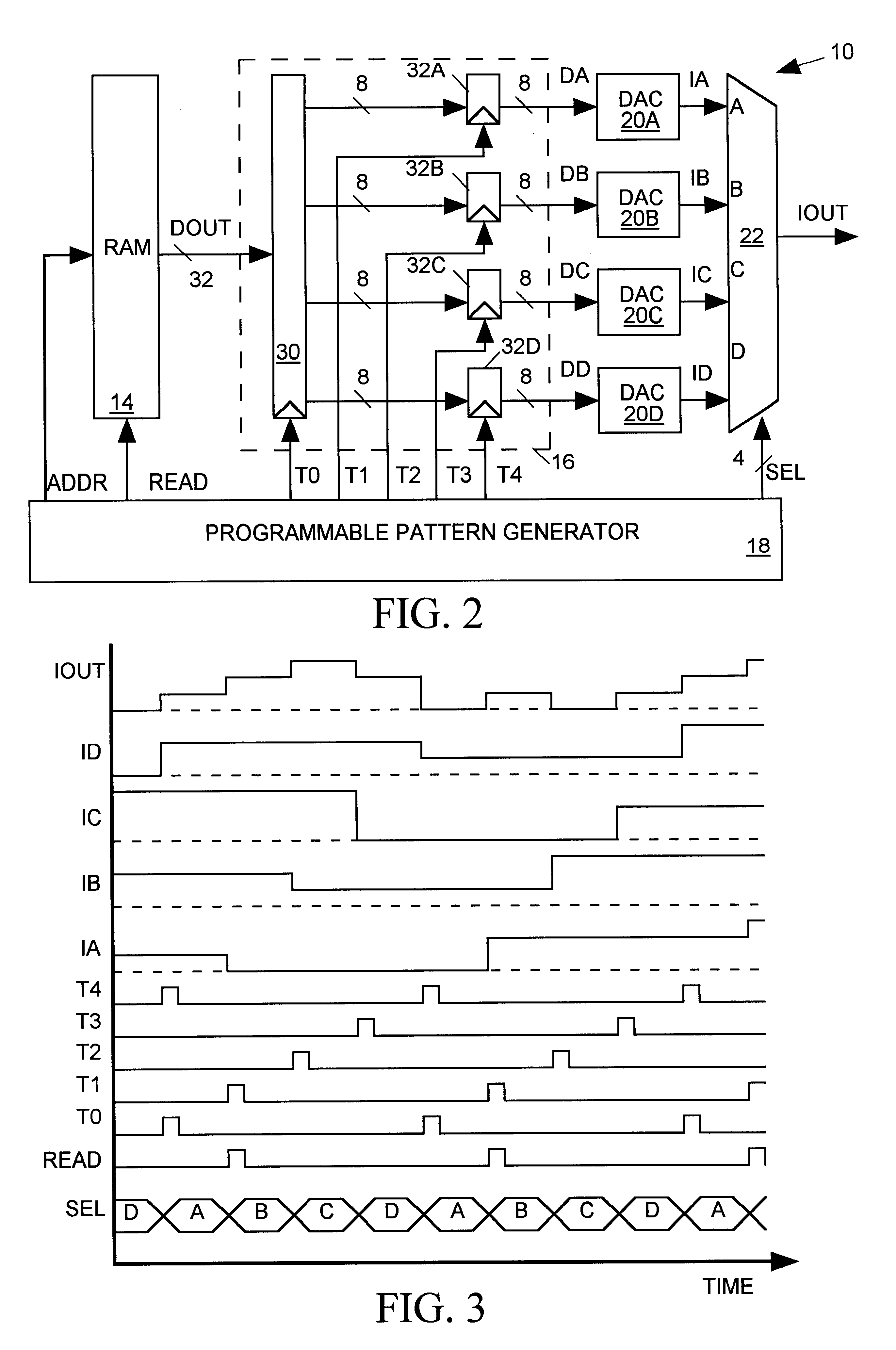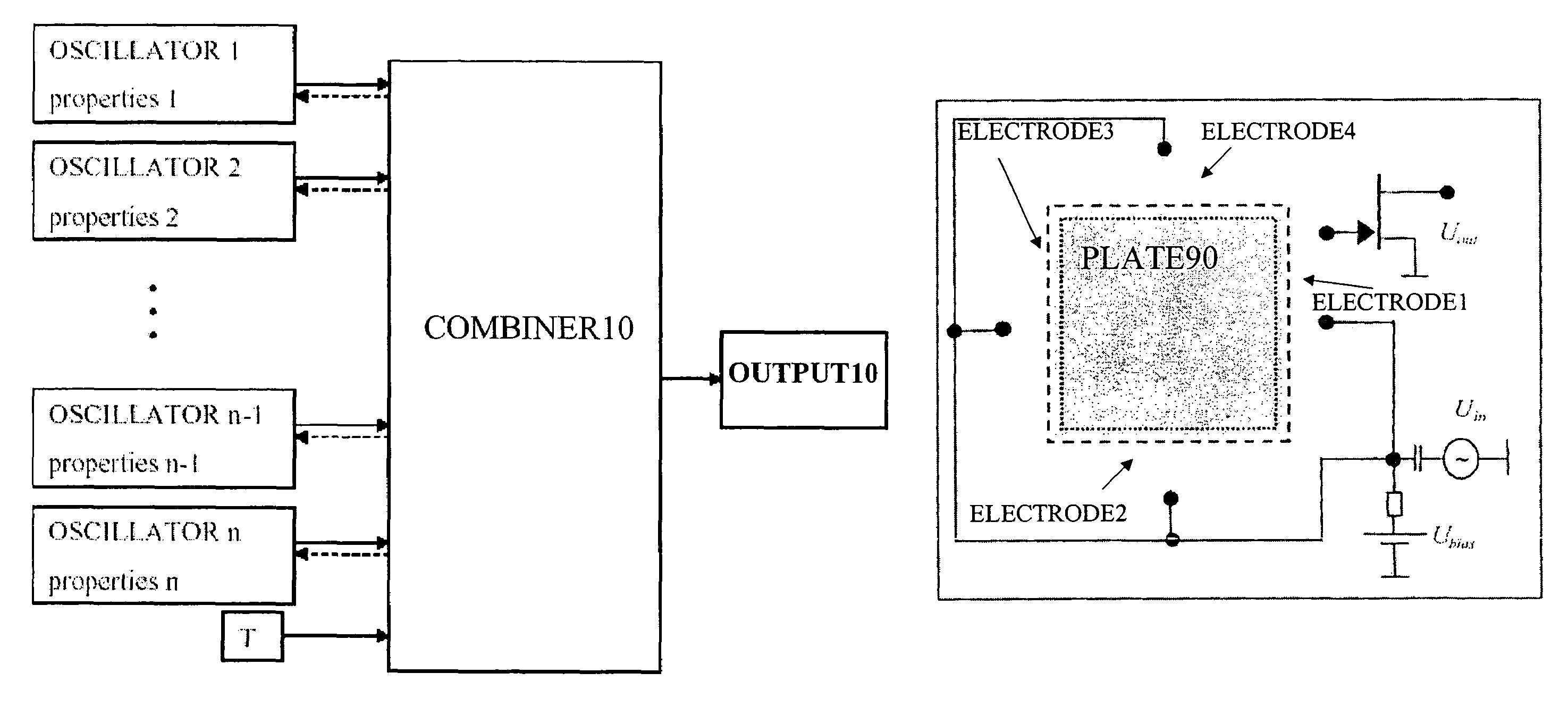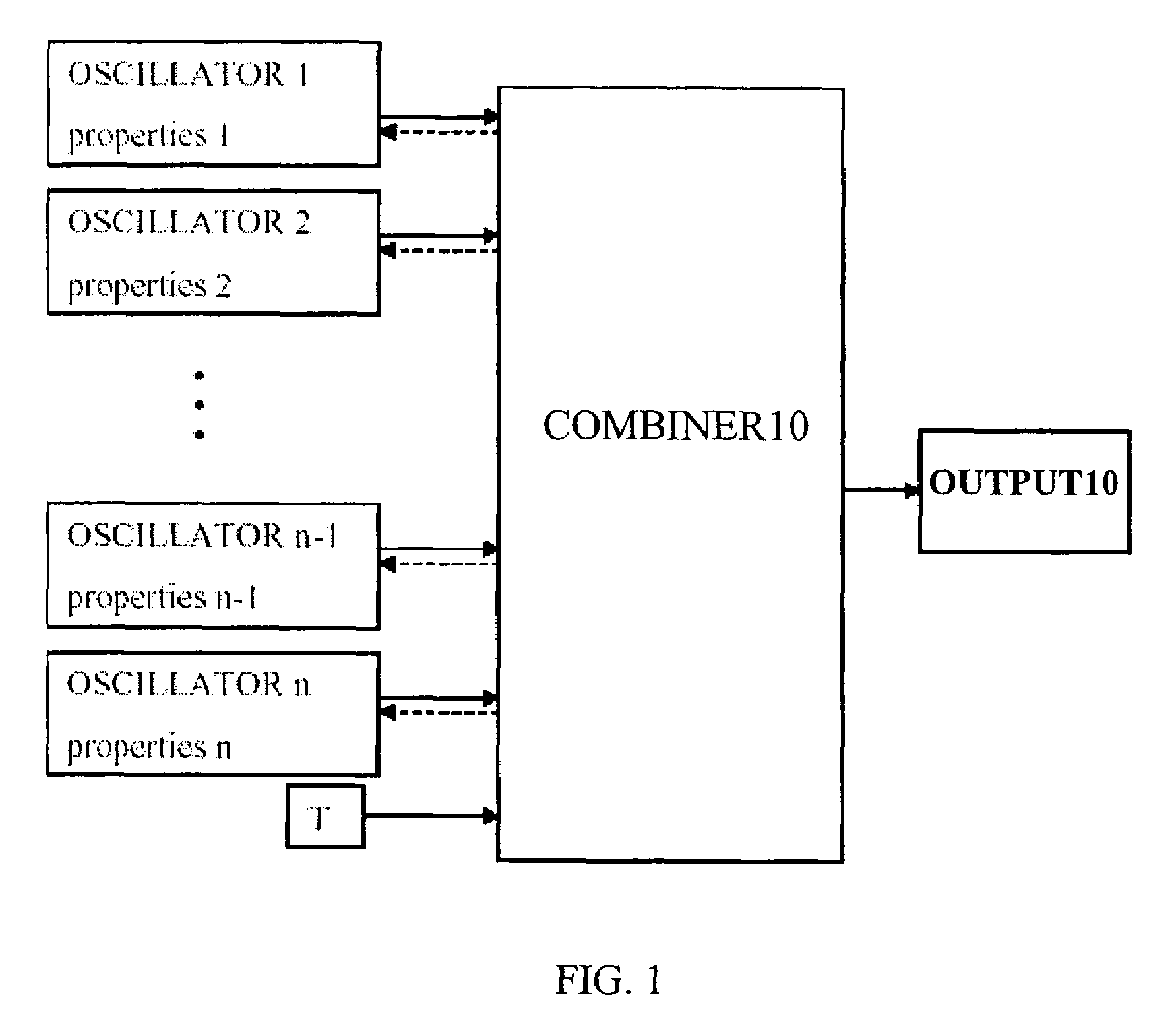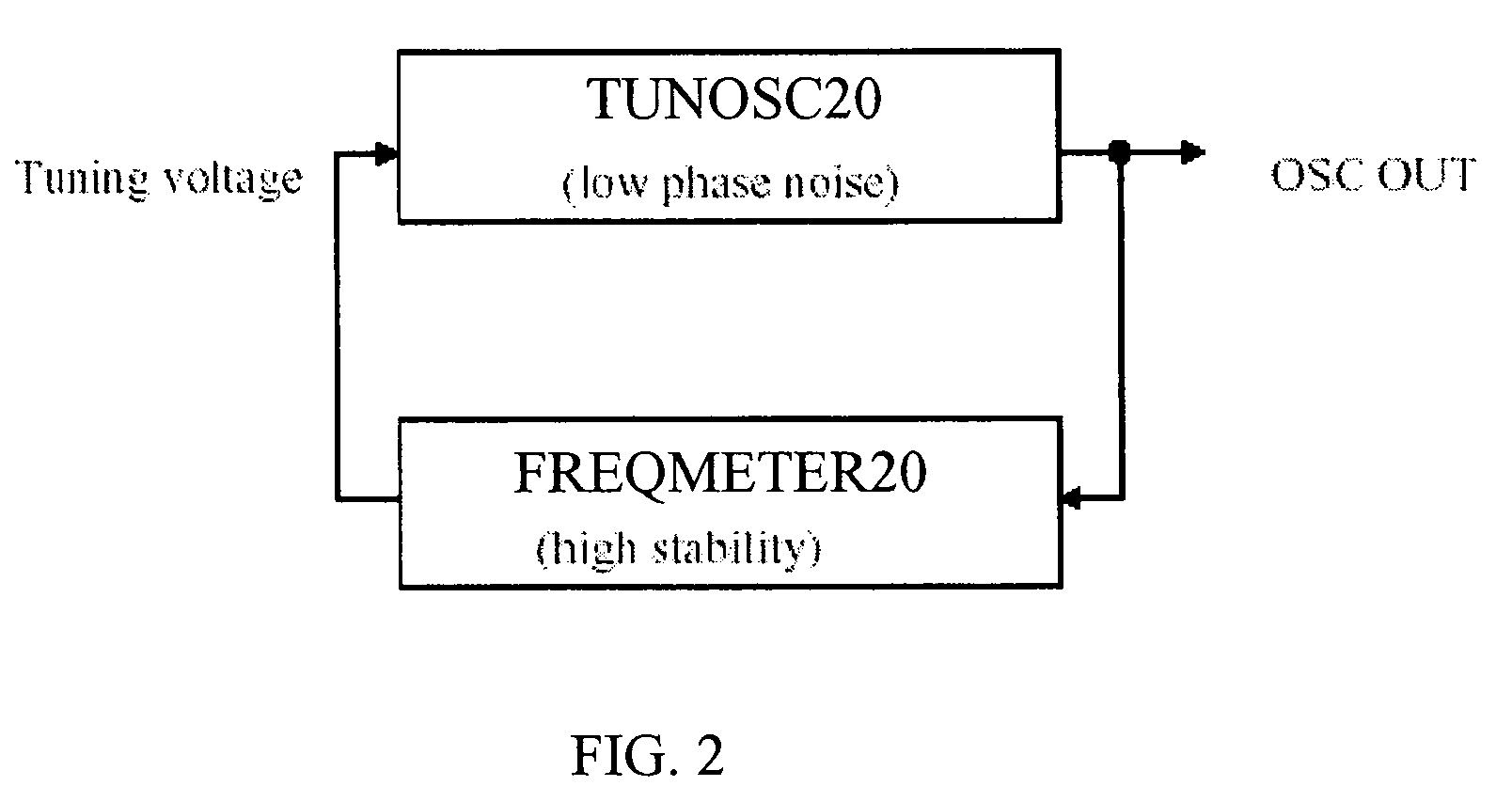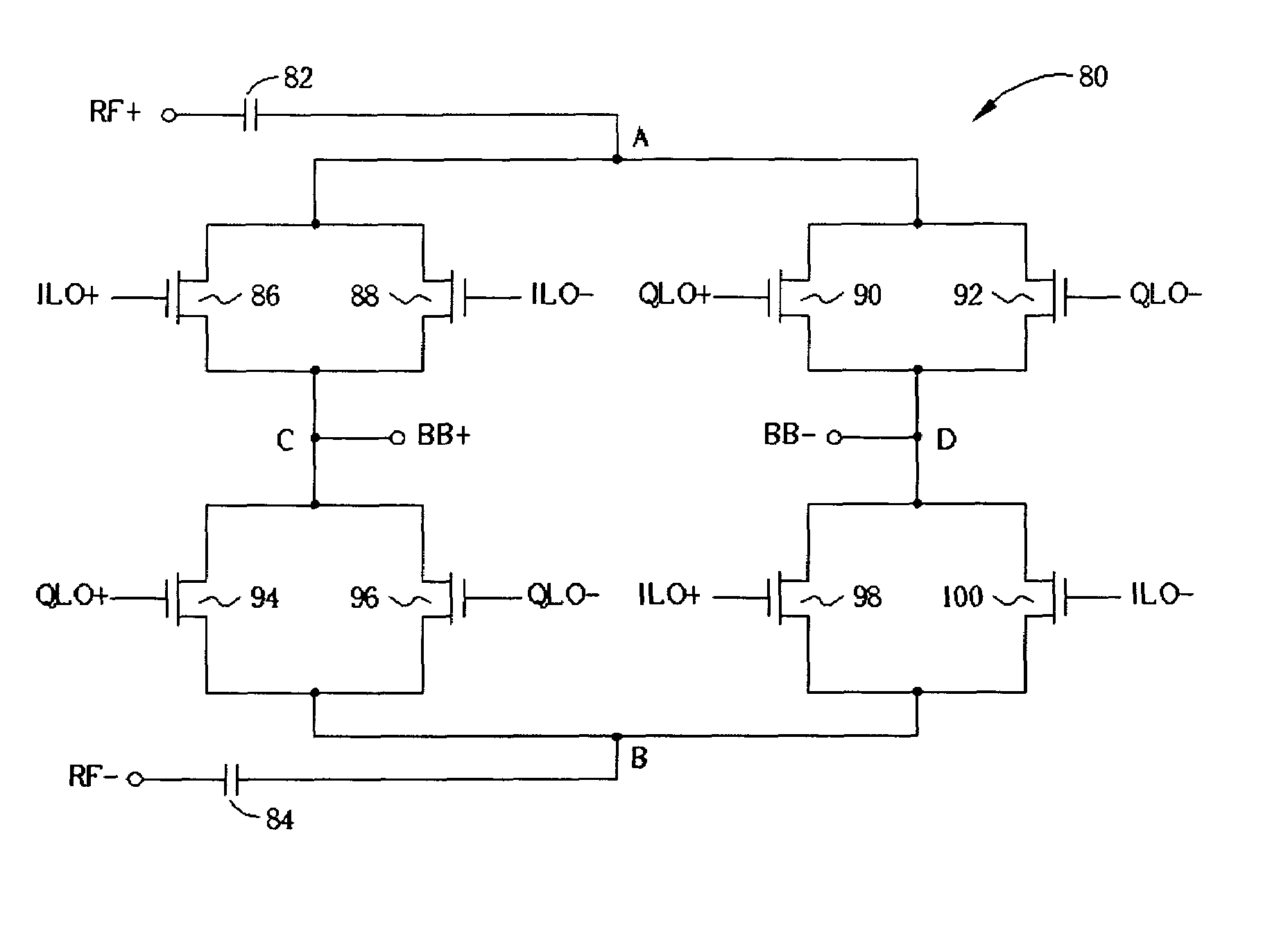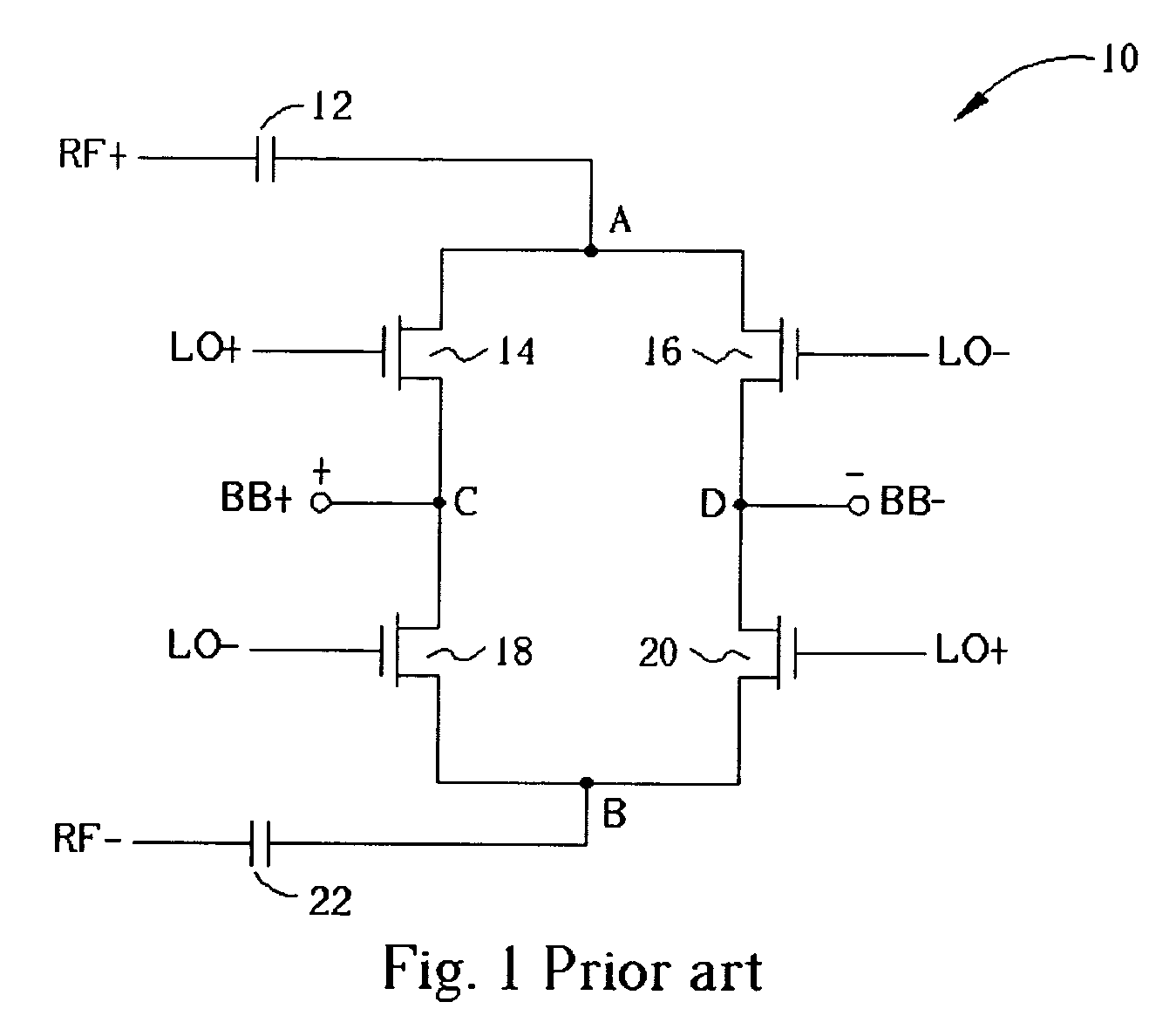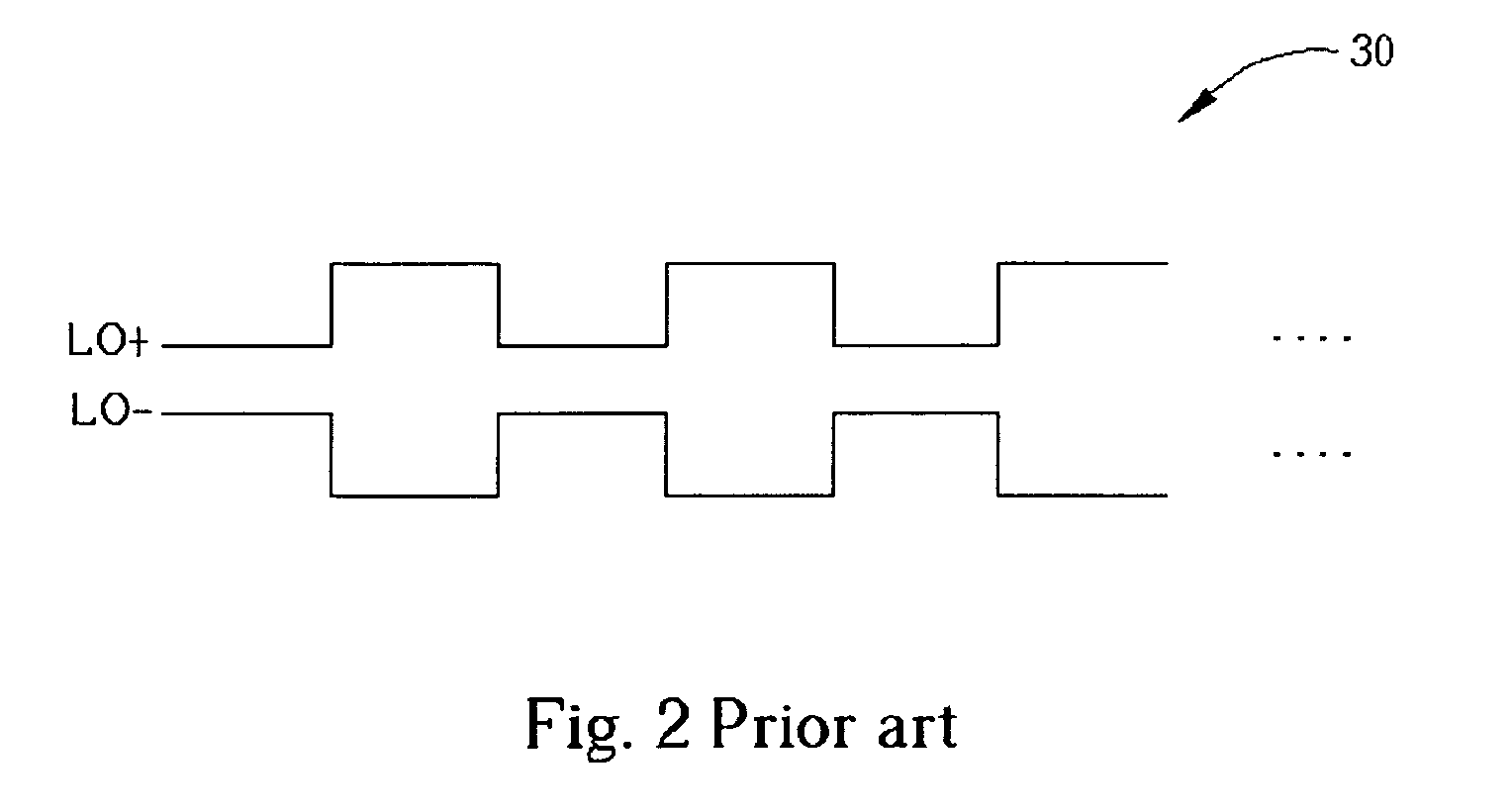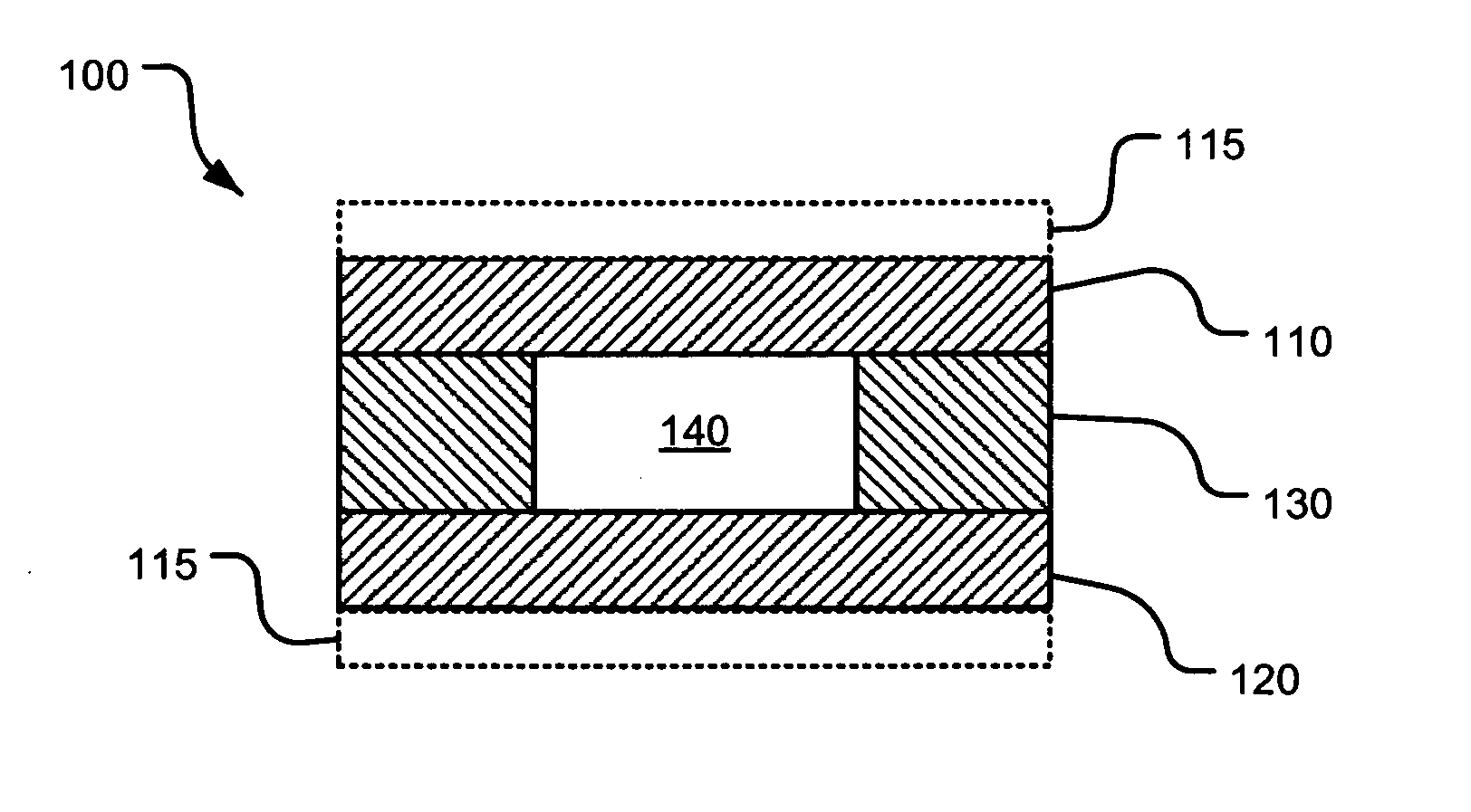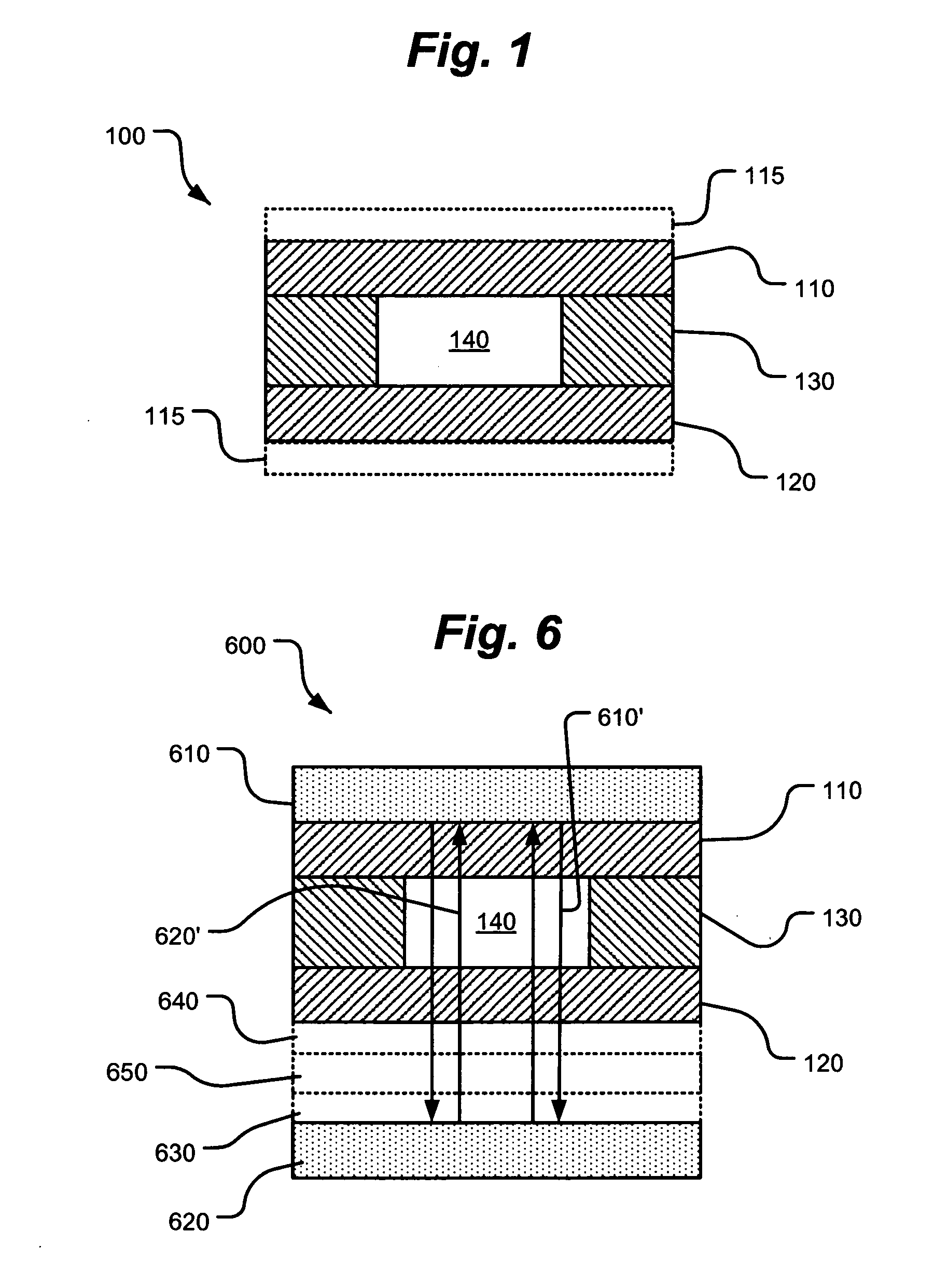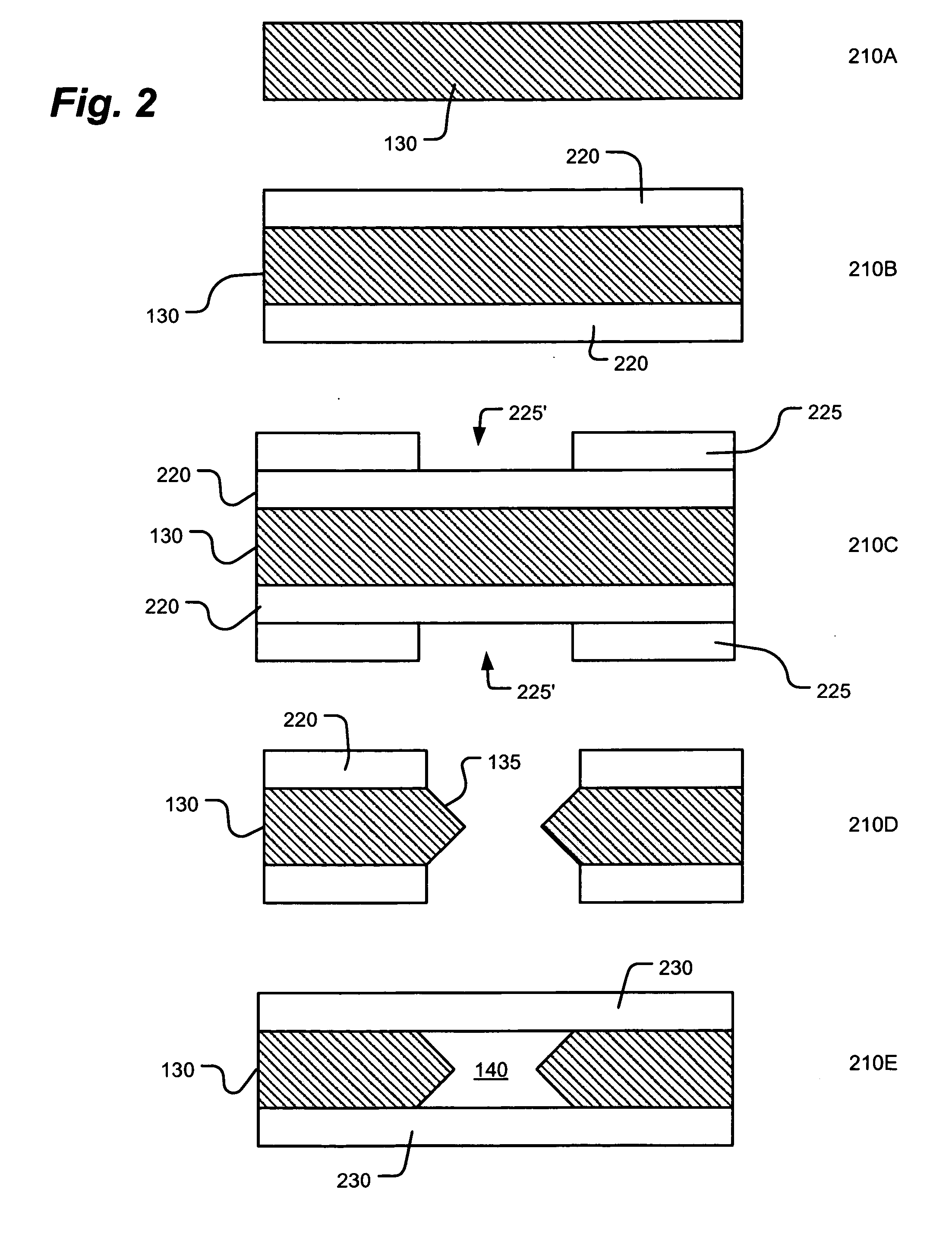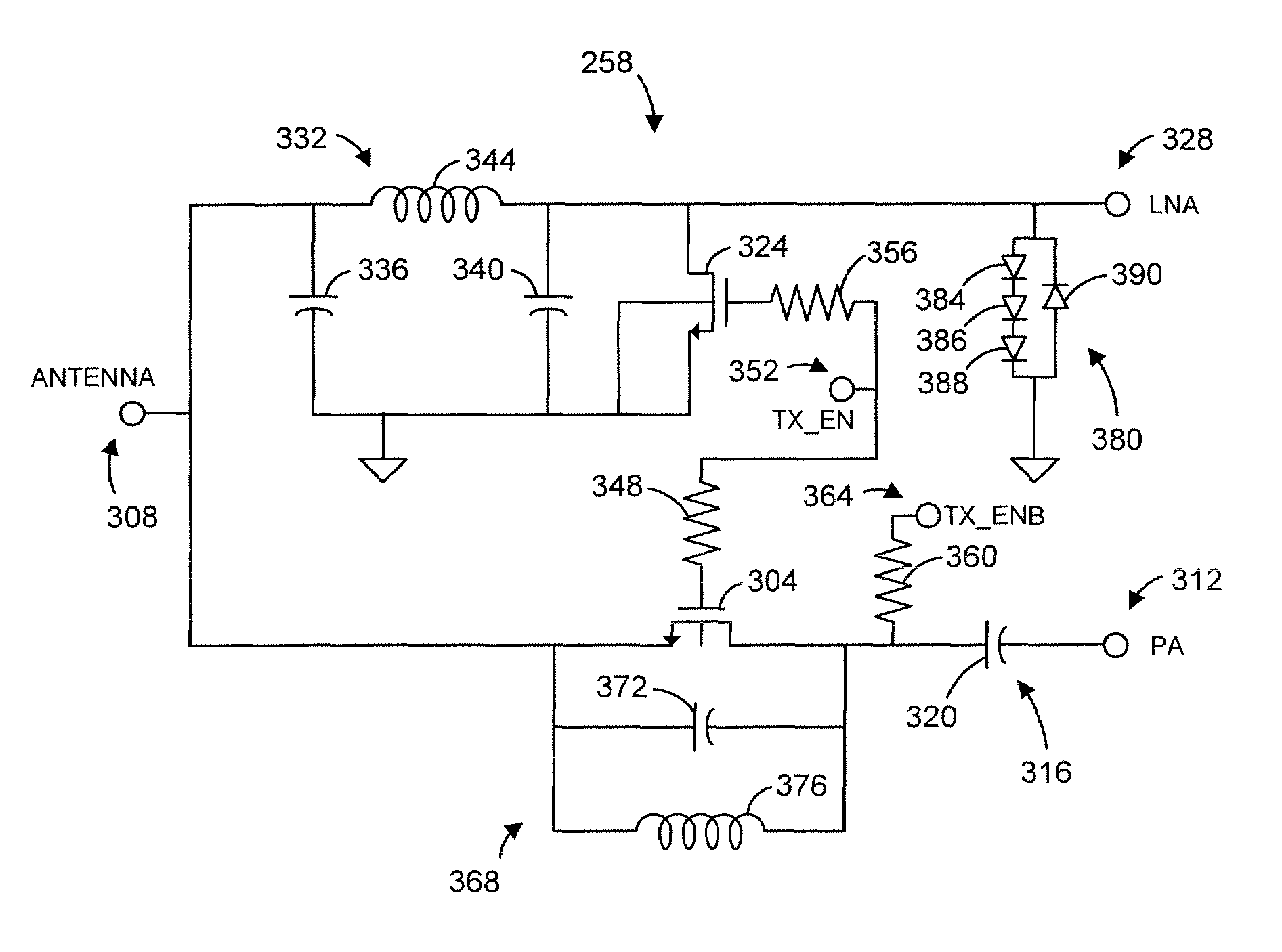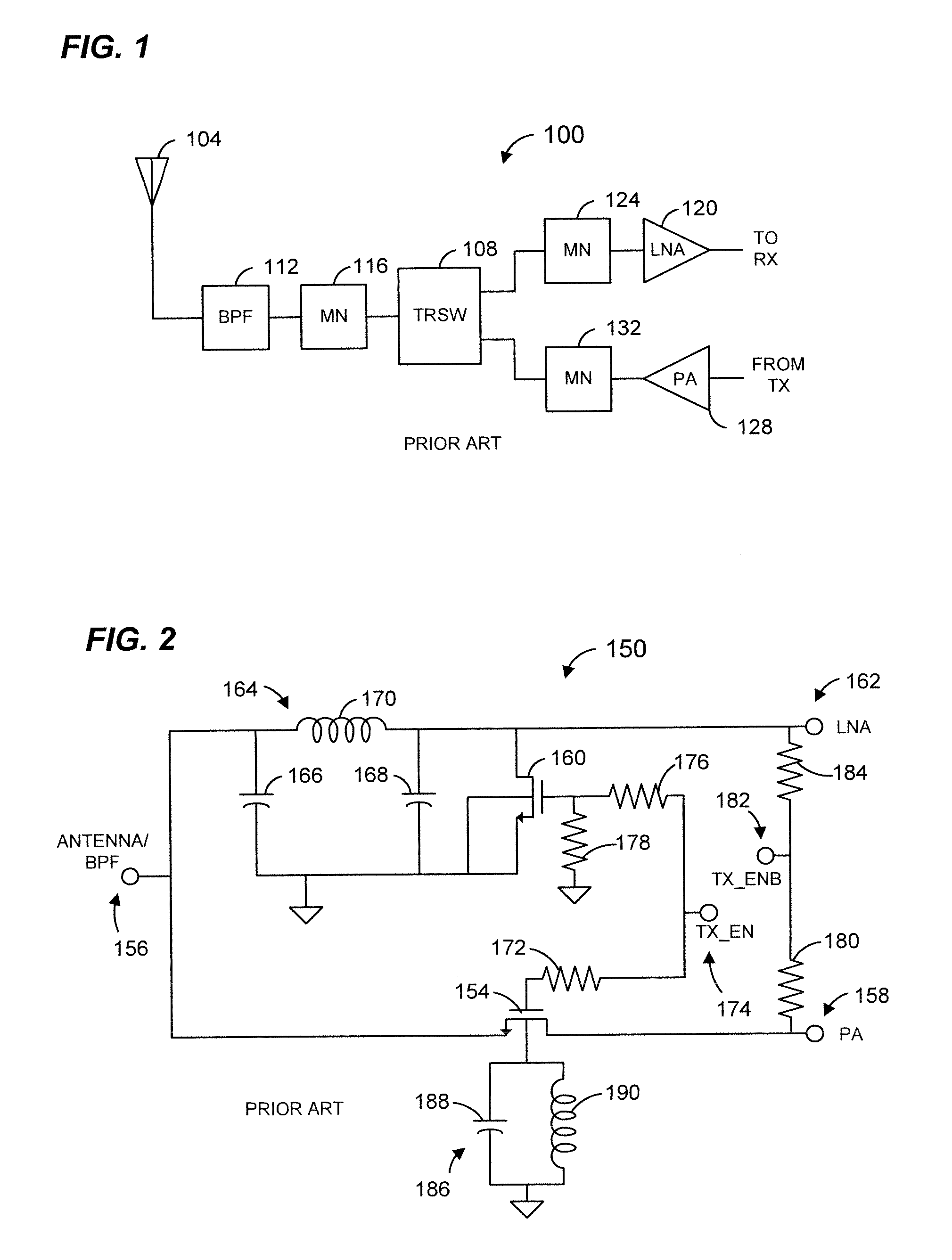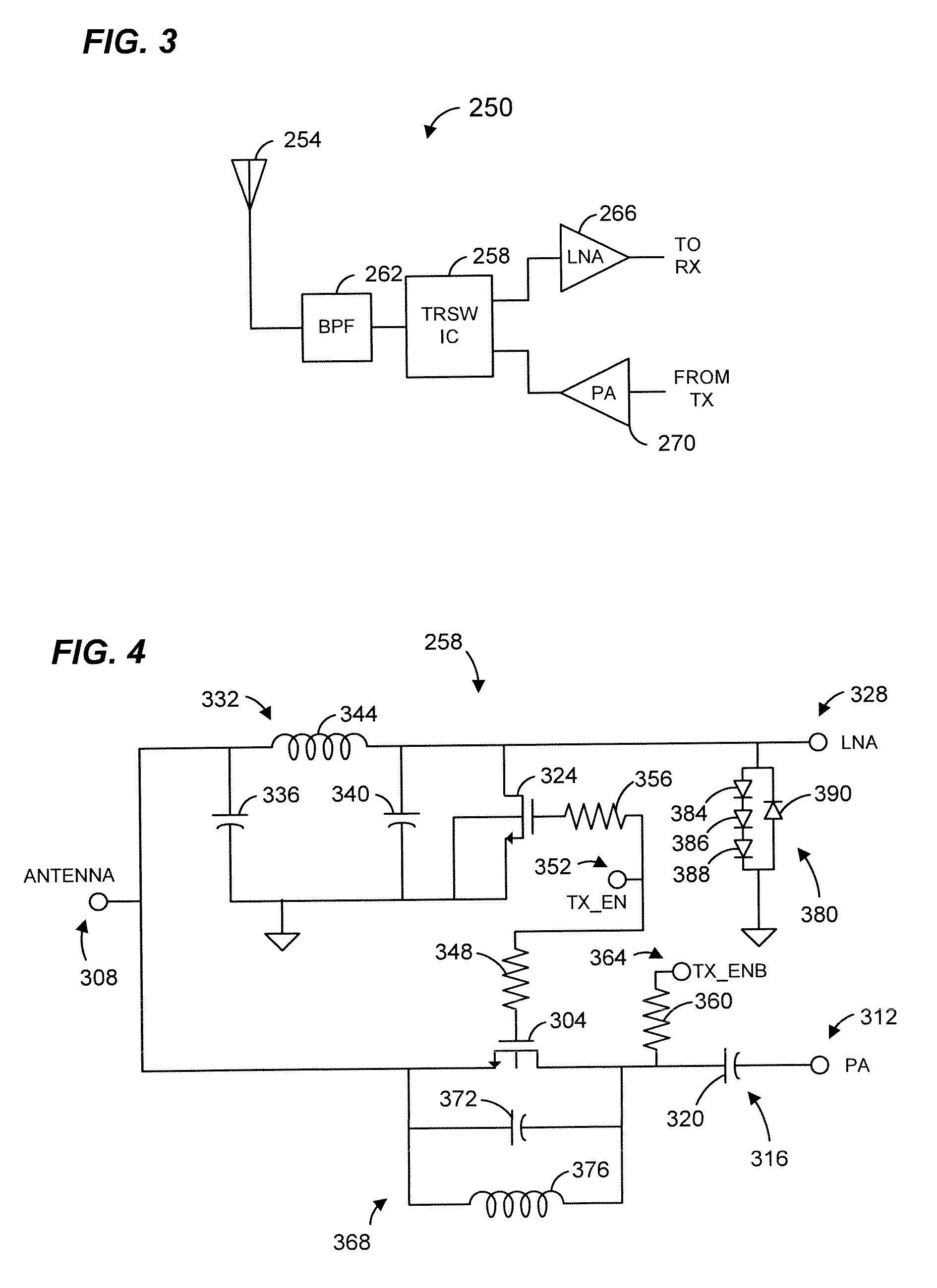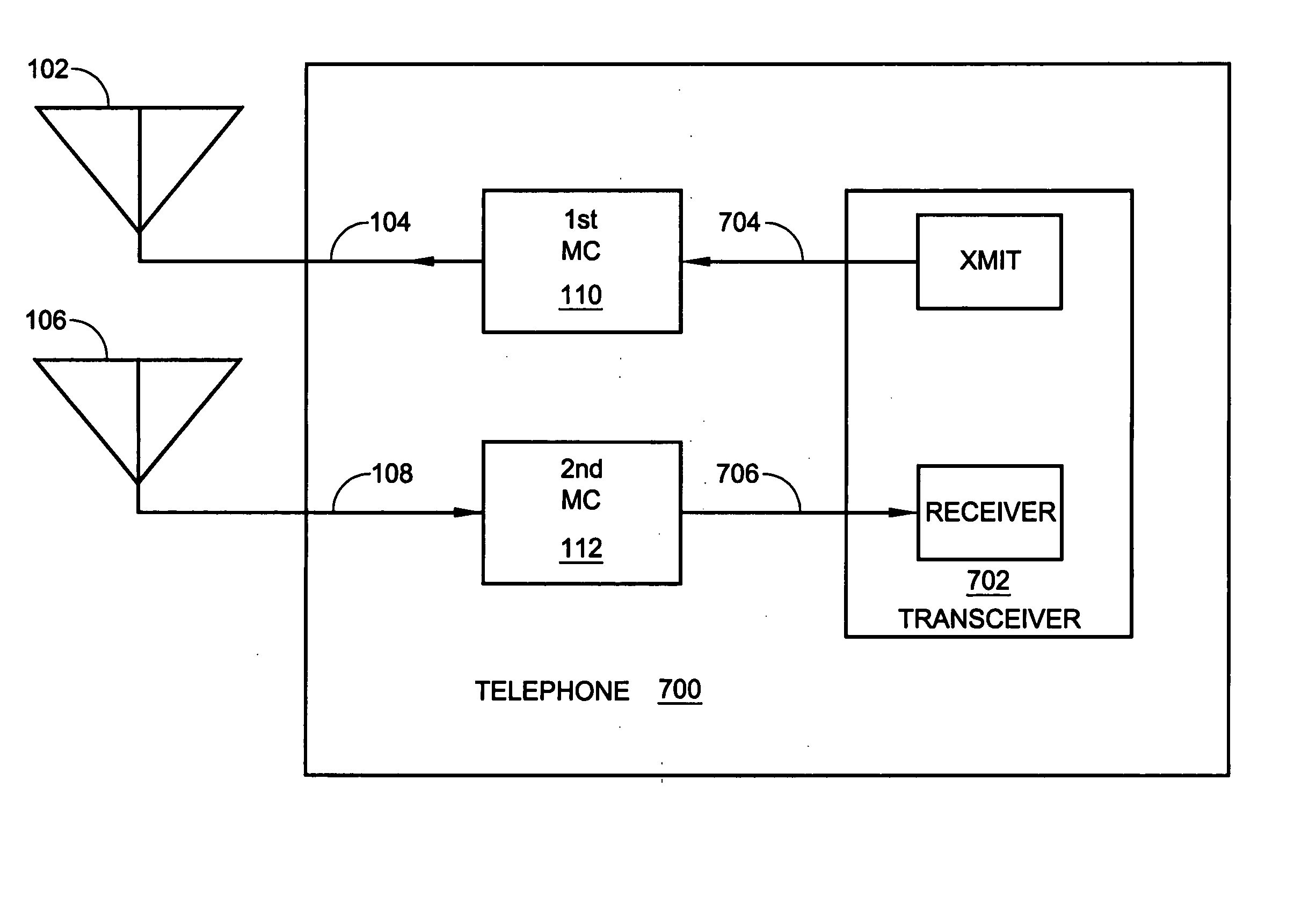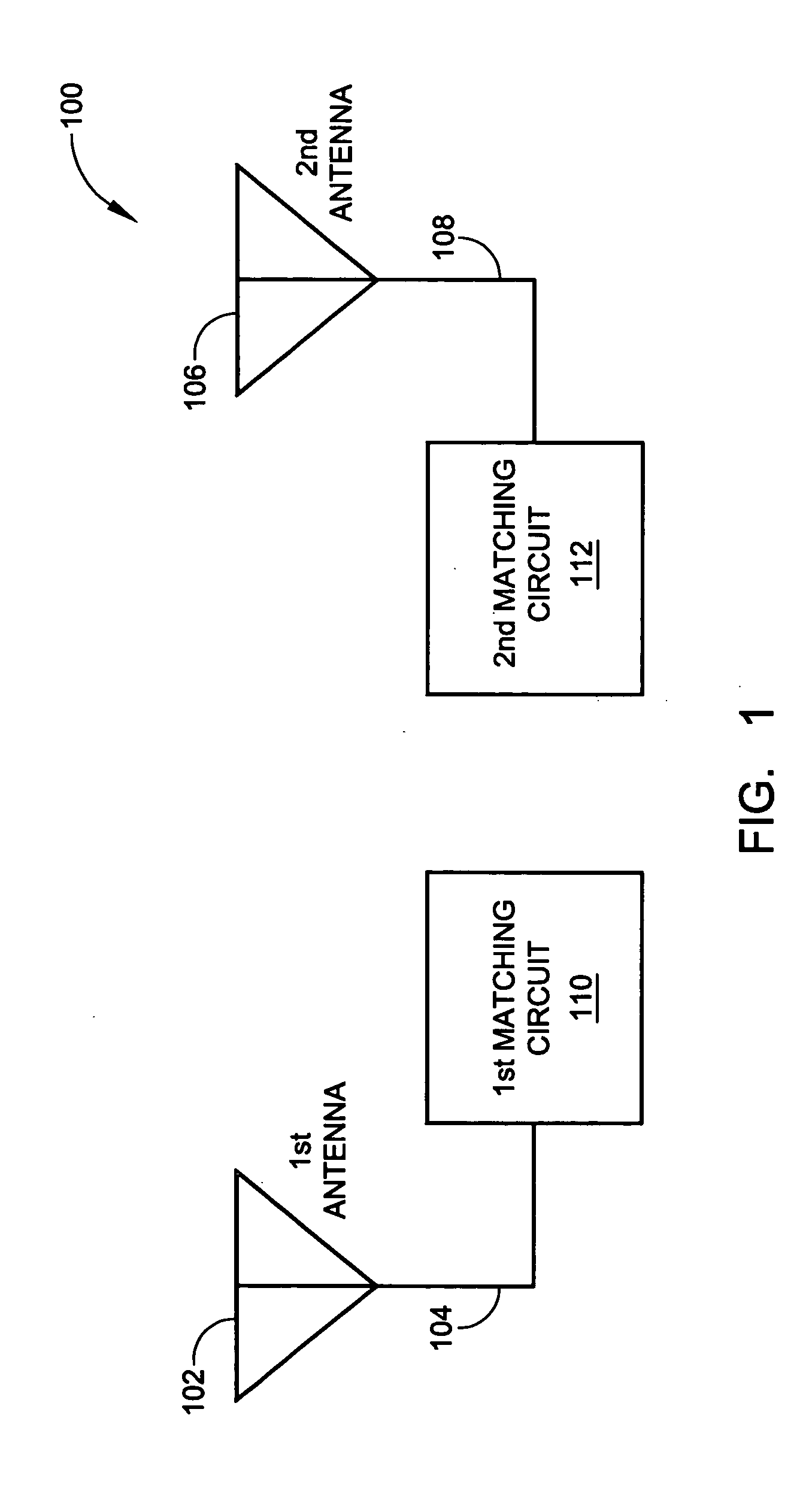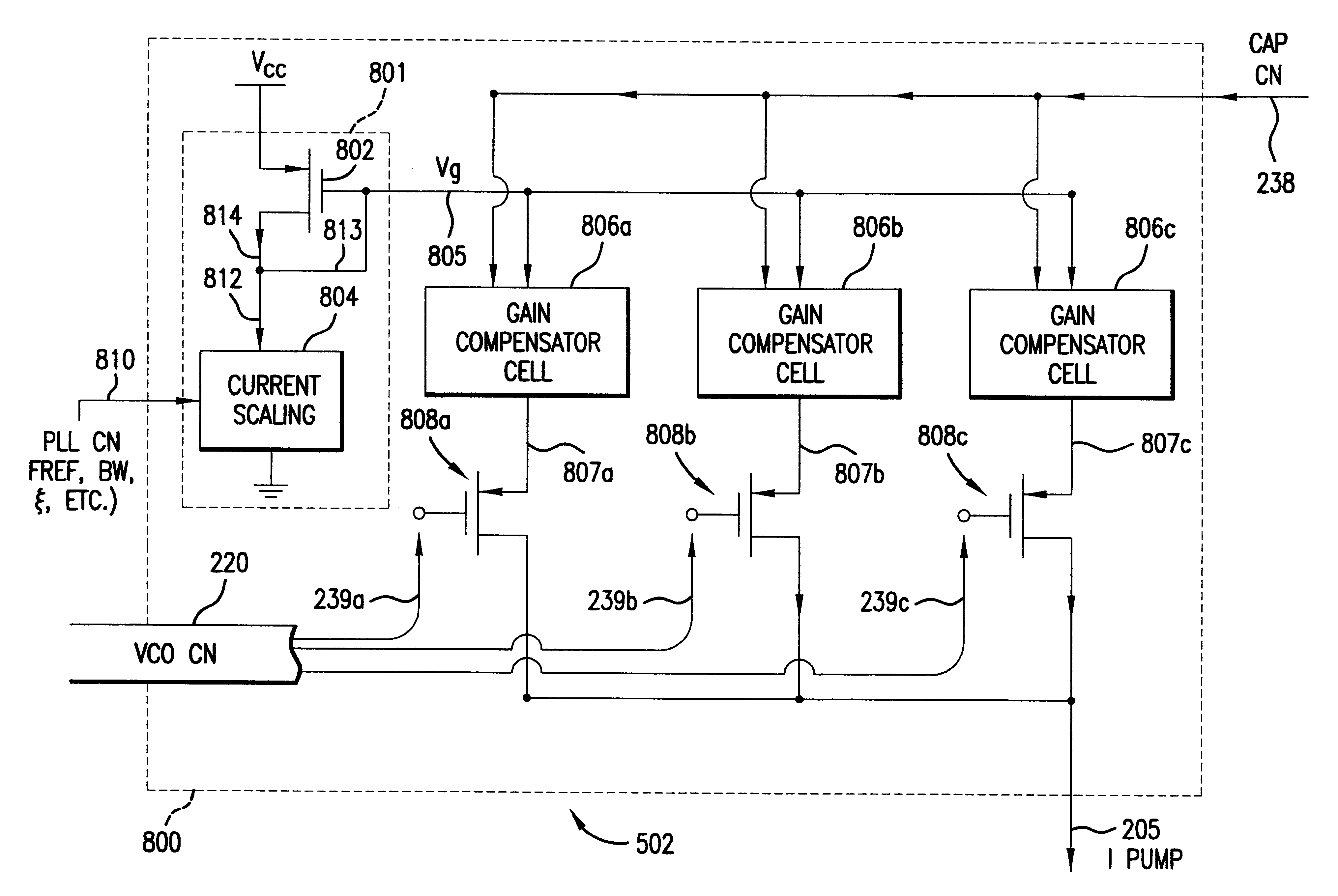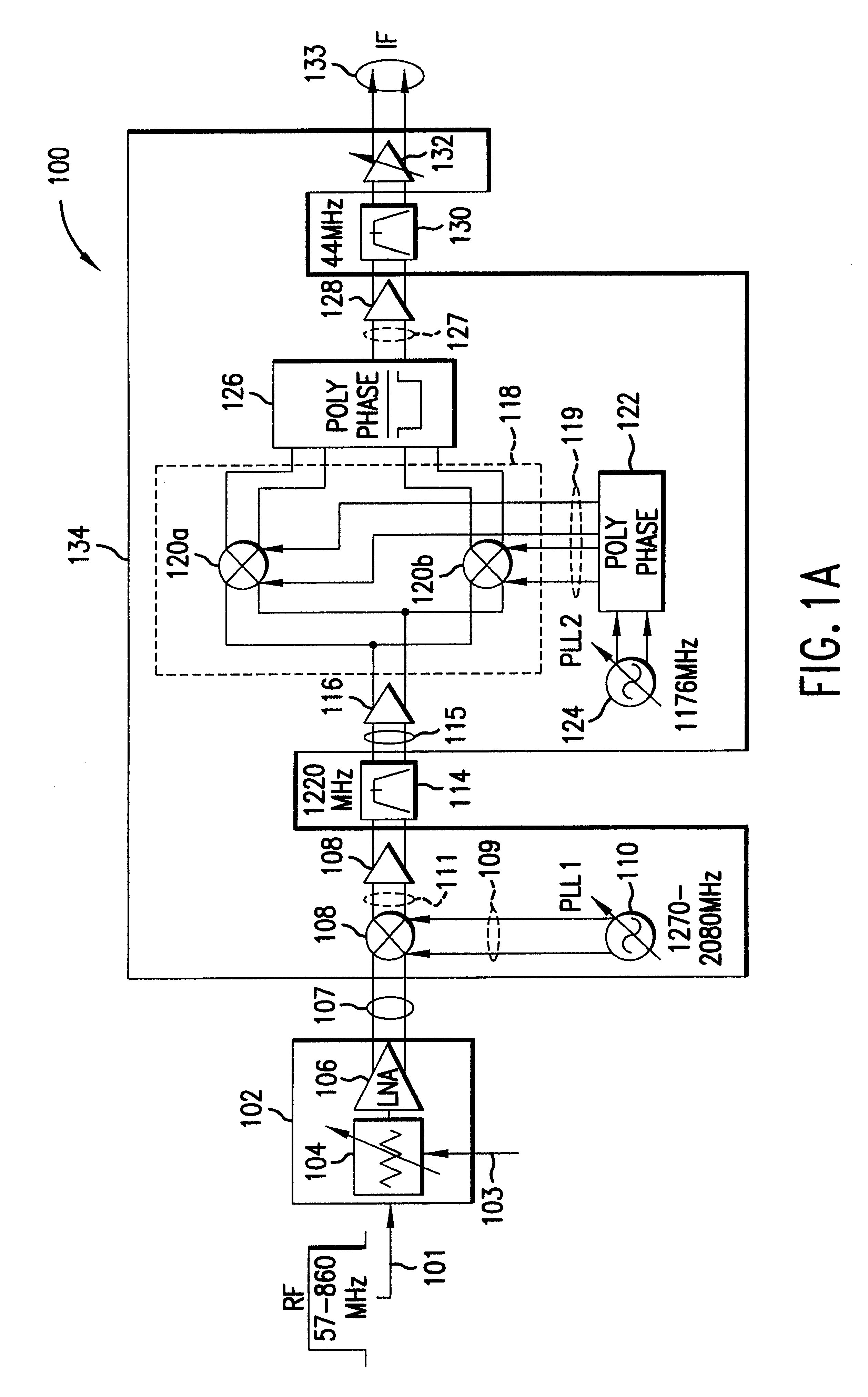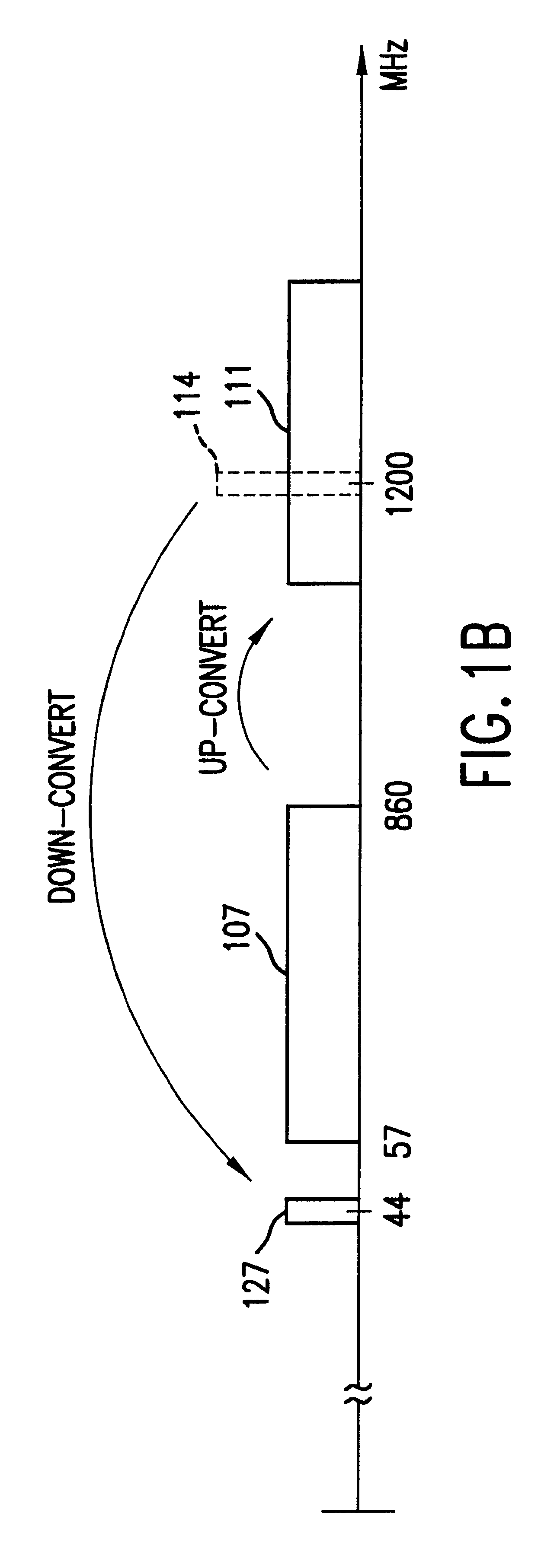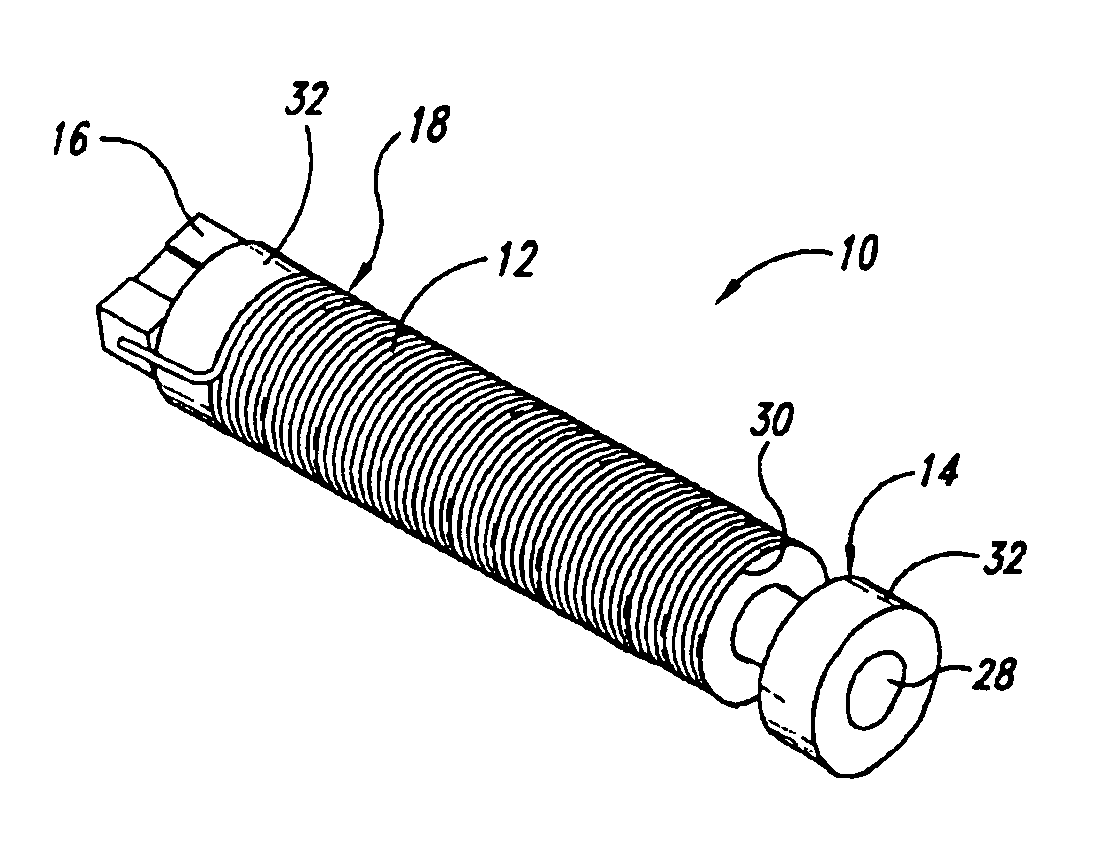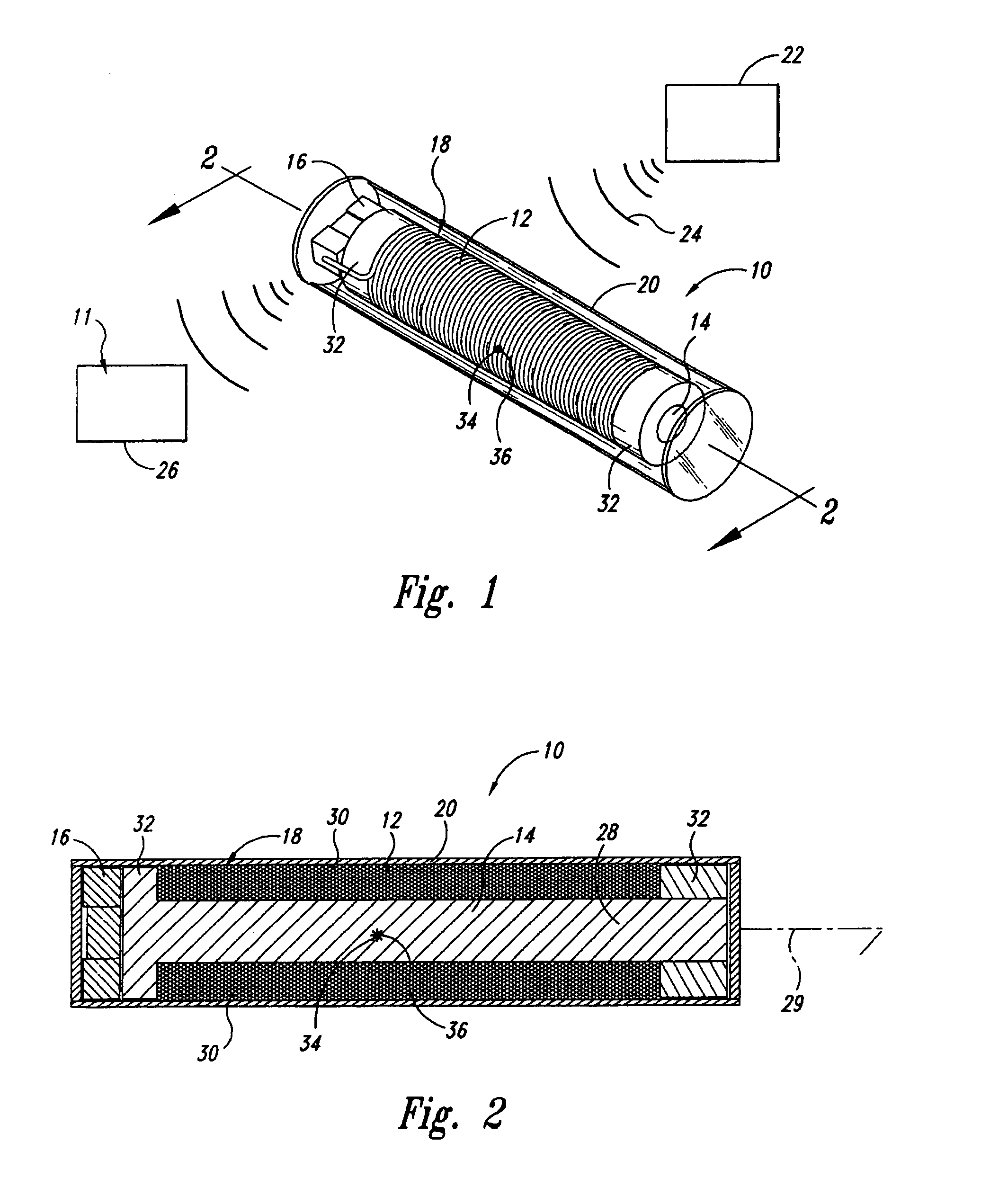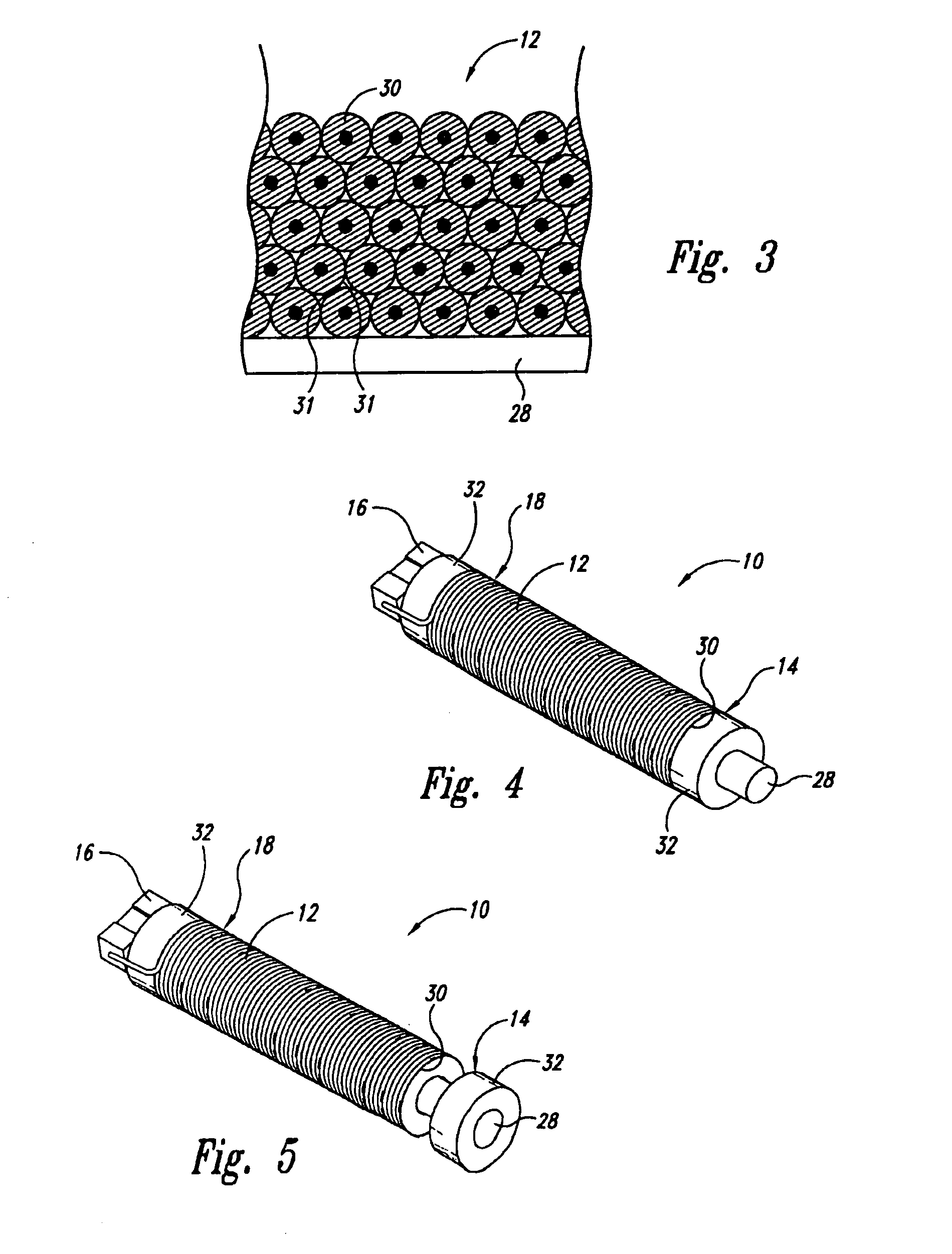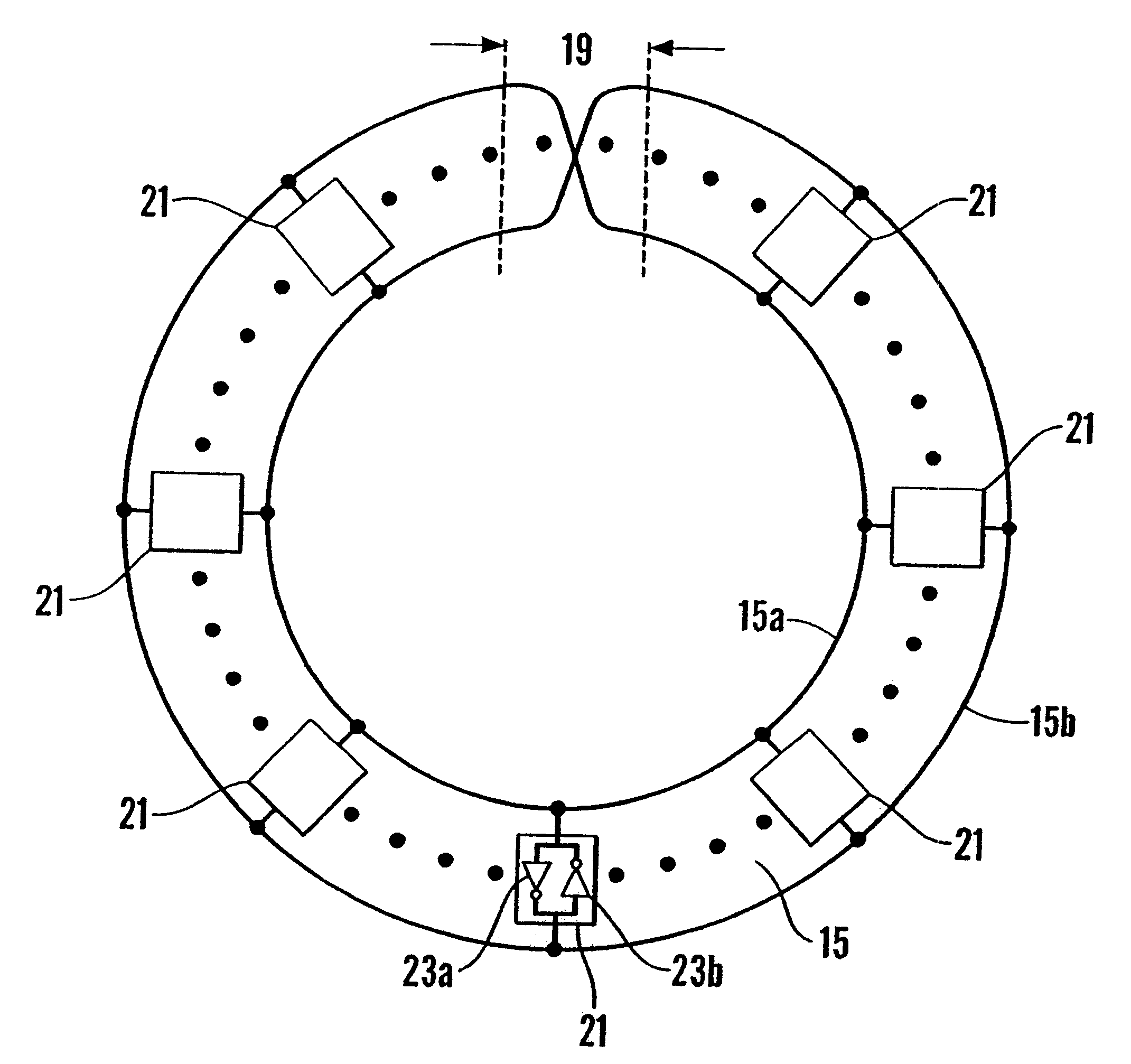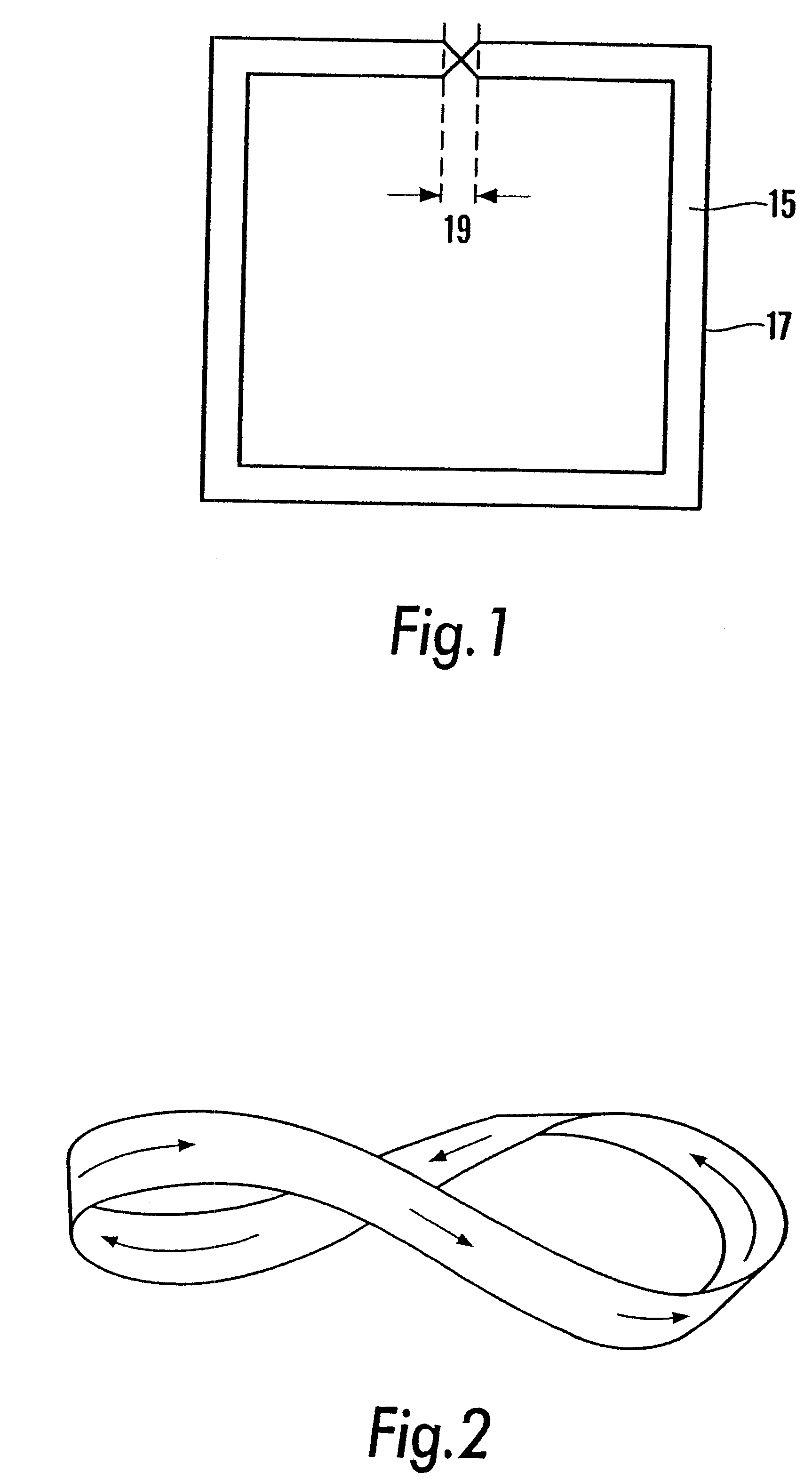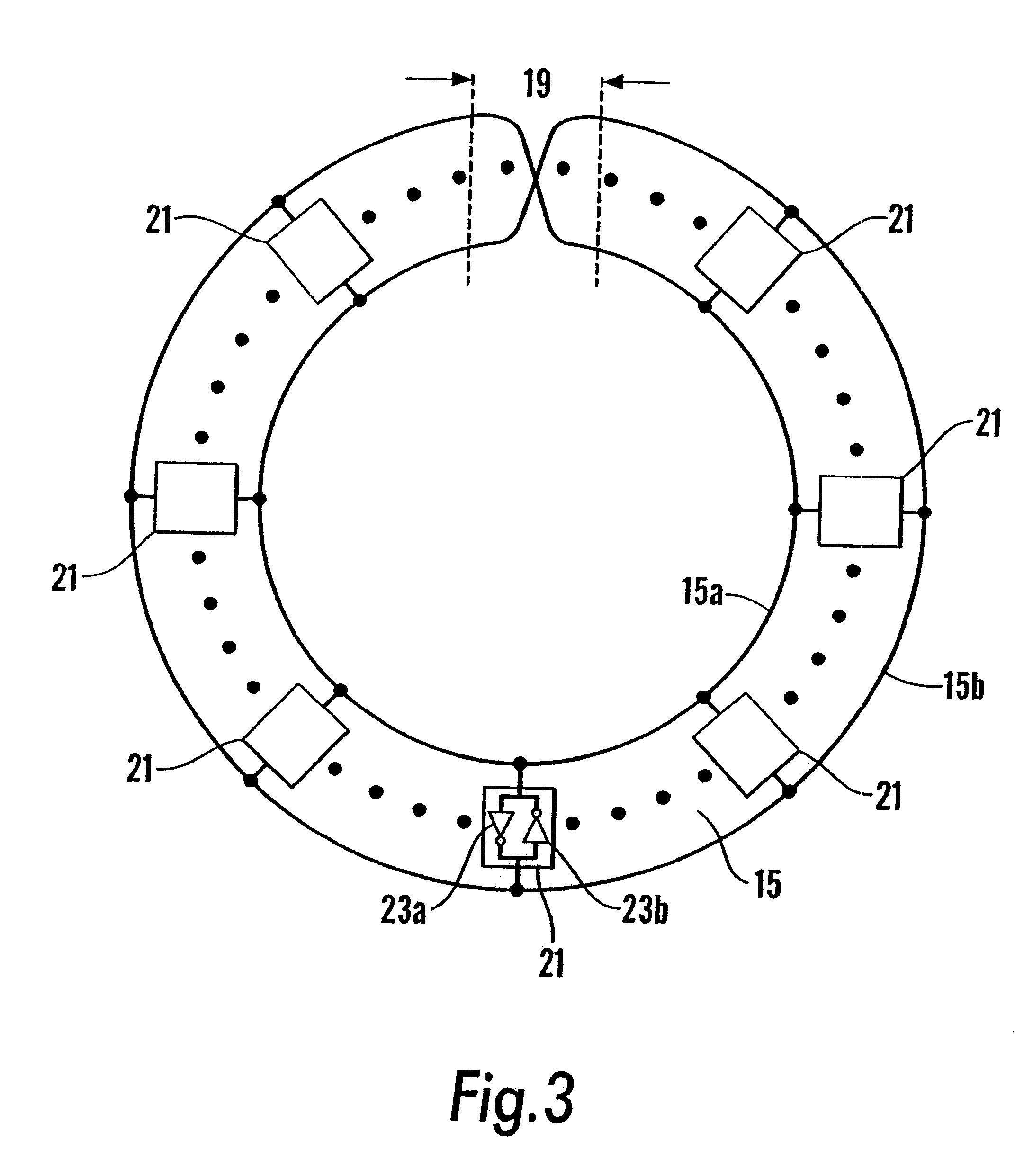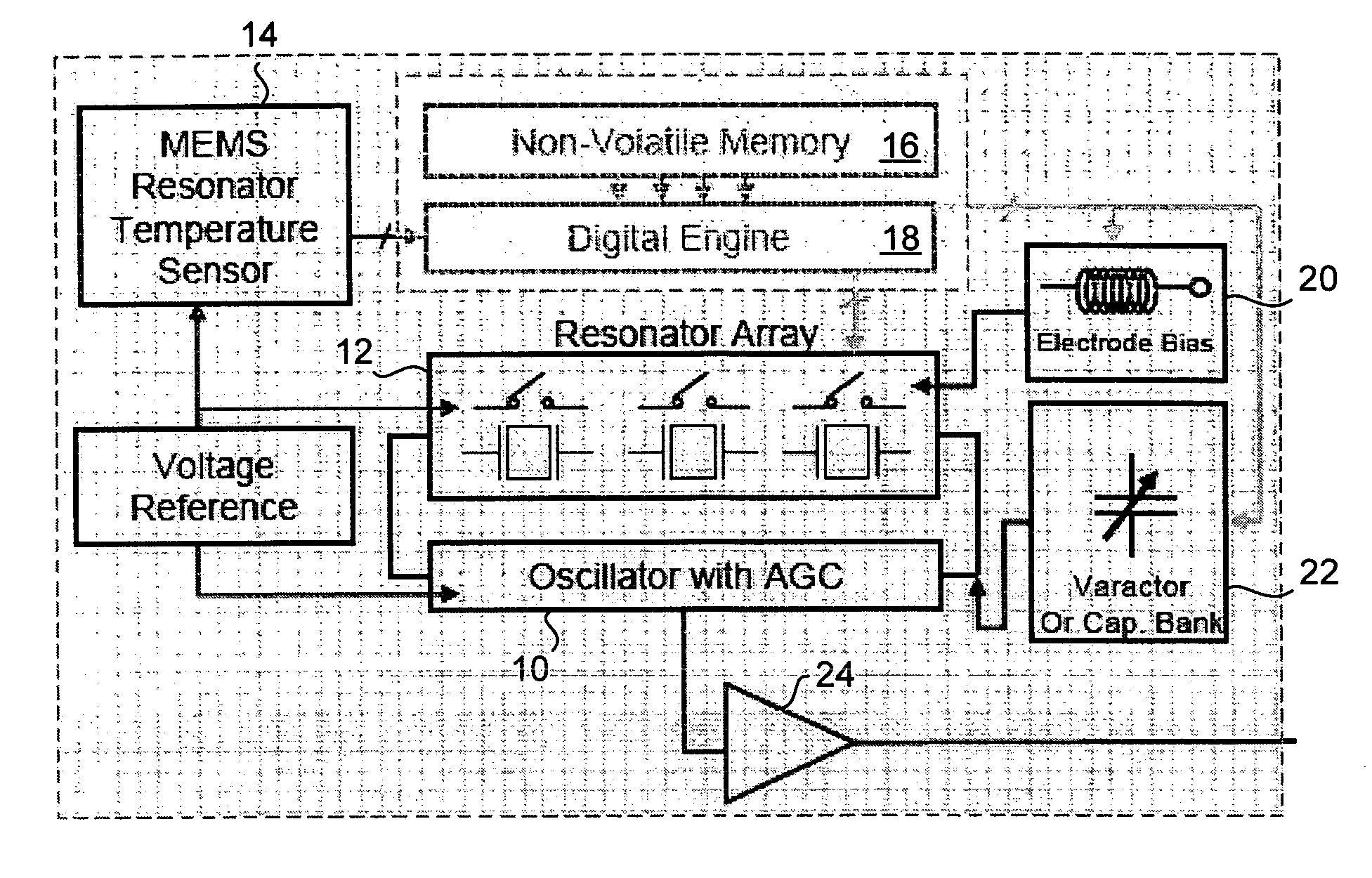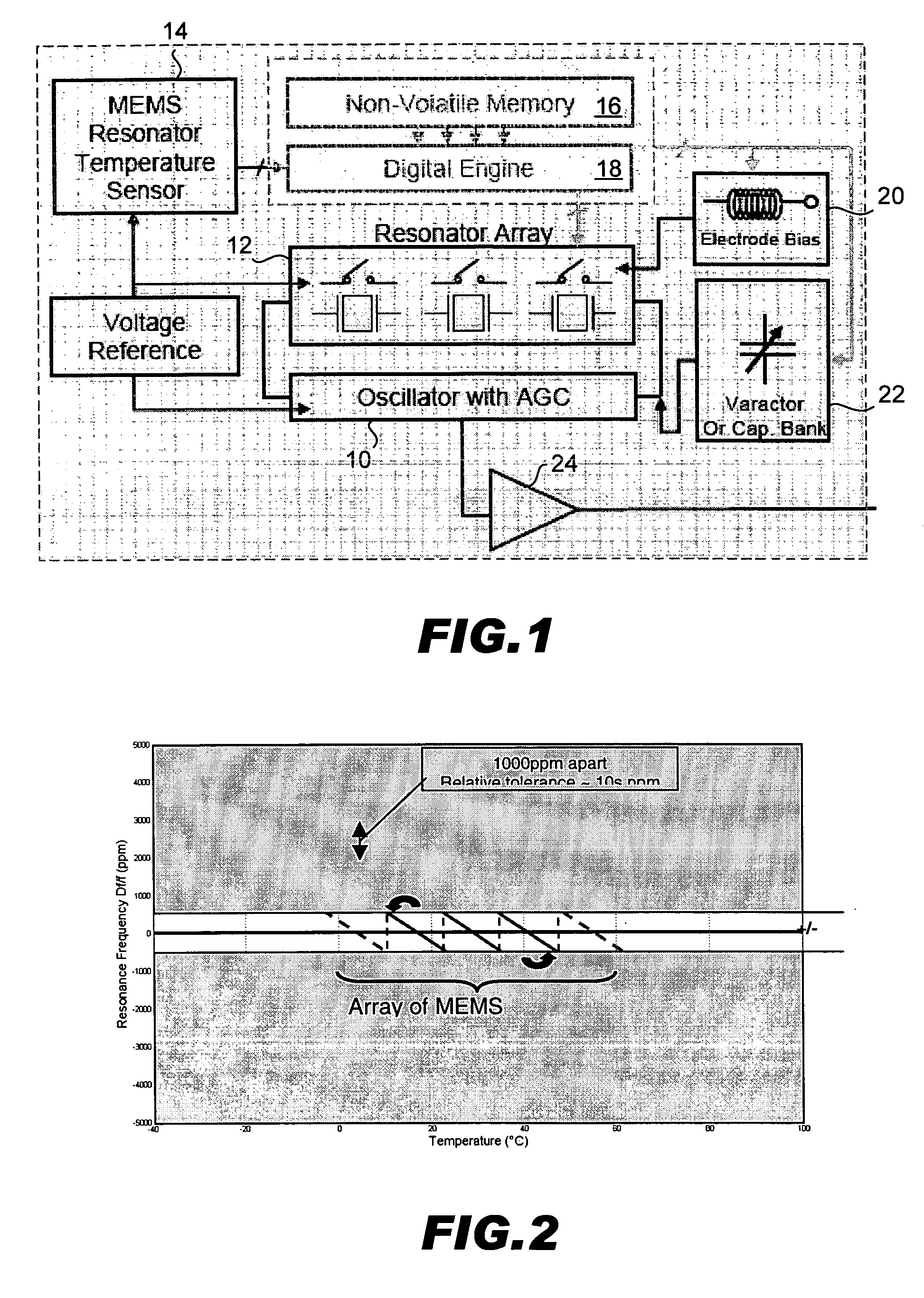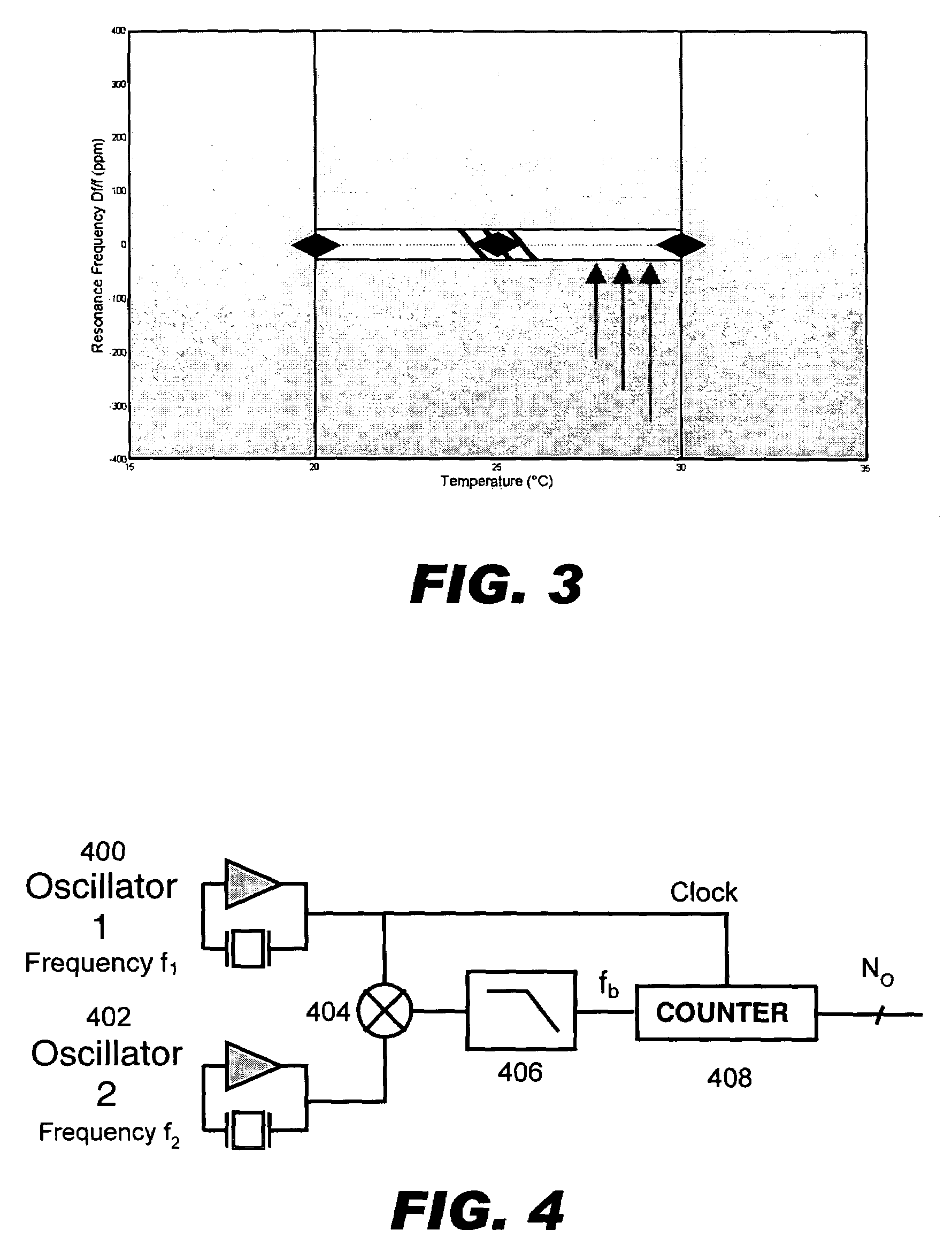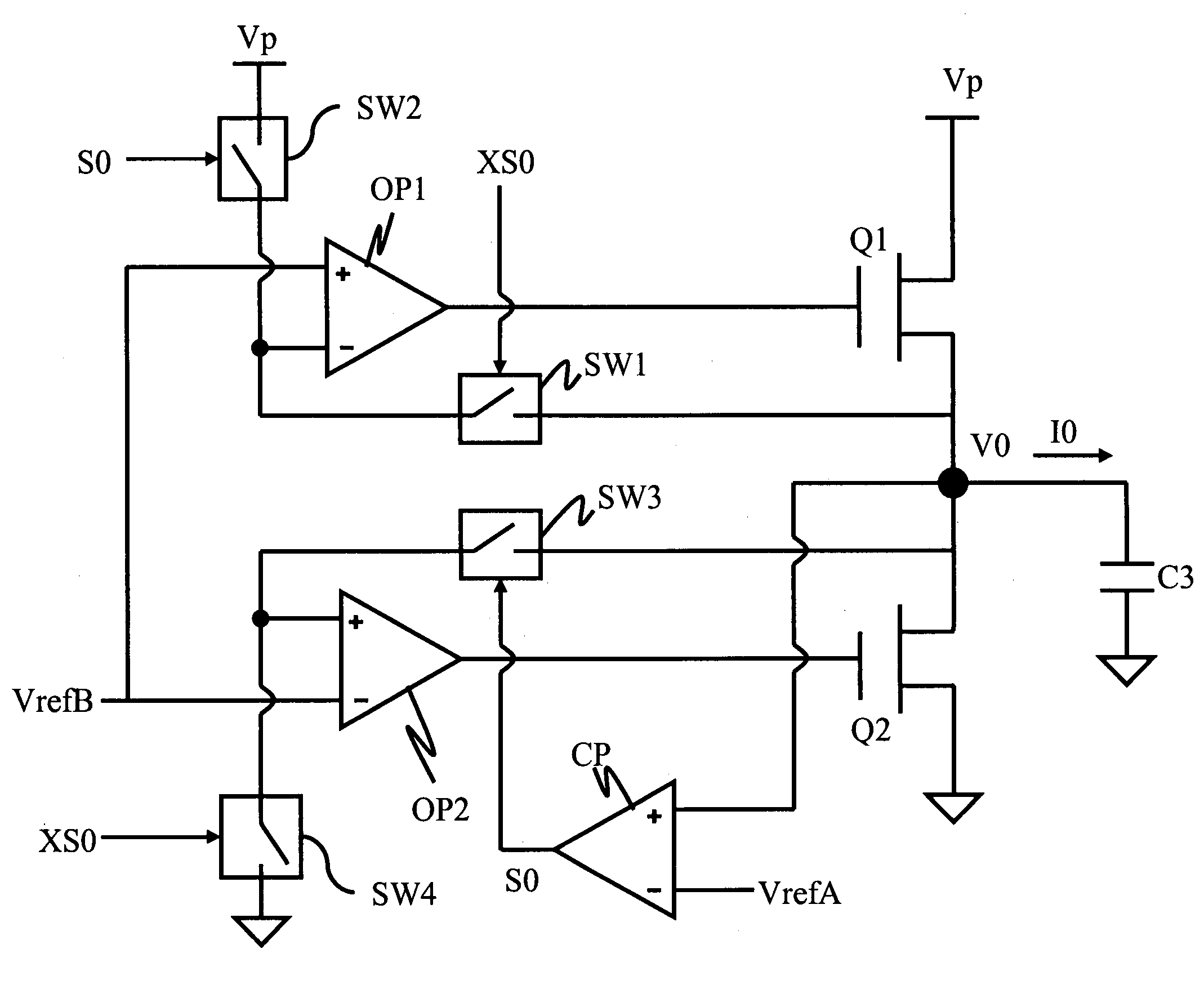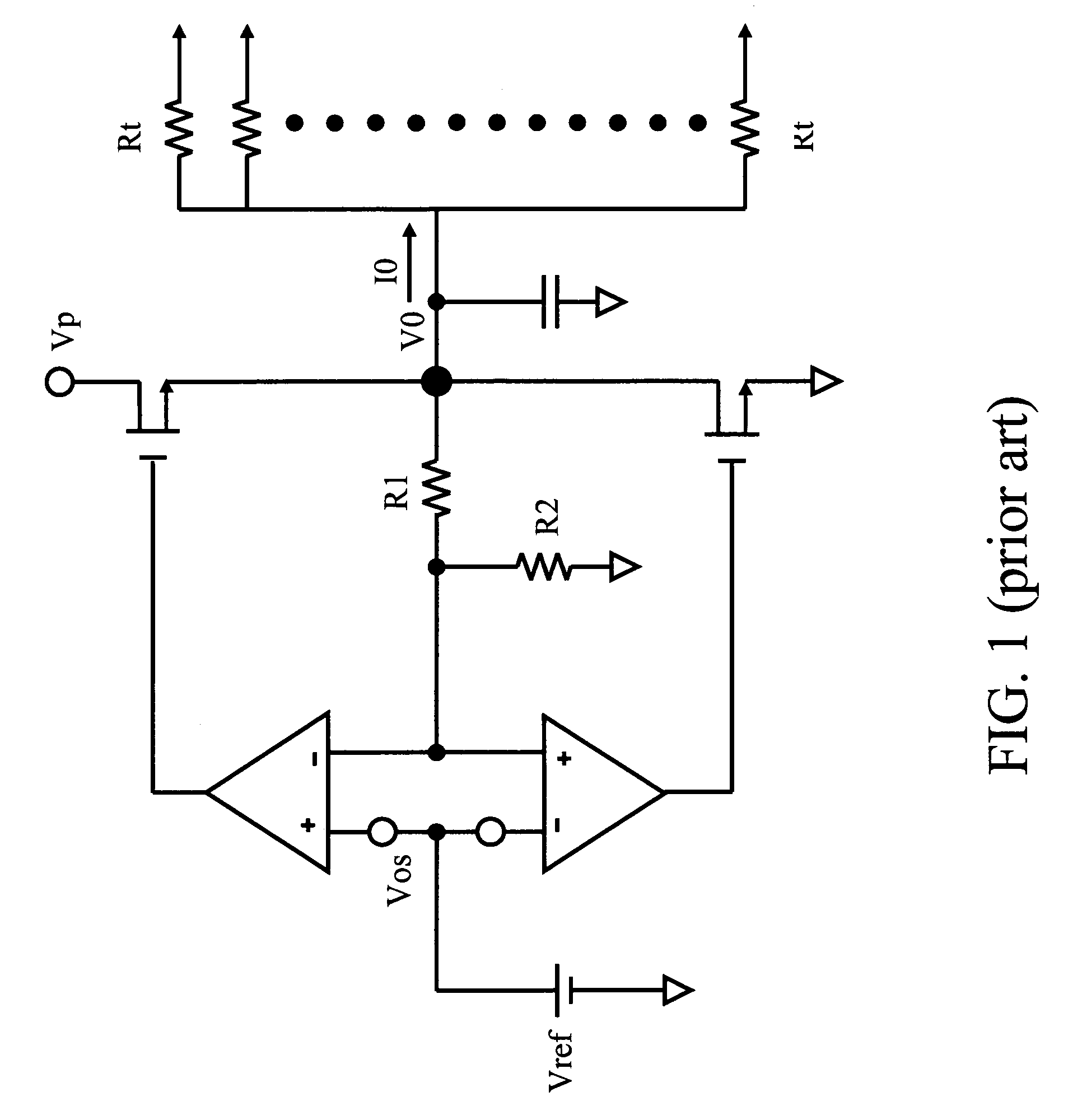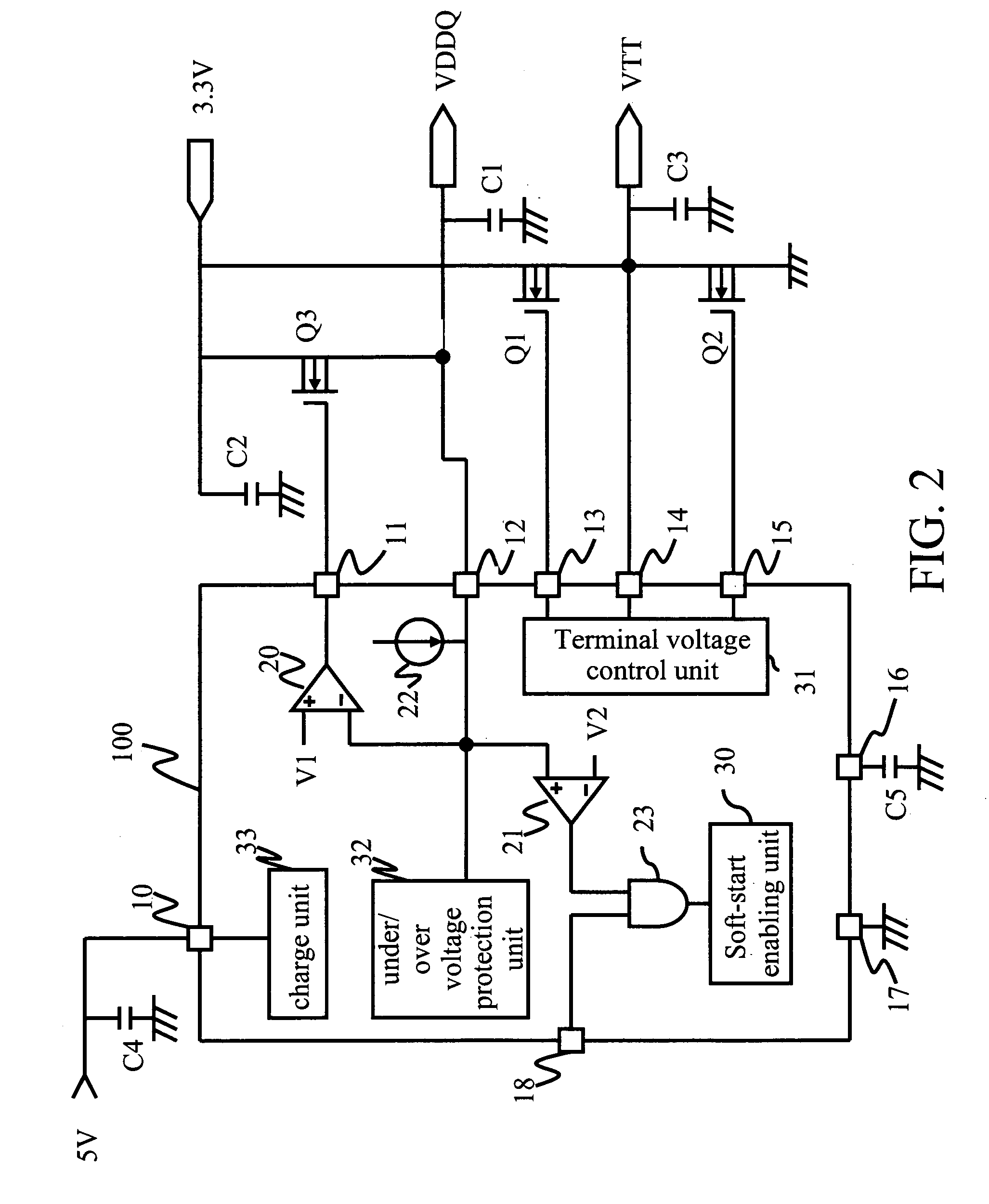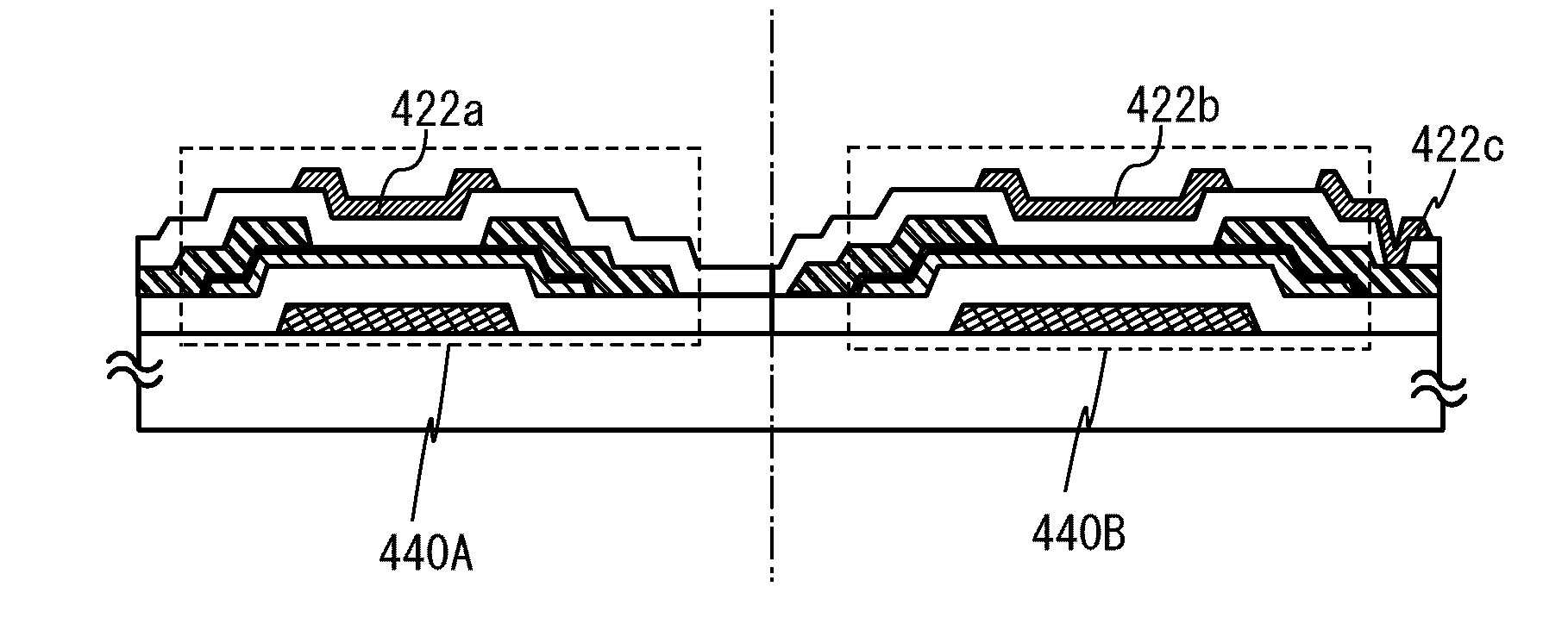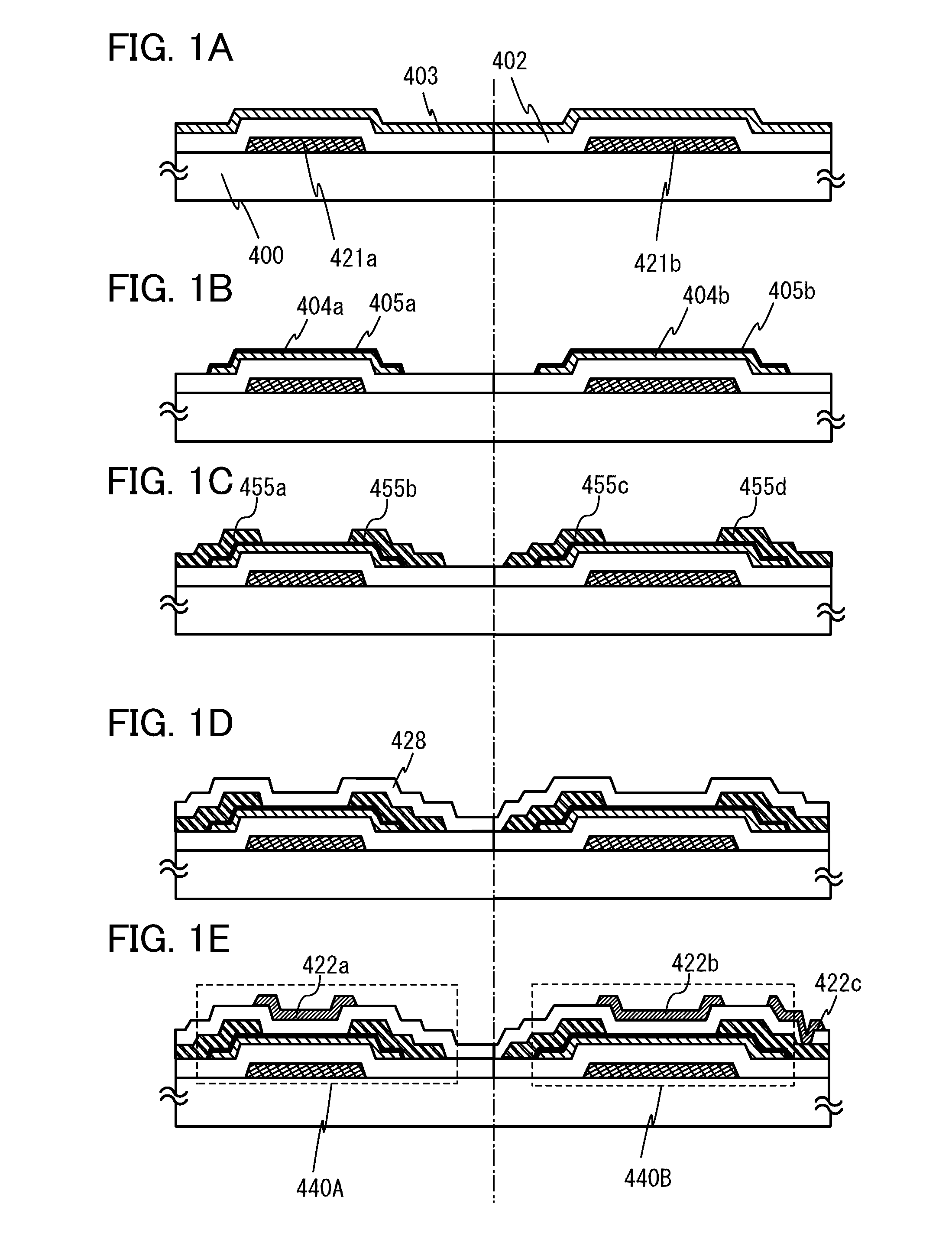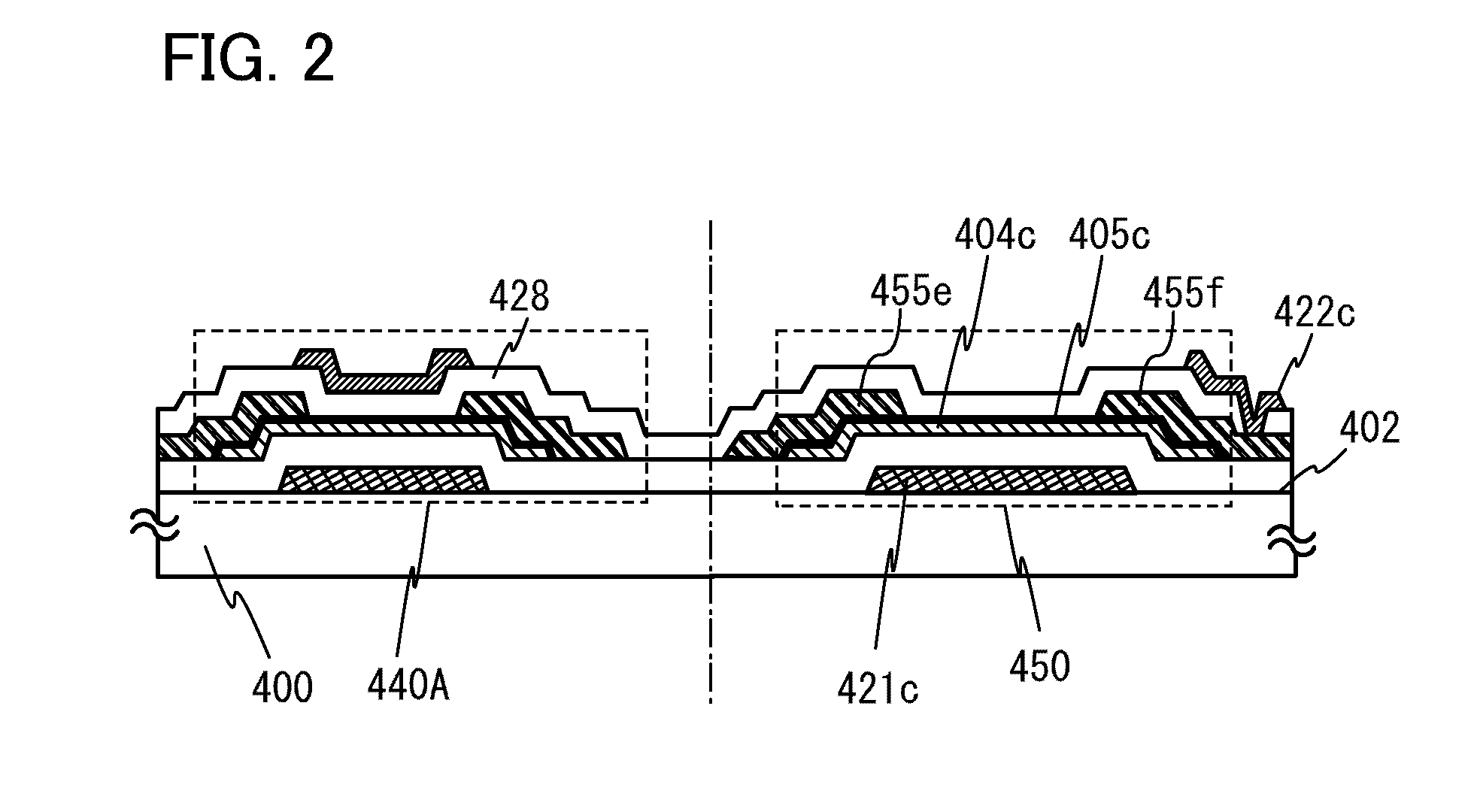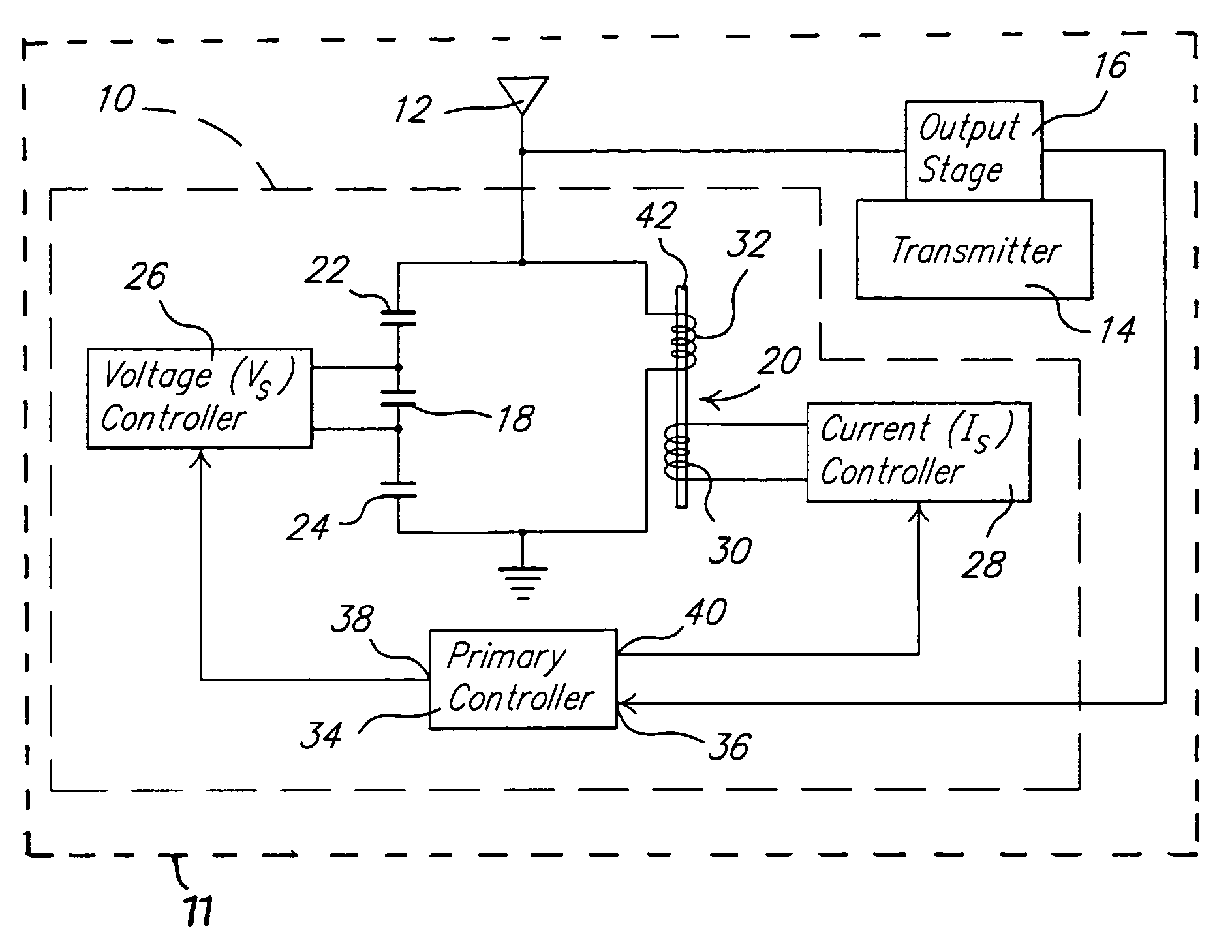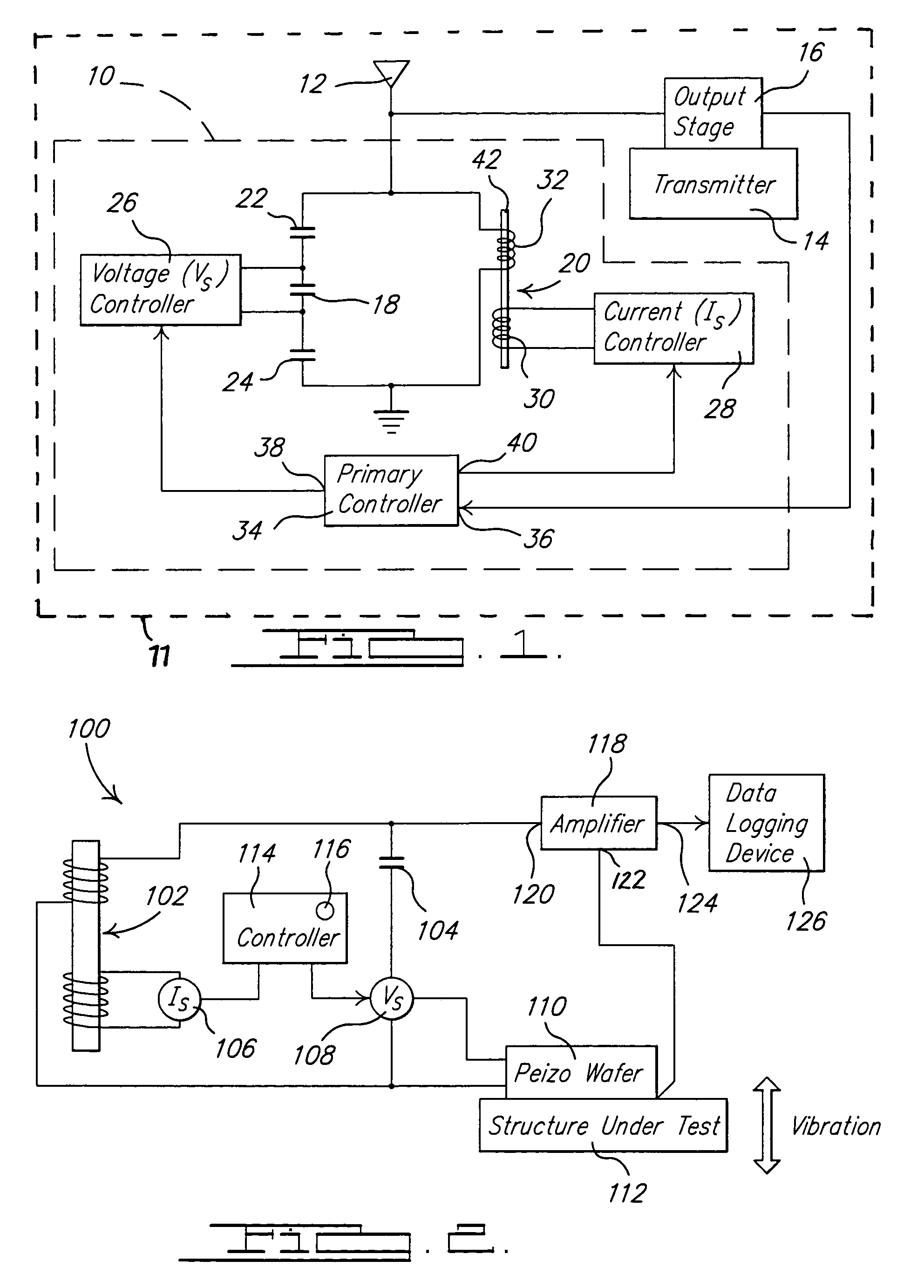Patents
Literature
15168results about "Oscillations generators" patented technology
Efficacy Topic
Property
Owner
Technical Advancement
Application Domain
Technology Topic
Technology Field Word
Patent Country/Region
Patent Type
Patent Status
Application Year
Inventor
System and method for dual-band antenna matching
A dual-band antenna matching system and a method for dual-band impedance matching are provided. The method comprises: accepting a frequency-dependent impedance from an antenna; and, selectively supplying a conjugate impedance match for the antenna at either a first and a second communication band, or a third and a fourth communication band. More specifically, the method comprises: tuning a first tuning circuit to a first frequency; and, simultaneously tuning a second tuning circuit to a second frequency. In response, a conjugate match is supplied to the antenna in the first communication band in response to the first frequency. Simultaneously, the antenna is matched in the second communication band in response to the second frequency. When the first tuning circuit is tuned to a third frequency, and the second tuning circuit is tuned to a fourth frequency, then conjugate matches are supplied for the third and fourth communication bands, responsive to the third and fourth frequencies, respectively.
Owner:KYOCERA CORP
True time delay phase array radar using rotary clocks and electronic delay lines
ActiveUS20120039366A1Forming accuratelyEasy to moveAntenna arraysPulse automatic controlTime delaysAnalog delay line
Local oscillator circuitry for an antenna array is disclosed. The circuitry includes an array of rotary traveling wave oscillators which are arranged in a pattern over an area and coupled so as to make them coherent. This provides for a set of phase synchronous local oscillators distributed over a large area. The array also includes a plurality of phase shifters each of which is connected to one of the rotary oscillators to provide a phase shifted local oscillator for the array. The phase shifter optionally includes a cycle counter that is configured to count cycles of the rotary oscillator to which it is connected and control circuitry that is then operative to provide a shifted rotary oscillator output based on the count from the cycle counter. A system and method for operating a true-time delay phased array antenna system. The system includes a plurality of antenna element circuits for driving or receiving an rf signal from the elements of the array. Each element circuit has a transmit and a receive path and a local multiphase oscillator, such as a rotary traveling wave oscillator. Each path has an analog delay line for providing a true-time delay for the antenna element. Preferably, the analog delay line is a charge coupled device whose control nodes are connected to phases of the local multiphase oscillator to implement a delay that is an integer number local multiphase oscillator periods. A fractional delay is also included in the path by using a sample and hold circuit connected to a particular phase of the oscillator. By delaying each antenna element by a true time delay, broadband operation of the array is possible.
Owner:ANALOG DEVICES INC
Method and device for transmission without crosstalk
ActiveUS7408426B2Simplifying the transmitting circuits and/or the receiving circuitsSimplification of the transmitting circuits and/or the receiving circuitsReliability increasing modificationsDc network circuit arrangementsElectrical conductorInterconnection
The invention relates to a method and a device for transmission without crosstalk in interconnections used for sending a plurality of signals, such as the interconnections made with flat multiconductor cables, or with the tracks of a printed circuit board, or inside an integrated circuit. An interconnection with four parallel transmission conductors plus a reference conductor has each of its ends connected to a termination circuit. The transmitting circuit receives at its input the signals of the four channels of the source and its output terminals are connected to the conductors of the interconnection. The receiving circuit(s) input terminals are connected to the conductors of the interconnection, and its four output channels are connected to the destination. The signals of the four channels of an active source are sent to the four channels of the destination, without noticeable crosstalk.
Owner:S AQUA SEMICONDUCTOR LLC
RF notch filter having multiple notch and variable notch frequency characteristics
InactiveUS6020783AReduce signalingImproved noise attenuationMultiple-port networksOscillations generatorsBandpass filteringFrequency spectrum
A filter network having the capability of establishing multiple, tunable notch frequencies. A notch filter path is established for each notch frequency and includes a bandpass filter and inverter. An input RF signal covering a wide frequency range is applied to all the notch filter paths. Each notch filter path produces an output spectrum that is equal in magnitude and 180.degree. out of phase with respect to an undesired frequency spectrum. A combiner circuit combines the outputs of each notch filter path in parallel with the RF input signal to produce an RF output signal with all desired spectra unchanged and all undesired spectra attenuated.
Owner:SIGNAL TECH CORP
Monolithic microwave integrated circuit (MMIC) waveguide resonators having a tunable ferroelectric layer
ActiveUS7570137B2Improve scalabilityEasy to integrateResonatorsOscillations generatorsElectromagnetic couplingResonant cavity
A ferroelectric loaded waveguide resonator capable of operation at microwave, millimeter-wave and higher frequencies and suitable for integration into a three-dimensional monolithic microwave integrated circuit (3D MMIC) is disclosed. The resonator includes a resonator cavity, which, in one form of the invention, is formed by two parallel metal layers and a metallized wall structure extending between the metal layers. The cavity is filled with dielectric material and includes a layer of ferroelectric material, which is used to control the resonant frequency by varying a voltage bias applied to the ferroelectric layer. The cavity includes a slot in one of the metal layers and a coupling strip formed adjacent to the slot to provide electromagnetic coupling to other components, such as a voltage controlled oscillator (VCO). The invention can also be applied to other multi-metal semiconductor or wafer level packaging technologies.
Owner:NORTHROP GRUMMAN SYST CORP
Voltage controlled oscillator, mmic, and high frequency wireless device
InactiveUS20100052799A1Low phase noise characteristicReduce noisePulse automatic controlOscillations generatorsPhase noiseHarmonic
A voltage controlled oscillator having low phase noise and including: a variable resonator including a varactor and a control voltage terminal; and an open-end stub connected in parallel to the variable resonator, the open-end stub having a length shorter than or equal to an odd multiple of one quarter of a wavelength of a harmonic signal plus one sixteenth of the wavelength of the harmonic signal, and longer than or equal to an odd multiple of one quarter of the wavelength of the harmonic signal minus one sixteenth of the wavelength of the harmonic signal. In this structure, a high Q value is realized for a fundamental wave frequency. Fluctuation in a control voltage due to a harmonic signal is controlled.
Owner:MITSUBISHI ELECTRIC CORP
Method and apparatus for automatic near field communication application selection in an electronic device
In a portable electronic device (100) having a plurality of near field communication applications stored within a plurality of execution environments, an application discovery manager (311) is configured to automatically select and launch one or more of the near field communication applications. A near field communication circuit (300) receives a near field communication request from an external near field communication device (700). The application discovery manager (311) identifies a near field communication technology, a protocol, and an application identifier and then references a registry table (313) to determine identification parameters corresponding with the identified information. The application discovery manager (311) then selects a near field communication application and launches it. The application discovery manager (311) further configures a routing switch (316) to direct data between the near field communication circuit controller (301) and the appropriate execution environment.
Owner:GOOGLE TECH HLDG LLC
Self dc-bias high frequency logic gate, high frequency NAND gate and high frequency nor gate
InactiveUS20060197557A1Electric power will not be wastedNot to wasteReliability increasing modificationsMultiple input and output pulse circuitsNOR gateNAND gate
A self DC-bias high frequency logic gate is disclosed. The logic gate comprises at least one input terminal and one output terminal for performing Boolean operation on the high frequency input signals. The logic gate is characterized in that each transistor is coupled to an impedance matching network. The impedance matching network comprises a first terminal and a second terminal. Wherein, the first terminal is coupled to a gate of the transistor, and the second terminal is coupled to a drain of the transistor for providing an operation voltage to the transistor. When a gate of an N-type transistor and a gate of a P-type transistor are coupled with each other, and a drain of the N-type transistor and a drain of the P-type transistor are also coupled with each other, a common impedance matching network is shared with both the N-type transistor and the P-type transistor.
Owner:SUNPLUS TECH CO LTD
Packaged electronic components for producing a sub-harmonic frequency signal at millimetric frequencies
The invention relates to millimetric packaged electronic components for applications at high frequencies greater than 45 GHz. According to the invention, to facilitate the design of a system including MMIC chips working at these frequencies, it is proposed to use packages containing one or more chips, these packages making it possible to work at these frequencies and including two types of port: a port with transition by contactless electromagnetic coupling providing a connection with an antenna at the high working frequency F via a waveguide; and a port with microstrip or coaxial line type transition enabling a connection at a subharmonic frequency F / N (preferably N=6 or 4 or, if necessary, 3) of the working frequency.
Owner:UNITED MONOLITHIC SEMICON
On-chip power-combining for high-power schottky diode based frequency multipliers
ActiveUS9143084B2Split evenlySemiconductor/solid-state device detailsSolid-state devicesHarmonicFrequency multiplier
A novel MMIC on-chip power-combined frequency multiplier device and a method of fabricating the same, comprising two or more multiplying structures integrated on a single chip, wherein each of the integrated multiplying structures are electrically identical and each of the multiplying structures include one input antenna (E-probe) for receiving an input signal in the millimeter-wave, submillimeter-wave or terahertz frequency range inputted on the chip, a stripline based input matching network electrically connecting the input antennas to two or more Schottky diodes in a balanced configuration, two or more Schottky diodes that are used as nonlinear semiconductor devices to generate harmonics out of the input signal and produce the multiplied output signal, stripline based output matching networks for transmitting the output signal from the Schottky diodes to an output antenna, and an output antenna (E-probe) for transmitting the output signal off the chip into the output waveguide transmission line.
Owner:CALIFORNIA INST OF TECH
Noise reduction within an electronic device using automatic frequency modulation
ActiveUS20080157893A1High frequencyLimitation to input signalPulse automatic controlFrequency analysisEngineeringNoise reduction
Disclosed is a system and method for providing an oscillating signal of relatively precise frequency without using a signal provided by a crystal as a reference. Disclosed is a feedback oscillator circuit configured to output an oscillating signal having a frequency defined by a reference signal. The oscillating signal can be sent to one or more circuits including at least one frequency sensitive element. The frequency sensitive element produces an output signal which depends on the frequency of the oscillating signal. A controller controls the reference signal in order to cause an attribute of the output signal to have a value within a desired range.
Owner:APPLE INC
Electronic circuit including at least one first and one second differential pair with the transistors sharing one and the same well
ActiveUS20060158270A1Reduce capacitanceReduce surfaceSolid-state devicesAmplifier with semiconductor-devices/discharge-tubesEngineeringTransistor
The disclosure relates to an electronic circuit including at least one first and one second differential pair each including a plurality of transistors. All the transistors of said first and second differential pair are included in a single well.
Owner:ATMEL CORP
Synchronization of nanomechanical oscillators
ActiveUS20140176203A1Good for observationEasy to controlAnalysing solids using sonic/ultrasonic/infrasonic wavesPulse automatic controlPhase noiseOscillator network
Synchronization of oscillators based on anharmonic nanoelectromechanical resonators. Experimental implimentation allows for unprecedented observation and control of parameters governing the dynamics of synchronization. Close quantitative agreement is found between experimental data and theory describing reactively coupled Duffing resonators with fully saturated feedback gain. In the synchonized state, a significant reduction in the phase noise of the oscillators is demonstrated, which is key for applications such as sensors and clocks. Oscillator networks constructed from nanomechanical resonators form an important laboratory to commercialize and study synchronization—given their high-quality factors, small footprint, and ease of co-integration with modern electronic signal processing technologies. Networks can be made including one-, two-, and three-dimensional networks. Triangular and square lattices can be made.
Owner:CALIFORNIA INST OF TECH
System and method for impedance matching an antenna to sub-bands in a communication band
InactiveUS7176845B2Improve efficiencyReduce noiseMultiple-port networksAntenna supports/mountingsAntenna impedanceMethod selection
A sub-band antenna matching method and an antenna matching system for selectively matching a communication bandwidth segment impedance have been provided. The method comprises: accepting a frequency-dependent impedance from an antenna; and, selectively supplying a conjugate impedance match for the antenna at a sub-band of a first communication band. In some aspects, the method selectively supplies a conjugate impedance match for the antenna at a sub-band of a second communication band. More specifically, the method comprises: tuning a first tuning circuit to a first frequency; simultaneously tuning a second tuning circuit to a second frequency to match the antenna at a low end of the first communication band. Likewise, the first tuning circuit is tuned to a third frequency and the second tuning circuit is tuned to a fourth frequency to match the antenna at a high end of the first communication band in response to the third and fourth frequencies.
Owner:KYOCERA CORP
Temperature compensation type oscillator
An oscillator includes a first crystal resonator, a second crystal resonator, a first amplifier circuit for oscillation, a second amplifier circuit for oscillation, a mixer circuit, a frequency selection circuit, and a first frequency conversion circuit. Assuming that resonance frequencies of the first and the second crystal resonators at a reference temperature are respectively F1 and F2, and temperature coefficients expressed as a rate of change corresponding to temperatures of the resonance frequencies of the first and the second crystal resonators are respectively A1 and A2, the relationship of F2 / F1≠|A1 / A2| is satisfied. A signal with a temperature compensated frequency is obtained from the frequency selection circuit.
Owner:NIHON DEMPA KOGYO CO LTD
High-frequency oscillation element, magnetic information recording head, and magnetic storage device
ActiveUS20050023938A1Increase temperatureIncrease speedPiezoelectric/electrostriction/magnetostriction machinesSolid-state devicesMagnetic storageResonance
A high-frequency oscillation element has a ferromagnetic material which exhibits thermal fluctuation of magnetization and generates spin fluctuations in conduction electrons, a nonmagnetic conductive material which is laminated on the first magnetic material and transfers the conduction electrons, a magnetic material which is laminated on the nonmagnetic conductive material, generates magnetic resonance upon injection of the conduction electrons, and imparts magnetic dipole interaction to magnetization of a neighboring magnetic area by means of magnetic vibration stemming from the magnetic resonance, a first electrode electrically coupled with the first magnetic material, and a second electrode electrically coupled with the second magnetic material.
Owner:KK TOSHIBA
Enhanced wireless packet data communication system, method, and apparatus applicable to both wide area networks and local area networks
InactiveUS20070071114A1Conserve battery lifeReduce transmitter costPulse automatic controlDc level restoring means or bias distort correctionWide areaArea coverage
A cellular wireless packet data communication system containing transmit-only endpoint devices which transmit to receive-only base stations. The system is configured to allow for large area coverage (e.g., a metropolitan area) with far fewer number base stations than are required with conventional two-way cellular systems. The base station coverage areas are configured to overlap, allowing for reception of packets at multiple base stations. A data concentrator resolves redundantly received messages. The network is configurable as a WAN, a LAN, or a combination of the two. Novel modulation techniques (e.g., a 16QAM submodulation together with a 7FSK modulation) are used such that low cost components can be used in the transmitters and receivers while achieving outstanding probability of success performance. The endpoint devices are battery operated and accordingly, are designed for low power consumption and multi-year battery life. The system is used in a variety of applications including remote monitoring and mobile communications.
Owner:SENSUS SPECTRUM LLC
Arbitrary waveform generator having programmably configurable architecture
InactiveUS6356224B1Electric signal transmission systemsOscillations generatorsDigital analog converterMultiplexer
An arbitrary waveform generator (AWG) for producing an analog output current signal includes a random access memory (RAM), a programmable logic device (PLD), a programmable pattern generator, several digital-to analog converters (DACS) and a current multiplexer. The RAM store data sequences representing the analog waveform to be generated. The pattern generator read addresses the RAM causing it to sequentially read out its stored data sequence to the PLD. The PLD routes selected fields of each data sequence word to one or more of the DACs in response to timing signals provided by the pattern generator. Each DAC produces an output current of magnitude determined by its input waveform and range data. The pattern generator also signals the analog multiplexer to sum currents produced by one or more selected DACs to produce the AWG output waveform. The nature of the AWG output waveform is flexibly determined by the nature of the data sequence and the frequency at which it is read out of the RAM, the manner in which the PLD routes the data sequence to the DACs, the value of the range data supplied to each DAC, and the output pattern generated by the pattern generator. The flexible AWG architecture permits the AWG to be appropriately configured for various combinations of output waveform frequency, bandwidth and resolution requirements.
Owner:CREDENCE SYSTEMS
Reference oscillator frequency stabilization
ActiveUS7248128B2Improve propertiesFrequency stabilityTelevision system detailsPulse automatic controlFrequency stabilizationEngineering
Owner:NOKIA TECHNOLOGLES OY
Passive harmonic switch mixer
A passive harmonic switch mixer is shown that is immune to self mixing of the local oscillator greatly reducing leakage noise, pulling noise, and flicker noise when used in a direct conversion receiver or direct conversion transmitter circuit. The passive harmonic switch mixermixes an input signal received on an input port with an in-phase oscillator signal and a quadrature-phase oscillator signal and outputs an output signal on an output port. Because the quadrature-phase oscillator signal is the in-phase oscillator signal phase shifted by 90 °, the passive harmonic switch mixer operates with a local oscillator running at half the frequency of the carrier frequency of an RF signal. Additionally, because the passive harmonic switch mixer has no active components, the DC current passing through each switch device is reduced and the associated flicker noise of the mixer is also greatly reduced.
Owner:REALTEK SEMICON CORP
Chip-scale atomic clock (CSAC) and method for making same
A clock including: a portable, at least partially evacuated housing; a cell being positioned within the housing and including an internal cavity having interior dimensions each less than about 1 millimeter, an intra-cavity pressure of at least about 760 Torr, and containing a metal atomic vapor; an electrical to optical energy converter being positioned within the housing to emit light through the metal atomic vapor; an optical energy intensity detector being positioned within the housing to receive the light emitted by the converter through the metal atomic vapor; at least one conductive winding around the cavity to stabilize the magnetic field experienced in the cavity dependently upon the detector; and, an output to provide a signal from the housing dependently upon the detector detecting the light emitted by the converter through the metal atomic vapor.
Owner:SARNOFF CORP
Transmit/receive switch device
InactiveUS7468638B1High impedance pathHigh impedanceOscillations generatorsTransmissionVoltage referenceTransmitter
An integrated transmit / receive (T / R) switch device comprises a substrate, an antenna port to couple with an antenna, a transmitter port to couple with a transmitter, and a receiver port to couple with a receiver. A receive path is provided between the antenna port and the receiver port, and a transmit path is provided between the antenna port and the transmitter port. The transmit path includes a first transistor on the substrate, and the first transistor is coupled in series between the antenna port and the transmitter port. A body node of the first transistor is unconnected, and the substrate is configured to provide a high impedance path from the first transistor to a reference voltage. A second transistor on the substrate is coupled in series between the receiver port and the reference voltage.
Owner:MARVELL INT LTD
Full-duplex antenna system and method
A system and method is provided for full-duplex antenna impedance matching. The method comprises: effectively resonating a first antenna at a frequency selectable first channel in a first frequency band; generating a first antenna impedance at the first channel frequency; effectively resonating a second antenna at a frequency selectable second channel in the first frequency band; generating a second antenna impedance at the second channel frequency; supplying a first conjugate impedance match at the first channel frequency; and, supplying a second conjugate impedance match at the second channel frequency. For example, the first antenna may be used for transmission, while the second antenna is used for received communications. The antennas effectively resonant in response to: supplying frequency selectable conjugate impedance matches to the antennas; generating frequency selectable antenna impedances; and / or selecting the frequency of antenna resonance.
Owner:KYOCERA CORP
Apparatus and method for phase lock loop gain control using unit current sources
InactiveUS6583675B2Pulse automatic controlDiscontinuous tuning for band selectionFixed capacitorReference current
A gain compensator compensates for the gain variation of a varactor-tuned voltage tuned oscillator (VCO) in a phase lock loop (PLL). The VCO includes a parallel LC circuit having multiple fixed capacitors that can be switched-in or switched-out of the LC circuit according to a capacitor control signal to perform band-select tuning of the VCO. The gain compensator compensates for the variable VCO gain by generating a charge pump reference current that is based on the same capacitor control signal that controls the fixed capacitors in the LC circuit. The gain compensator generates the charge pump reference current by replicating a reference scale current using unit current sources. The number of times the reference scale current is replicated is based on the fixed capacitance that is switched-in to the LC circuit and therefore the frequency band of the PLL. The reference scale current is generated based on a PLL control that specifics certain PLL characteristics such as reference frequency, loop bandwidth, and loop damping. Therefore, the reference pump current can be efficiently optimized for changing PLL operating conditions, in addition to compensating for variable VCO gain.
Owner:AVAGO TECH INT SALES PTE LTD
Miniature resonating marker assembly
InactiveUS7135978B2Loop antennas with ferromagnetic corePulse automatic controlEngineeringSignal element
A miniature resonating marker assembly that includes, in one embodiment, a ferromagnetic core, a wire coil disposed around the core, and a capacitor connected to the wire coil adjacent to the magnetic core. The core, coil, and capacitor form a signal element that, when energized, generates a magnetic field at a selected resonant frequency. The magnetic field has a magnetic center point positioned along at least one axis of the signal element. An inert encapsulation member encapsulates the signal element therein and defines a geometric shape of the resonating marker assembly. The geometric shape has a geometric center point substantially coincident with the magnetic center point along at least a first axis of the signal element. The shape and configuration of the assembly also provides for a miniature signal element specifically tuned to resonate at a selected frequency with a high quality factor.
Owner:VARIAN MEDICAL SYSTEMS
Electronic circuitry
InactiveUS6556089B2Short fallShort riseDelay lines pulse generationPulse automatic controlCMOSBipolar signal
Timing signal generation and distribution are combined in operation of a signal path exhibiting endless electromagnetic continuity affording signal phase inversion and having associated regenerative active means. Two-or more-phases of substantially square-wave bipolar signals arise directly in travelling wave transmission-line embodiments compatible with semiconductor fabrication including CMOS. Coordination by attainable frequency synchronism with phase coherence for several such oscillating signal paths has intra-IC inter-IC and printed circuit board impact.
Owner:ANALOG DEVICES INC
Temperature compensated oscillator including MEMS resonator for frequency control
ActiveUS7211926B2Small deviceLow costPiezoelectric/electrostriction/magnetostriction machinesTemperatue controlQuartz resonatorSignal function
Disclosed is an oscillator that relies on redundancy of similar resonators integrated on chip in order to fulfill the requirement of one single quartz resonator. The immediate benefit of that approach compared to quartz technology is the monolithic integration of the reference signal function, implying smaller devices as well as cost and power savings.
Owner:RGT UNIV OF CALIFORNIA
Dual loop voltage regulation circuit of power supply chip
InactiveUS7193453B2Increase jitterShorten the timeTransistorElectronic switchingAudio power amplifierVoltage regulation
A dual loop voltage regulation circuit of power supply chip is provided, comprising a capacitor for providing a voltage signal, a comparator for comparing a first reference voltage signal and the voltage signal to output forward or backward trigger signal, a first switch triggered by a forward trigger signal, a second switch triggered by a backward trigger signal, a first operational amplifier generating a first drive signal while the first and second switches are on, a first transistor switch triggered to be on by a first drive signal to provide a current source loop, a third switch triggered by a forward trigger signal, a fourth switch triggered by a backward trigger signal, a second operational amplifier generating a second drive signal while the third and fourth switches are on, and a second transistor switch triggered to be on by a second drive signal to provide a current sink loop.
Owner:LEADTREND TECH
Semiconductor device and manufacturing method thereof
An oxide semiconductor layer which is intrinsic or substantially intrinsic and includes a crystalline region in a surface portion of the oxide semiconductor layer is used for the transistors. An intrinsic or substantially intrinsic semiconductor from which an impurity which is to be an electron donor (donor) is removed from an oxide semiconductor and which has a larger energy gap than a silicon semiconductor is used. Electrical characteristics of the transistors can be controlled by controlling the potential of a pair of conductive films which are provided on opposite sides from each other with respect to the oxide semiconductor layer, each with an insulating film arranged therebetween, so that the position of a channel formed in the oxide semiconductor layer is determined.
Owner:SEMICON ENERGY LAB CO LTD
Electrically tuned resonance circuit using piezo and magnetostrictive materials
An impedance tuning system, especially for a cellular telephone system. The system can be used to match the impedance of an antenna element with that of an output stage of a transmitter driving the antenna element. The system includes a piezo capacitor in parallel with the magnetostrictive inductor to form an LC circuit. A voltage controller applies a voltage bias signal to the piezo capacitor and a current controller applies a current bias signal to the inductor. A primary controller monitors the frequency of the output signal from the transmitter and controls the voltage and current controllers as needed to alter the impedance of the system as needed to match the impedance of the antenna element with that of the output stage of the transmitter. In an alternative form an ultrasonic sensor is provided.
Owner:THE BOEING CO
Popular searches
Features
- R&D
- Intellectual Property
- Life Sciences
- Materials
- Tech Scout
Why Patsnap Eureka
- Unparalleled Data Quality
- Higher Quality Content
- 60% Fewer Hallucinations
Social media
Patsnap Eureka Blog
Learn More Browse by: Latest US Patents, China's latest patents, Technical Efficacy Thesaurus, Application Domain, Technology Topic, Popular Technical Reports.
© 2025 PatSnap. All rights reserved.Legal|Privacy policy|Modern Slavery Act Transparency Statement|Sitemap|About US| Contact US: help@patsnap.com
